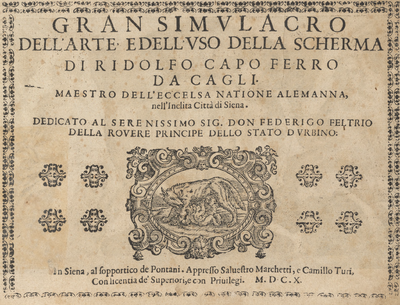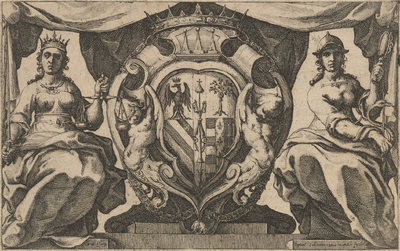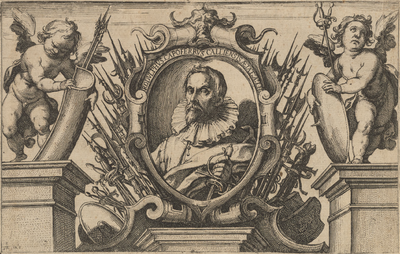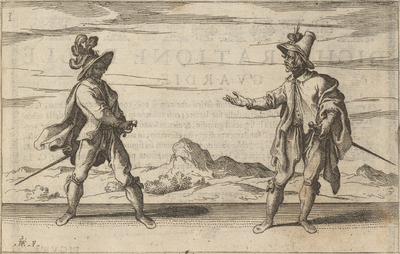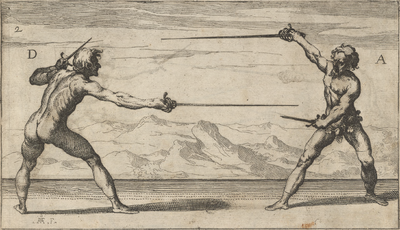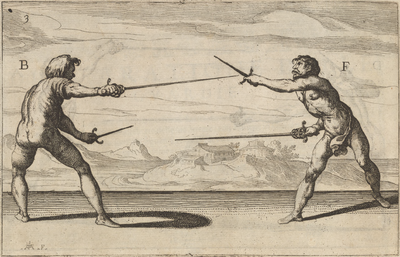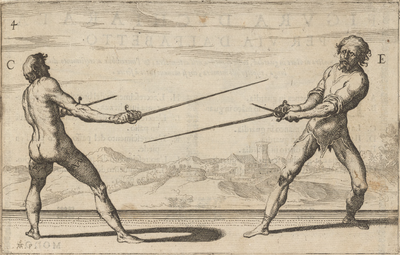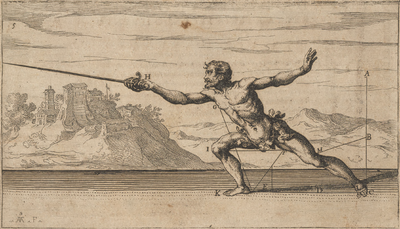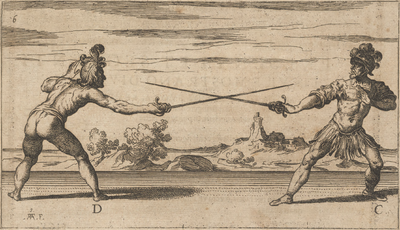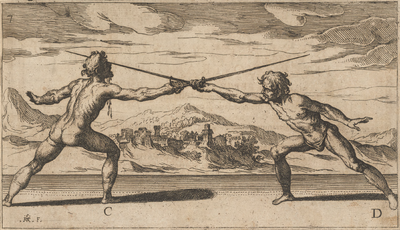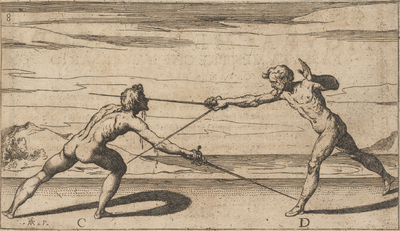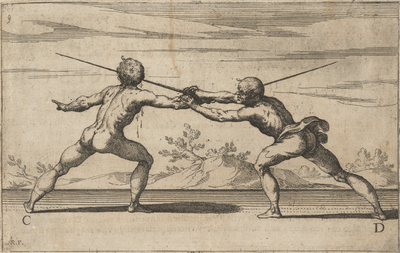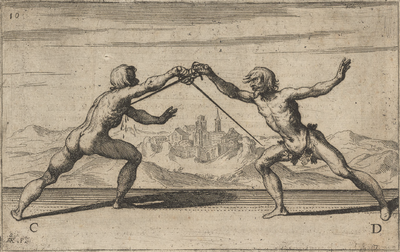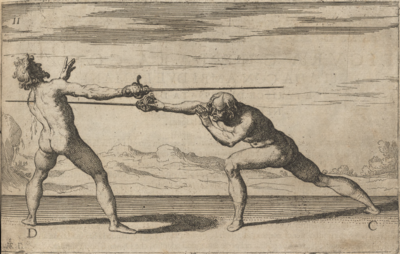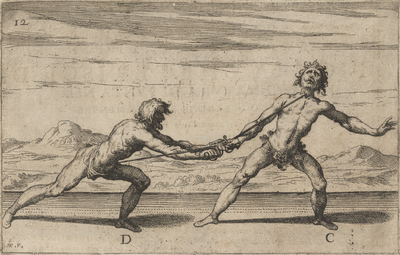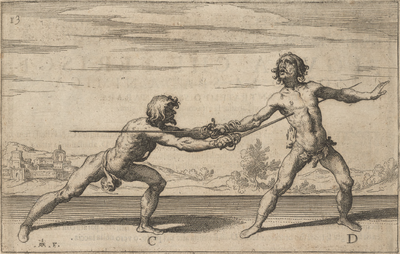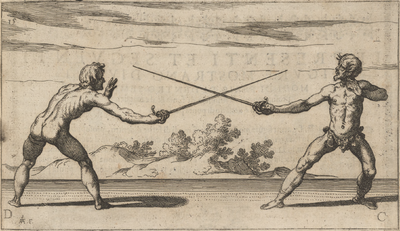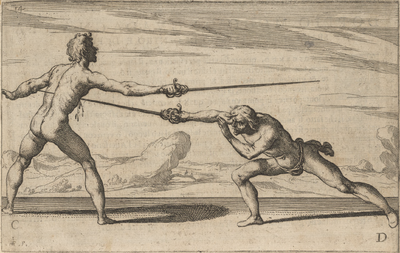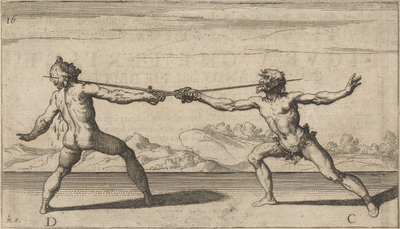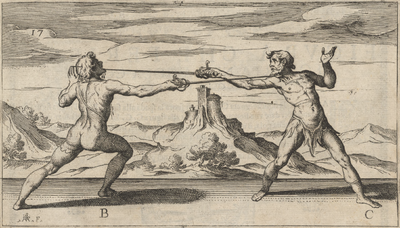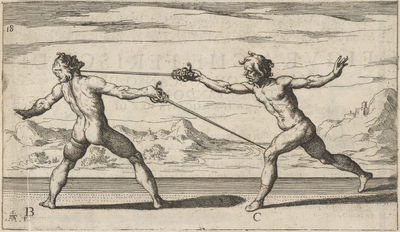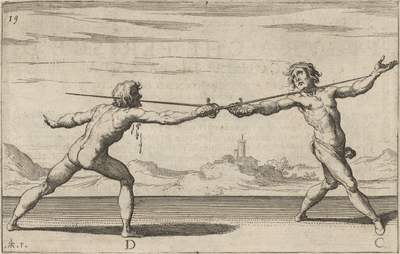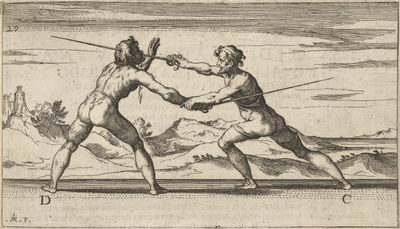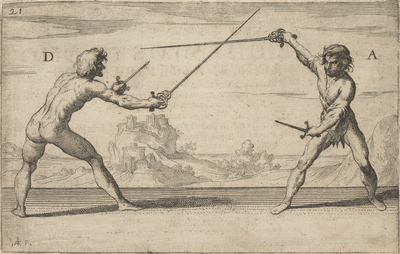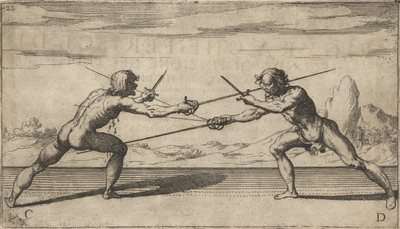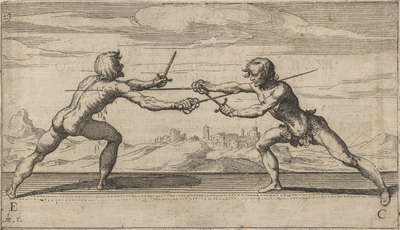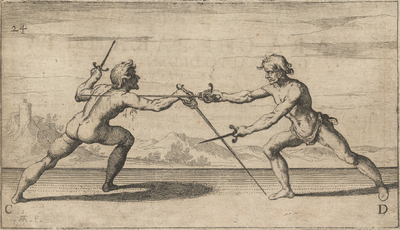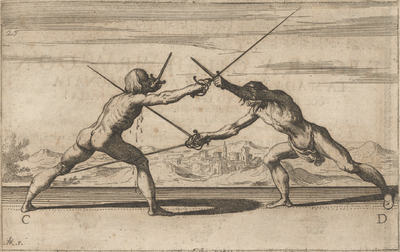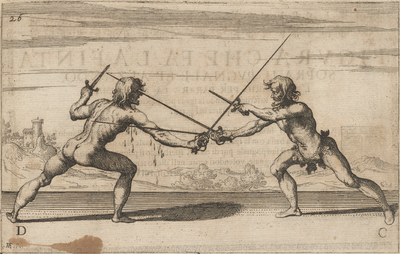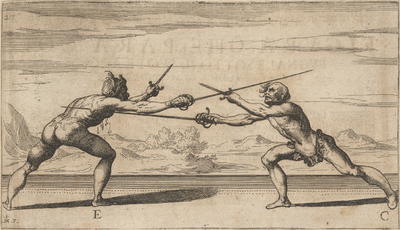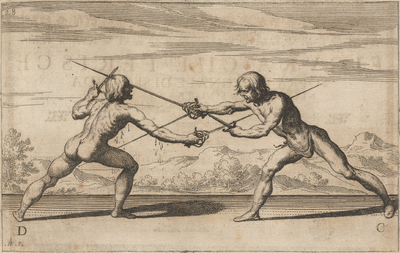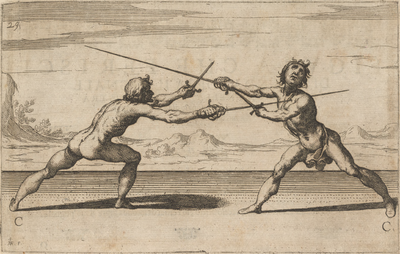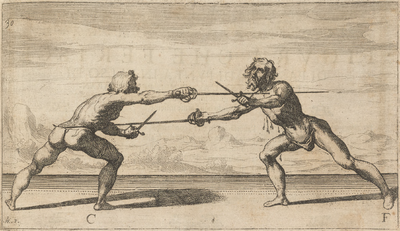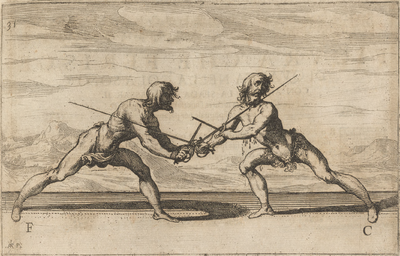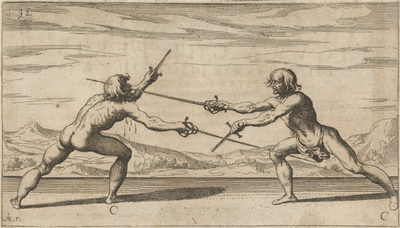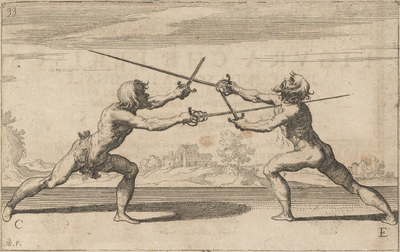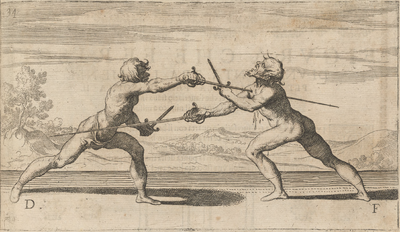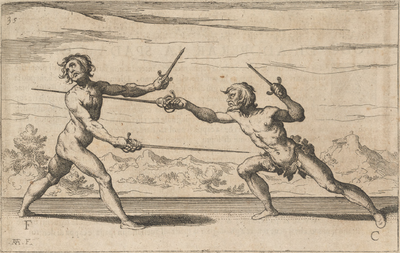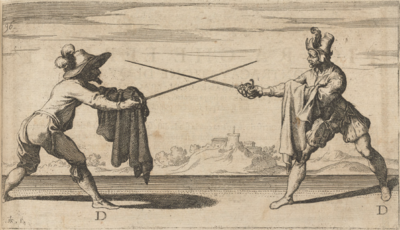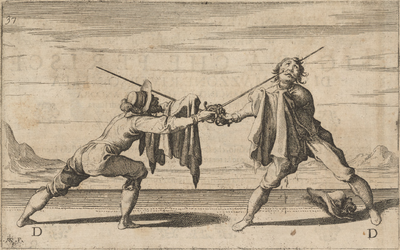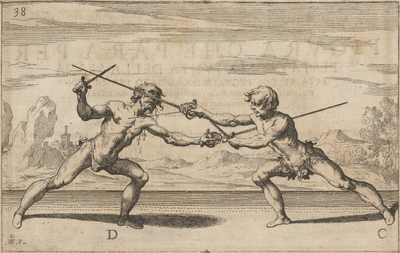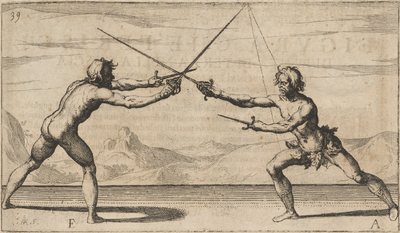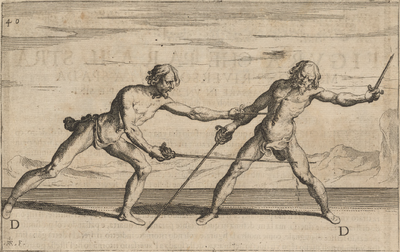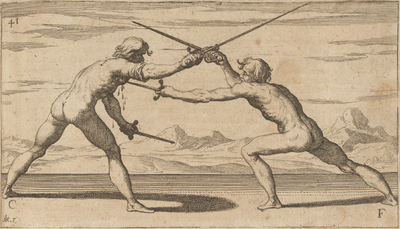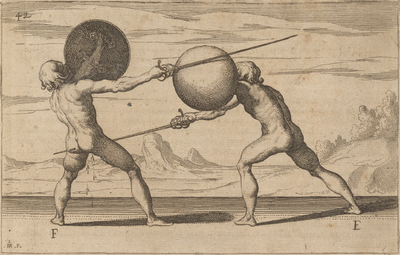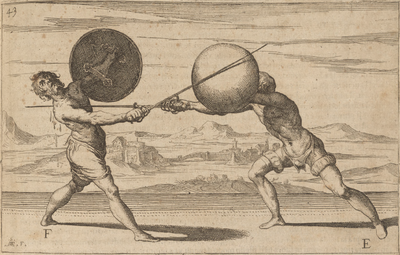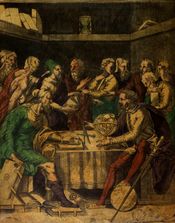|
|
You are not currently logged in. Are you accessing the unsecure (http) portal? Click here to switch to the secure portal. |
Difference between revisions of "Ridolfo Capo Ferro da Cagli"
| Line 56: | Line 56: | ||
! <p>Images<br/></p> | ! <p>Images<br/></p> | ||
! <p>{{rating|B}}<br/>by [[William Wilson]] and [[W. Jherek Swanger]]</p> | ! <p>{{rating|B}}<br/>by [[William Wilson]] and [[W. Jherek Swanger]]</p> | ||
| − | ! <p>Transcription<br/>by [[Società d’Arme dell’Aquila]]</p> | + | ! <p>Transcription (1610){{edit index|Index:Gran Simulacro dell'Arte e dell'Uso della Scherma (Ridolfo Capo Ferro da Cagli) 1601.pdf}}<br/>by [[Società d’Arme dell’Aquila]]</p> |
|- | |- | ||
| [[File:Capo Ferro Title 1610.png|400x400px|center]] | | [[File:Capo Ferro Title 1610.png|400x400px|center]] | ||
| − | | '''GREAT REPRESENTATION OF THE ART AND USE OF FENCING by Ridolfo Capo Ferro of Cagli''' | + | | <p>'''GREAT REPRESENTATION OF THE ART AND USE OF FENCING by Ridolfo Capo Ferro of Cagli,''' Maestro of the Most High German Nation, in the Famous City of Siena</p> |
| − | Maestro of the Most High German Nation, in the Famous City of Siena | ||
| − | Dedicated to the Most Serene Signore Don Federigo Feltrio della Rovere, Prince of the State of Urbino. | + | <p>Dedicated to the Most Serene Signore Don Federigo Feltrio della Rovere, Prince of the State of Urbino.</p> |
| − | In Siena, at the underporch of the Pontani. Printed by Salvestro Marchetti and Camillo Turi. | + | <p>In Siena, at the underporch of the Pontani. Printed by Salvestro Marchetti and Camillo Turi.<br/><br/></p> |
| − | With license of the Superiors, and with Privileges. 1610. | + | <p>With license of the Superiors, and with Privileges. 1610.</p> |
| − | | ' | + | | {{pagetb|Page:Gran Simulacro dell'Arte e dell'Uso della Scherma (Ridolfo Capo Ferro da Cagli) 1601.pdf|10|lbl=Ttl}} |
| − | |||
| − | |||
| − | |||
| − | |||
| − | |||
| − | |||
| − | |||
| − | |||
| − | ( | ||
|- | |- | ||
| rowspan=2 | [[File:Capo Ferro Coat of Arms.png|400x400px|center]] | | rowspan=2 | [[File:Capo Ferro Coat of Arms.png|400x400px|center]] | ||
| − | | '''To the Most Serene Signore Don Francesco Maria Feltrio della Rovere, sixth Duke of Urbino.''' | + | | <p>'''To the Most Serene Signore Don Francesco Maria Feltrio della Rovere, sixth Duke of Urbino.'''</p> |
| − | |||
| − | |||
| − | |||
| − | + | <p>Every father (Most Serene Signor Duke), in order that his children should acquire reputation, procures for them some place in some noble court, and of some protection, to provide for them the best that he can. Thus do I, which, finding the present book on the instruction of fencing born of the better part of me, attempt to place in court, and because more dear to me than any other are the progeny of my intellect, I plead with Your Highness to grant them some place in your court, which, being a perfect compendium of the world, considered perfect, shown in and of itself of so much beauty and goodness as is found in the world, the same is dedicated to the Most Serene Don Federigo, your son, recommending it to his protection, although a lad in child’s gowns, and in jests, and gay dances, it appears nonetheless that there are enfolded in his hands triumphs and spoils, and as young Alcide2 with infantile hand, not yet equal to the purpose, menaces the Hydra, slays the serpents, then in the generous shining of his aspect is seen the greatness of his ancestors, the magnanimity, the valor, and the innumerable other virtues, which have exhausted the greatest and most famous historians, and which will render him above every Prince, and named and illustrious; would they not prove sufficient to confer such eminence, in truth only the virtues of Your Excellency being in number and quality so great, that it rightly could come to be called a diligent imitator of the perfection of GOD? It is not to be marveled at, therefore, by Your Highness, if I long to introduce into your Most Serene House, and place under the protection of the Most Serene Prince, your son, this book of mine; but considering the singular graciousness, very characteristic of Your Highness and of his Most Serene Blood, I cannot but strongly hope that Your Highnesses, without regarding the baseness of the subject, will favor it fully with your most powerful favor. But whereas indeed it may not be proper for Your Highnesses to receive such baseness with such grace, consent at least (as I humbly beseech you) that it can stand alone in the public hall of your Royal Palace, and in the other public places of your ample Dominion, as much glory moreover will arise merely from the authority of having a place among those who are humbly dedicated to serving and revering Your Highnesses, for whom I pray to the Lord God for complete and perpetual happiness.</p> | |
| − | + | | | |
| − | | | + | {{pagetb|Page:Gran Simulacro dell'Arte e dell'Uso della Scherma (Ridolfo Capo Ferro da Cagli) 1601.pdf|12|lbl=i|p=1}} {{section|Page:Gran Simulacro dell'Arte e dell'Uso della Scherma (Ridolfo Capo Ferro da Cagli) 1601.pdf/13|1|lbl=ii|p=1}} |
|- | |- | ||
| − | | | + | | <p>From Siena on the 8th of April, 1610.</p> |
| − | |||
| − | |||
| − | |||
| − | |||
| − | | | + | <p>Your Most Serene Highness’s Most Humble Subject, and Most Devoted Servant,<br/>Ridolfo Capo Ferro of Cagli.</p> |
| − | {{ | + | | {{section|Page:Gran Simulacro dell'Arte e dell'Uso della Scherma (Ridolfo Capo Ferro da Cagli) 1601.pdf/13|2|lbl=-}} |
| − | |||
| − | |||
| − | |||
| − | |||
| − | |||
|- | |- | ||
| − | + | | [[File:Capo Ferro Portrait.png|400x400px|center]] | |
| − | + | | <p>'''TO THE GRACIOUS READER RIDOLFO CAPO F. DA CAGLI.'''</p> | |
| − | + | ||
| + | <p>It is not my intention to hold you at bay with pompous and splendid words, in the recommending to you of the profession of arms that I practice. It is extolled in the due order of its merit, for which it is greatly prized and honored, and always praised, and the greatness and valor are commended of those who worthily carry the sword at their side; among whom today shines gloriously the Most Illustrious Signor SILVIO Piccolomini, Grand Prior of the Religion of the Knights of Saint Stephen in Pisa, and General of the Artillery and Master of Chamber of S.A.S. because not only is he endowed with full and marvelous advantage of that of the sword, but also of every other chivalric art, as his heroic actions by the same, to the wonder of all, clearly make manifest. But to turn to the sword, I say it is the noblest weapon above all others, in whose handling the majority of the industry of the art of fencing is honorably employed; therefore according to my judgment, the carrying of arms does not alone constitute the entire work, and that is not what makes the essential difference between a completely valorous man, and a vile and cowardly one, but as well the profession that someone practices to know how to employ them valorously in legitimate defense of himself and of his homeland, which no one truly can do with honor, if he has not first humbled himself, and placed himself under the law and rules of the discipline of fencing. Which, in the manner of sharpened flint, and honing valor, reduces him to the apex of his true perfection. The reason being that this science is laudable and so overly precious, that rather it would be a hopeless work to want to undertake the task of recounting all of its excellence; I do not believe that any rebuke must fall upon me, because I have set myself to press it into terms of undoubtedly brief, infallible, and well ordered precepts, avoiding as much as possible the blind and dark confusions, the deceitful and fallacious uncertainties, and burdensome and ambitious long-windedness. Now, even as through recognition of my weak faculties, I do not presume to have the joy of success of the full response to the fervor of my most ardent desire, so am I assured that my sincere and cordial labor has not turned out to be accomplished in vain, deferring such to comparison to those who dealt with the same topic before me. Considering that such thing relied upon the virtue of that by whose favor all graces descend unto us, I hope fervently, by these more faithful instructions of mine that may serve no less useful and delightful to you than showy ones, for a small particle of that sweet display of the true glory, that it pleases the graceful spirits always to courteously offer to one who with sincerity of heart goes perpetually laboring in their honored services.</p> | ||
| + | | | ||
| + | {{pagetb|Page:Gran Simulacro dell'Arte e dell'Uso della Scherma (Ridolfo Capo Ferro da Cagli) 1601.pdf|16|lbl=v|p=1}} {{pagetb|Page:Gran Simulacro dell'Arte e dell'Uso della Scherma (Ridolfo Capo Ferro da Cagli) 1601.pdf|17|lbl=vi|p=1}} | ||
|- | |- | ||
| − | | | + | | class="noline" | |
| − | | '''GENERAL TABLE OF THE ART OF FENCING''' | + | | class="noline" | '''GENERAL TABLE OF THE ART OF FENCING''' |
# First chapter, of fencing in general. | # First chapter, of fencing in general. | ||
# In the second chapter is contained the definition of fencing and its explanation. | # In the second chapter is contained the definition of fencing and its explanation. | ||
| Line 126: | Line 107: | ||
# In the twelfth is treated of striking. | # In the twelfth is treated of striking. | ||
# In the thirteenth, of the dagger. | # In the thirteenth, of the dagger. | ||
| − | | '' | + | | class="noline" | {{pagetb|Page:Gran Simulacro dell'Arte e dell'Uso della Scherma (Ridolfo Capo Ferro da Cagli) 1601.pdf|14|lbl=iii}} |
| − | + | ||
| − | + | |} | |
| − | + | {{master end}} | |
| − | + | ||
| − | + | {{master begin | |
| − | + | | title = ''The Art of Fencing'' | |
| − | + | | width = 90em | |
| − | + | }} | |
| − | + | {| class="master" | |
| − | + | |- | |
| − | + | ! <p>Images<br/></p> | |
| − | + | ! <p>{{rating|B}}<br/>by [[William Wilson]] and [[W. Jherek Swanger]]</p> | |
| − | + | ! <p>Transcription<br/>by [[Società d’Arme dell’Aquila]]</p> | |
|- | |- | ||
Revision as of 22:30, 18 July 2020
| Ridolfo Capo Ferro da Cagli | |
|---|---|
| 200px | |
| Born | 16th century |
| Died | 17th century |
| Occupation | Fencing master |
| Patron | Federico Ubaldo della Roevere |
| Influences | Camillo Aggrippa |
| Influenced | Sebastian Heußler |
| Genres | Fencing manual |
| Language | Italian |
| Notable work(s) | Gran Simulacro dell'Arte e dell'Uso della Scherma (1610) |
| Concordance by | Michael Chidester |
Ridolfo Capo Ferro da Cagli (Ridolfo Capoferro, Rodulphus Capoferrus) was a 17th century Italian fencing master. He seems to have been born in the town of Cagli in Urbino and was a resident of Siena, Tuscany. Little is known about the life of this master, though the dedication to Federico Ubaldo della Roevere, the young son of Duke Francesco Maria Feltrio della Roevere, may indicate that he was associated with the court at Urbino in some capacity. The statement at the beginning of Capo Ferro's treatise describing him as a "master of the great German nation"[1] likely signifies that he was faculty at the University of Siena, either holding a position analogous to dean of all German students, or perhaps merely the fencing master who taught the German students.
Capo Ferro authored a fencing manual on the rapier entitled Gran Simulacro dell'Arte e dell'Uso della Scherma ("Great Representation of the Art and Use of Fencing"); it was published in Siena in 1610 and refers to Federico by the ducal title. Though this treatise is highly praised by modern fencing historians, it is neither comprehensive nor particularly innovative and does not seem to have been terribly influential in its own time.
Contents
Treatise
Images |
Complete Translation |
Transcription (1610) |
|---|---|---|
GREAT REPRESENTATION OF THE ART AND USE OF FENCING by Ridolfo Capo Ferro of Cagli, Maestro of the Most High German Nation, in the Famous City of Siena Dedicated to the Most Serene Signore Don Federigo Feltrio della Rovere, Prince of the State of Urbino. In Siena, at the underporch of the Pontani. Printed by Salvestro Marchetti and Camillo Turi. With license of the Superiors, and with Privileges. 1610. |
[Ttl] GRAN SIMVLACRO DELL’ARTE E DELL’VSO DELLA SCHERMA DI RIDOLFO CAPO FERRO DA CAGLI, MAESTRO DELL’ECCELSA NATIONE ALEMANNA, nell'Inclita Città di Siena. DEDICATO AL SERENISSIMO SIG. DON FEDERIGO FELTRIO DELLA ROVERE PRINCIPE DELLO STATO D’VRBINO. In Siena, al sopportico de Pontani. Appresso Saluestro Marchetti, e Camillo Turi.
| |
To the Most Serene Signore Don Francesco Maria Feltrio della Rovere, sixth Duke of Urbino. Every father (Most Serene Signor Duke), in order that his children should acquire reputation, procures for them some place in some noble court, and of some protection, to provide for them the best that he can. Thus do I, which, finding the present book on the instruction of fencing born of the better part of me, attempt to place in court, and because more dear to me than any other are the progeny of my intellect, I plead with Your Highness to grant them some place in your court, which, being a perfect compendium of the world, considered perfect, shown in and of itself of so much beauty and goodness as is found in the world, the same is dedicated to the Most Serene Don Federigo, your son, recommending it to his protection, although a lad in child’s gowns, and in jests, and gay dances, it appears nonetheless that there are enfolded in his hands triumphs and spoils, and as young Alcide2 with infantile hand, not yet equal to the purpose, menaces the Hydra, slays the serpents, then in the generous shining of his aspect is seen the greatness of his ancestors, the magnanimity, the valor, and the innumerable other virtues, which have exhausted the greatest and most famous historians, and which will render him above every Prince, and named and illustrious; would they not prove sufficient to confer such eminence, in truth only the virtues of Your Excellency being in number and quality so great, that it rightly could come to be called a diligent imitator of the perfection of GOD? It is not to be marveled at, therefore, by Your Highness, if I long to introduce into your Most Serene House, and place under the protection of the Most Serene Prince, your son, this book of mine; but considering the singular graciousness, very characteristic of Your Highness and of his Most Serene Blood, I cannot but strongly hope that Your Highnesses, without regarding the baseness of the subject, will favor it fully with your most powerful favor. But whereas indeed it may not be proper for Your Highnesses to receive such baseness with such grace, consent at least (as I humbly beseech you) that it can stand alone in the public hall of your Royal Palace, and in the other public places of your ample Dominion, as much glory moreover will arise merely from the authority of having a place among those who are humbly dedicated to serving and revering Your Highnesses, for whom I pray to the Lord God for complete and perpetual happiness. |
[i] AL SERENISSIMO SIGNORE DON FRANCESCO MARIA FELTRIO DELLA ROVERE DVCA SESTO D’VRBINO. OGNI Padre (Serenissimo Signor Duca) acciò che i figliuoli suoi acquistin reputatione, procaccia lor qualche luogo in qualche nobil Corte, e di qualche protetione, li provede la maggiore che può. Così fo io, il quale, trovandomi il presente libro d’Ammaestramenti di Scherma, parto della parte migliore di me stesso, procuro di mandarlo in Corte, e perchè son più cari d’ogn’altro i parti dell’intelletto, supplico V. A. a concedergli qualche luogo nella sua Corte, la quale essendo un perfetto compendio del mondo, considerato perfetto, mostra in sè quanto di bello e di buono si trova nel mondo istesso, e dedicandolo al Serenissimo DON FEDERIGO suo Figlio, il raccomando alla sua protetione; il quale, benchè fanciullo in fasce, e scherzi e rida, par nondimeno che ci ravvolga per le sue mani trionfi e spoglie e, come novello Alcide, con pargoletta mano, non ancor pari alle voglie, minaccia l’Idra, uccide i Serpenti, poichè nell’aspetto suo generoso rilucer si vede la grandezza de’ suoi maggiori, la magnanimità, il valore e l’innumerabili altre virtù che hanno stancati i maggiori e più famosi Istoriografi, e che lui renderanno, sopra ogni nominato Principe, e nominato ed illustre, alla quale eminenza si basterebbono in vero le sole vir- [ii] tù dell’A. V. in numero, ed in qualità così grandi che ella può venir direttamente chiamata imitator diligente della perfettione di DIO. Non si maravigli dunque l’A. V. se io bramo d’introdur nella sua Serenissima Casa, e d’appoggiare alla protetion del Serenissimo PRINCIPE suo Figliolo quaesto mio libro, ma considerando qual sia la forza dell’affetto paterno, mi scusi dell’ardimento mio. Io, certamente considerata la singolar benignità molto propria di V. A. e del suo Serenissimo Sangue, non posso non fermamente sperare che l’AA. VV. senza riguardar la bassezza del suggetto, il favoriranno compiutamente del potentissimo favor loro. Ma dove pur non fusse convenevole all’Altezza loro ricevere a tanta gratia, cotanta bassezza, consentino almeno (di che humilmente le suplico) che starsene possa nella publica sala del lor Regio Palazzo, e ne gli altri publici luoghi del loro ampio Dominio, chè molta gloria etiamdio sarà il poter solamente haver luogo fra quegli, che si sono humilmente dedicati a servire, e riverire le VV. SS. AA. alle quali prego dal Signore Iddio intera, e perpetua felicità. | |
From Siena on the 8th of April, 1610. Your Most Serene Highness’s Most Humble Subject, and Most Devoted Servant, |
Di Siena, il dì 8. Aprile. 1610. Di V. A. S.
| |
TO THE GRACIOUS READER RIDOLFO CAPO F. DA CAGLI. It is not my intention to hold you at bay with pompous and splendid words, in the recommending to you of the profession of arms that I practice. It is extolled in the due order of its merit, for which it is greatly prized and honored, and always praised, and the greatness and valor are commended of those who worthily carry the sword at their side; among whom today shines gloriously the Most Illustrious Signor SILVIO Piccolomini, Grand Prior of the Religion of the Knights of Saint Stephen in Pisa, and General of the Artillery and Master of Chamber of S.A.S. because not only is he endowed with full and marvelous advantage of that of the sword, but also of every other chivalric art, as his heroic actions by the same, to the wonder of all, clearly make manifest. But to turn to the sword, I say it is the noblest weapon above all others, in whose handling the majority of the industry of the art of fencing is honorably employed; therefore according to my judgment, the carrying of arms does not alone constitute the entire work, and that is not what makes the essential difference between a completely valorous man, and a vile and cowardly one, but as well the profession that someone practices to know how to employ them valorously in legitimate defense of himself and of his homeland, which no one truly can do with honor, if he has not first humbled himself, and placed himself under the law and rules of the discipline of fencing. Which, in the manner of sharpened flint, and honing valor, reduces him to the apex of his true perfection. The reason being that this science is laudable and so overly precious, that rather it would be a hopeless work to want to undertake the task of recounting all of its excellence; I do not believe that any rebuke must fall upon me, because I have set myself to press it into terms of undoubtedly brief, infallible, and well ordered precepts, avoiding as much as possible the blind and dark confusions, the deceitful and fallacious uncertainties, and burdensome and ambitious long-windedness. Now, even as through recognition of my weak faculties, I do not presume to have the joy of success of the full response to the fervor of my most ardent desire, so am I assured that my sincere and cordial labor has not turned out to be accomplished in vain, deferring such to comparison to those who dealt with the same topic before me. Considering that such thing relied upon the virtue of that by whose favor all graces descend unto us, I hope fervently, by these more faithful instructions of mine that may serve no less useful and delightful to you than showy ones, for a small particle of that sweet display of the true glory, that it pleases the graceful spirits always to courteously offer to one who with sincerity of heart goes perpetually laboring in their honored services. |
[v] AI BENIGNI LETTORI RIDOLFO CAPO F. DA CAGLI. NON è la mia intentione di tenervi a bada con pompose, & splendide parole nel raccomandarvi la professione dell’arme, che io fo. Essa, sublimata nel debito grado al suo merito, da per sè si pregia & honora assai, & tuttavia loda, & commenda la grandezza, & il valor di quegli, che degnamente portano la spada a lato. Tra i quali, hoggi gloriosamente risplende l’Illustrissimo Signor SILVIO PICCOLOMINI Gran Priore della Religione de’ Cavalieri di Santo Stefano in Pisa & Generale dell’Artiglierie e Mastro di Camera di S. A. S., perciò che non pure è fornito, a pieno & con meraviglioso avantaggio di questa, della spada, ma ancora d’ogni altra arte Cavalleresca, come l’heroiche sue attioni appresso l’istesso, con istupore di tutti, appresso si manifestano. Ma per tornare alla spada, dico ella essere arme sopra ad ogn’altra nobilissima, nel cui maneggio il più dell’industria dell’arte della Scherma honoratamente s’impiega, perciò che secondo il mio giuditio il portar l’arme solo non fa l’opera intera; & non è quello che fa essentiale differenza da un huomo compiutamente valoroso a un vile & codardo, ma sì bene la professione, ch’altrui fa di saperle adoprare valorosamente in legittima difesa di se stesso & della Patria sua, la quale veramente nessuno può fare con suo honore, se prima non s’humilia & sottomette alle leggi & regole della disciplina della scherma; la quale a guisa di cote affinando & assottigliando il valore, lo riduce al colmo della sua vera perfettione. Laonde essendo questa scienza sì lodevole & tanto pregiata che soperchio, anzi opera perduta, sarebbe voler prendere l’assunto di raccontare tutte le sue eccellenze, non credo che in me habbia da cadere veruna ripren- [vi] sione, perchè mi sia messo a stringerla nei termini di certi brevi, infallibili, & ben ordinati precetti, schivando al più possibile la cieca, & oscura confusione, l’ingannevole, e fallace incertezza, & la disutile, ed ambitiosa prolissità. Hora, sì come per la conoscenza delle deboli forze mie, non presumo, che la felicità del successo habbia del tutto risposto al fervore del mio ardentissimo desiderio, così m’assicuro che la mia honesta & cordial fatica non mi sia riuscita vana a fatto, rimettendomi in ciò al paragone di chi innanzi me trattarono il medesimo suggetto. Per la qual cosa, confidato nella virtù di quello dal cui favore tutte le gratie in noi discendono, spero fermamente che da questi miei più fedeli che appariscenti ammaestramenti, sia per tornare non meno a voi utile e diletto, che a me una piccola particella di quel dolce saggio della vera gloria, che a gli animi grati sempremai piace di cortesemente porgere a chi con sincerità di cuore si va continuamente affaticando ne’ loro honorati servigij. | |
GENERAL TABLE OF THE ART OF FENCING
|
[iii] TAVOLA GENERALE DELL’ARTE DELLA SCHERMA 1 CApitolo primo della scherma in generale. 2 Nel secondo Capitolo si contiene la difinitione della scherma & la sua dichiaratione. 3 Nel terzo si abbraccia la division della scherma & si tratta della sua prima parte, ch’è posta nella conoscenza della spada. 4 Nel quarto si tratta della seconda parte della scherma & della misura. 5 Nel quinto si ragiona del tempo. 6 Nel sesto si tratta della positura della persona & primieramente della testa. 7 Nel settimo si tratta della vita. 8 Nell’ottavo delle braccia. 9 Nel nono si tratta delle coscie, gambe, piedi & del passo. 10 Nel decimo si ragiona della difesa & della guardia. 11 Nell’undecimo si tratta del cercare la misura stretta. 12 Nel duodecimo si tratta del ferire. 13 Nel decimoterzo del pugnale. |
Images |
Complete Translation |
Transcription |
|---|---|---|
| Chapter I: Of Fencing in general
1) There is nothing in the world to which Nature, wise mistress and benign mother of the universe, with greater genius, and more solicitudinous regard, than for the conservation of one’s self provides him (of which Man is, more so than any other noble creature, demonstrating himself very dear of his safety), as the singular privilege of the hand, with which not only does he go procuring all things necessary for the sustenance of his life, but if he arms himself yet with the sword, noblest instrument of all, protects and defends himself, against any willful assault of inimical force; nonetheless following the strict rule of true valor, and of the art of fencing. |
CAPITOLO I Della scherma in generale.
1 Non è cosa al Mondo alla quale la Natura, savia Maestra & benigna Madre dell’universo, con maggior ingegno & più sollecitudine riguardi che alla conservatione di se stessa, della quale essendo l’huomo, sopra ad ogn’altra, nobilissima creatura, mostrandosi molto tenera della sua salute, lo provvide, come di singolar privilegio, della mano, con la quale non solamente va procurando tutte le cose necessarie per sustentatione della vita, ma si arma ancor di spada, nobilissimo instrumento di tutti, per riparare & difendersi con essa contra qual si voglia assalto di forza nemica, però secondo la dritta regola del vero valore & dell’arte della scherma. | |
| 2) Hence if one would clearly discern how necessary to man, how useful, and honorable may be the said discipline, and how it is that to everyone it may be necessary, and good to them, and maximally in demand, those armed of singular valor are inclined to the noble profession of the military, to which this science is subordinate in the guise of an alternative or subservient discipline, as is the part to the whole, and the end of the middle is subject to the final end. | 2 Onde si puote chiaramente discernere quanto all’huomo sia necessaria, utile & honorata la detta disciplina & come che ad ogn’uno faccia mestieri, & stia bene a quegli, & massimamente richiesta, i quali armati di singolar valore sono inclinati alla nobile professione della militia, alla quale questa scienza è sottoposta, guisa di disciplina alternativa, o servente, sì come la parte al tutto & il fine di mezzo all’ultimo fine è suggetto. | |
| 3) The aim of fencing is the defense of self, from whence it derives its name; because “to fence” does not mean other than defending oneself, hence it is that “protection” and “defense” are words of the same meaning; whence one recognizes the value and the excellence of this discipline is such that everyone should give as much care thereunto, as they love their own life, and the security of their native land, being obligated to spend that lovingly and valorously in the service thereof. | 3 Il fine della scherma è la difesa di se stesso, dalla quale ancora prese il suo nome, perchè schermire non vien a dire altro che difesa, e schermo & difesa sono parole di medesimo significato; onde si conosce il pregio, & l’eccellenza di questa disciplina, che ad ogn’uno debba essere tanto cara quanto ama la sua propria vita & la salute della Patria sua, essendo obbligato a spender quella amorevolmente & valorosamente in servitio di questa. | |
| 4) Thence it is yet seen that defense is the principal action in fencing, and that no one must proceed to offense, if not by way of legitimate defense. | 4 Indi si vede ancora che la difesa è la principale attione nella scherma & che nessuno debba procedere all’offesa, se non per la via della legittima difesa. | |
| 5) The effective causes of this discipline are four. Reason, nature, art, and practice. Reason, as orderer of nature. Nature, as potent virtue. Art, as regulator and moderator of nature. Practice, as minister of art. | 5 Le cause efficienti di questa disciplina sono quattro: la Ragione, la Natura, L’Arte & l’Esercitio. La Ragione come dispositrice della Natura. La Natura come virtù potente. L’Arte come regola & moderatrice della Natura. L’Esercitio come ministro dell’Arte. | |
| 6) Reason orders nature, and the human body in fencing, is its defense, in reason is considered judgment and volition. Judgment discerns and understands that which must be done for its defense. Volition inclines and stimulates one to the preservation of self. | 6 La Ragione dispone la Natura & il corpo humano alla scherma e sua difesa; nella Ragione si considera il giuditio & la volontà. Il giuditio discerne & intende quello che deve fare per sua difesa. La volontà l’inclina & stimula alla conservatione di se stesso. | |
| 7) In the body, which in the guise of servant executes the commandments of reason, is to be considered in the body proper greatness: in the eyes the vitality, and in the legs, in the body, and in the arms, the agility, vigor, and quickness. | 7 Nel corpo, il quale a guisa di servitore esseguisce i comandamenti della Ragione, si considera nella persona la giusta grandezza, nell’occhio la vivezza e nelle gambe, nella vita e nelle braccia la scioltezza, gagliardezza e prestezza. | |
| 8) Nature orders and prepares matter, is the sketch, is the accommodation to such extent in order to contain the final form and perfection of art. | 8 La Natura dispone & prepara la materia e l’abbozza e l’accommoda alquanto per ricever l’ultima forma & perfettione dell’Arte. | |
| 9) Art regulates nature, and with more secure escort guides us according to the infallible truth, and by the ordinance of its precepts to the true science of our defense. | 9 L’Arte regola la Natura & con più sicura scorta ci guida per l’infallibile verità e per l’ordine de’ suoi precetti alla vera scienza della nostra difesa. | |
| 10) Practice conserves, augments, stabilizes the strength of art, of nature, and more so than science, begets in us the prudence of many details. | 10 L’Esercitio conserva, augmenta, istabilisce le forze dell’Arte, della Natura & oltre la scienza partorisce in noi la prudenza in molte particolarità. | |
| 11) Art regards nature and sees that owing to the small capacity of matter, it cannot do all that which it intends to do, and however considers in many details its perfections and imperfections, and in the guise of architect takes thereof and makes such a beautiful model that it is thus refined, and sharpens the rough-hewn things of nature, reducing them little by little to the height of their perfection. | 11 L’Arte riguarda alla Natura & vede che per la poca capacità della materia non può fare tutto ciò che intende di fare & però considera in molti particolari le sue perfettioni & imperfettioni, & a guisa d’Architetto ne prende & fa qualche bel modello e così affina & assottiglia le cose della natura dirozzate, riducendola a poco a poco al colmo della sua perfettione. | |
| 12) From nature art has undertaken in defending oneself the ordinary step, the third guard for resting in defense, and the second and fourth for offense, the tempo, or the measure, and the manner as well of the placement of the body, with the torso now placed above the left leg for self-defense, now thrown forward and carried on the right leg in order to offend. | 12 Dalla Natura l’Arte ha preso, nel difendersi, il passo ordinario, la guardia terza per stare in difesa & la seconda & quarta per offesa, il tempo o la misura, sì come ancora la positura della persona con la vita, hora posata nella gamba manca per difendersi, hora spinta innanzi e caricata nella gamba dritta per offendere. | |
| 13) Because without doubt the first offenses were those of the fists, in the making of them is seen the ordinary step. The third, the second, and fourth, it is yet seen, that many do the punch mostly in tempo and measure. | 13 Perchè senza dubbio le prime offese furono quelle della pugna, nel fare alle quali si vede il passo ordinario, la terza, la seconda e quarta; si vede ancora che molti sanno fare alle pugna molto a tempo & a misura. | |
| 14) Against this offense of the fist, of course was found the art of the stick, and this defense not yet sufficing, iron; I believe it is, that of this material were made little by little many diverse weapons, but always one more perfect than all others, owing to the multiplicity of its offenses, to wit that the sword was discovered, the perfect weapon, and proportioned to the proper distance, in which mortals naturally can defend themselves. | 14 Contro questa offesa delle pugna, senz’altro fu trovato dall’Arte il bastone &, non bastando ancora questa difesa, il ferro; e credo io che di questa materia si facessero di mano in mano molt’armi diverse, ma sempre una più perfetta dell’altra, secondo che moltiplicavano le offese, in fin che fu trovata la spada, arme perfetta & proportionata alla giusta distantia, nella quale i mortali naturalmente si possono difendere. | |
| 15) The weapons which are of length exceeding the distance of natural defense and offense are discommodious and abhorrent for use in civic converse, and the excessively short ones are insidious and with danger to life; owing to which, in republics founded upon justice of good laws, and of good customs, it always was, and is, prohibited to carry arms of which can be born treacherous and heedless homicides. On the contrary, in the ancient Roman republic, the true ideal of a good government, the use of arms was entirely prohibited, and to no one, however noble and great that there was, was it licit to carry a sword or other weapon, except in war, and those who in time of peace were discovered with arms, were proceeded against as against murderers. | 15 L’armi che di lunghezza eccedono la distantia della difesa & offesa naturale sono scommode & abborescenti dall’uso della conservation Civile, e le troppo corte son insidiose e con pericolo di vita; per il che nelle Repubbliche fondate nella Giustitia delle buone leggi e dei buoni costumi sempre fu & è proibito di portar l’arme, onde possano nascere tradimenti & disaveduti homicidij. Anzi nella Republica Romana antica, ov’era idea d’un buon governo, fu del tutto interdetto l’uso dell’armi & a nessuno per nobile e grande che fosse era lecito portare la spada o altr’arme fuor che nella guerra, & contro quelli che a tempo di pace si trovavano con armi, procedevano come contro omicidiali. | |
| 16) And the Roman soldiers, immediately upon arriving home, put down their arms together with their short uniforms, and soldiery, and assumed again their long civil robes, and attended to the studies and the arts of peace, because no Roman exercised the body (as says Salustio) without the brain, each one attending beyond the studies of war, to each office of peace, therefore desirous, the burden of war, themselves supported, and yet immediately upon the end of war, they heard no more of captain, of soldier, nor of military wages. | 16 Et i soldati Romani, subito che arivavano a casa deponevano l’armi insieme con l’habito soldatesco & repigliavano la veste lunga e Civile & attendevano alli studij & all’arti della pace, perchè nissuno Romano esercitava il corpo (come dice Sallustio) senza l’ingegno: ogn’uno attendeva oltre allo studio della guerra ad uno offitio della pace, per cui desiderio le gravezze della guerra si sopportano; & però subito finita la guerra non s’intendeva più nè Capitano, nè soldato, nè soldo nessuno. | |
| 17) In these times soldiers are a greater burden to Princes and to Lords, and more so to the populace in times of peace than in war, and because they are not trained in other studies than those of war, they hate peace, and much of the time they are the authors of turbulence and wretched counsel. | 17 A questi tempi i soldati sono di maggior gravezza a i Principi & alle Signorie & maggiormente a i Popoli nel tempo della pace che della guerra, & perchè non sono avezzi ad altri studij che a quelli della guerra, odiano la pace & il più delle volte si fanno autori de turbolenti e cattivi consigli. | |
| 18) But turning to our matter, I say that the sword is the most useful and just arm, because it is proportioned to the distance at which offense is naturally performed, and all arms, to the degree that they differ from this distance of natural defence and offense, are to that extent more bestial and adverse to nature, and therefore useless to civic converse; the one is the way of virtue and of true reason, and the other burdensome and coarse, from which nature never departs, keeping company with sin and ignorance, and sliding about by many routes; one is the straight line, which none but the artful knows how to do; the oblique lines are infinite, and anyone can do them. Whence in our times we see offenses and defences multiply themselves and the art unto infinity, human endeavour imitating nature from principles; and while it follows the traces thereof it is useful and advantageous to the human life, but as soon as it departs from the footprints of nature, it begins to degenerate from the nobility of its origin, and hurls itself into the snares of harmful fancy, and plunges human kind into the abyss of ignorance, leading it from the age of gold into the filthiness of mud. | 18 Ma tornando alla nostra materia, dico che la spada sia arme utilissima & giustissima, perchè è proportionata alla distantia nella quale naturalmente si fa l’offesa & tutte l’arme quanto più si discostano da questa distanza della difesa & offesa naturale, tanto sono più bestiali & più avverse alla natura & però inutili alla conservation Civile: una è la strada della virtù & della vera ragione, è quella faticosa & aspra, dalla quale la Natura mai si diparte; al vitio & all’ignorantia si discorre e sdrucciola per molte vie; una è la linea retta, la quale non sa fare se non l’artefice, le linee oblique sono infinite & le può fare ogn’uno. Onde vediamo a’ nostri tempi multiplicarsi l’offese e le difese in infinito; l’arte & l’industria humana da principio imita la Natura & mentre che seguita l’orme sue è utile & giovevole al vivere humano, ma subito ch’esce dalle pedate della Natura incomincia a tralignare dalla nobiltà della sua origine & si precipita per li trabucchi della nocevol curiosità e sprofonda la generation humana nell’abisso dell’ignoranza, conducendola dal secolo d’Oro nella bruttura del fango. | |
| 19) From the force of nature, art, and practice, as efficient causes of the defense of which, up until now we have treated, is born the advantage and disadvantage of arms, but principally derives from the just height of body and from the length of the sword; because a man, large of frame, and that carries a sword proportioned to his body, without doubt will come first to the measure. In regard of this, in order to compensate for the natural imperfections of those who are found to be inferior of height, I believe, that it is prohibited in certain lands to make the blade of a sword longer than another, which does not seem a just thing, that one, who is through nature superior, loses advantage still from art, necessitating to him to suffice the privilege of nature, which without manifest indignity, wanting to equalize him with the smaller, not able to take away from him in general, with bestowing a sword less long to him, than to those who are short, who by chance could have other advantages of art and of practice, which exceed those of nature, in which cases human prudence is not sufficient to provide imparticular things. | 19 Dalle forze della Natura, dell’Arte & dell’Esercitio, come cause efficienti della difesa delle quali fin’hora habbiamo trattato, nasce ogni vantaggio & disvantaggio dell’armi, ma principalmente deriva dalla giusta altezza della persona & dalla lunghezza della spada, perchè un huomo grande di persona & che porta una spada proportionata alla sua altezza, senza dubbio verrà prima a misura. In riguardo di questo, per soccorrere all’imperfettione naturale di quegli che si trovano inferiori di grandezza, credo che sia prohibito in certi paesi di fare una lama di spada più lunga dell’altra, chè non pare cosa giusta che quello ch’è di natura superiore si prevalga ancor dell’avantaggio dell’Arte, dovendo bastare il privilegio della Natura, il quale, senza manifesta indegnità, volendogli pareggiare con li più piccoli, non se li può torre in generale con attribuire una spada meno lunga a loro che alli piccoli, i quali per aventura potrebbono havere altri vantaggi dall’arte & dall’esercitio che avanzassero quelli della natura; a’ quali casi la prudenza humana non è sufficiente a provedere così in particulare. | |
| 20) The art of fencing is most ancient, and was discovered in the times of Nino, King of the Assyrians, who, through use of the advantage of arms, was made monarch and patron of the world; from the Assyrians the monarchy passed to the Persians; the praise of this practice, through the valor of Ciro, from the Persians, came to the Macedonians, from these to the Greeks, from the Greeks it was fixed in the Romans, who (as testifies Vegetius) delivered in the field masters of fencing, whom they named “Campi doctores, vel doctores” which is to say, guides, or masters of the field, and these taught the soldiers the strikes of the point and of the edge against a pole. Nowadays we Italians equally carry the boast in the art of fencing, although more in the schools than in the field, and in the use of the militia, considering that in these times war is made more with artillery, and with the arquebus, than with the sword, which moreover almost will not serve in order to secure victory. | 20 L’arte della scherma è antichissima & fu trovata a i tempi di Nino Re delli Assiri, il quale per uso e avantaggio dell’armi si fece Monarca & patrone del Mondo; dalli Assiri con la Monarchia passò a’ Persiani la lode di questo esercitio, per il valore di Ciro; da’ Persiani pervenne a’ Macedonesi, da questi a i Greci, da i Greci si fermò ne’ Romani, i quali (come testimonia Vegetio) menavano in Campo Maestri di scherma, i quali nomavano Campi ductores, vel doctores, che vuol dire guide o Maestri del Campo; & questi insegnavano a’ soldati di ferire di punta e di taglio contro a un palo. Hoggidì noi Italiani parimente portiamo il vanto nell’arte della scherma, ben che più nelle Scuole che in Campo, e nell’uso della Militia, atteso che a questi tempi le guerre si fanno più con l’artiglierie e con gl’archibusi che con la spada, la quale per altro non serve che per esequire la vittoria. | |
| 21) This discipline is art, and is not science, taking that is, the word “science” in its strictest sense, because it does not deal with things eternal, and divine, and that surpass the force of human will, but it is art, not done from manuals, but rather active, and serves very closely the civil science; because its effects pass together with its operation, in the guise of virtue, and being passed, they do not leave any chance of labor or of manufacture, as are employed in performing the plebian and mechanical arts, all of which, although some of them are celebrated with the name of nobility, at great length it surpasses and exceeds. | 21 Questa disciplina è arte e non scienza, preso però il vocabolo “scienza” nel suo stretto significato, perchè non tratta delle cose etterne & Divine & che trapassino le forze dell’arbitrio humano, ma è arte, non fattiva nè manuale, anzi attiva & ministra molto stretta della scienza civile, perchè li suoi effetti passano insieme con l’operation sua, a guisa della virtù, & essendo passati non lasciano nessuna sorte di lavoro o di manifattura, come usano di fare l’arti meccaniche & plebee, le quali tutte, quantunque alcune di esse con il nome della nobiltà si celebrano, di gran lunga trapassa & avanza. | |
| 22) The material of fencing is the precepts of defending oneself well with the sword; its form, and the order is the truth of its rule, always true and infallible. | 22 La materia della scherma sono i precetti di ben difendersi con la spada; la sua forma e l’ordine & la verità delle sue regole, sempremai vere, è infallibile. | |
| 23) But it is time at last, that gathering all up, which heretofore we have said in brief words, we come to lay the foundation of this discipline, which is its true and proper definition, following the rule from which we will guide and direct the rest of all its precepts. | 23 Ma è tempo hormai che raccogliendo il tutto che fin’hora habbiamo detto in brevi parole, veniamo a porre il fondamento di questa disciplina, il quale è la sua & propria difinitione, di cui incaminaremo & indirizzaremo il rimanente de tutti i suoi precetti. | |
| Chapter II: The definition of fencing, and its explanation.
24) Fencing is an art of defending oneself well with a sword. |
CAPITOLO II La difinitione della scherma & la sua dichiaratione.
24 La scherma è un’arte di ben difendersi con la spada. | |
| 25) An art, because it is an assembly of perpetually true and well-ordained precepts, useful to civil converse. | 25 E’ arte perchè è una ragunanza de precetti perpetuamente veri e ben ordinati & giovevoli alla conservation Civile. | |
| 26) The truth is a disposition of precepts of fence; it must not be measured following the ignorance of some, who teach and write owing to the long use of arms that they have; and not owing to knowledge, but rather more often they make of shadow, substance; and of chance, reason; mixing gourds with lanterns, and pole-vaulting in shrubbery; but one must esteem those who constrain themselves to the truth of its nature. | 26 La verità e dispositione de’ precetti della scherma non s’ha da misurare secondo l’ignoranza d’alcuni, che insegnano & scrivono per l’uso lungo dell’armi che hanno & non per scienza, & però il più delle volte fanno dell’ombra sostanza & del caso ragione, mescolando zucche con lanterne & saltando di palo in frasca, ma si deve estimare da sè & ristretta nella verità della sua natura. | |
| 27) Their utility is manifest, because they teach the mode of defense, that is very naturally just, and honest, and that cannot be doubted to be of the greatest utility that it delivers to human life, because daily they discern it manifestly in its effects. For as much as that the sword is a commodious weapon to defend oneself in just distance, in which one and the other can naturally offend, we see that the combatants, almost always resting in the defense, rarely come to the offense, which is the last remedy for saving their life, which they would not have, if the arms were disproportionate, that is, either greater or lesser than the natural defense looks for. | 27 L’utilità loro è manifesta, perchè insegnano il modo della difesa che è molto naturale, giusta & honesta, & non si può dubitare del grandissimo giovamento che arreca al vivere humano, perchè giornalmente si scorgono manifestamente i suoi effetti. Imperocchè essendo la spada arme accomodata a difendersi in giusta distanza, nella quale l’uno & l’altro può naturalmente offendere, vediamo che restando i combattenti quasi sempre nella difesa, rare volte vengano all’offesa, la quale è l’ultimo rimedio di salvar la sua vita; il che non averebbe se l’arme fosse sproporzionata, cioè o maggiore o minore che ricerca la difesa naturale. | |
| 28) The aim which separates fencing from all other sciences, is to defend oneself well, however with the sword. | 28 Il fine che separa la scherma da tutte l’altre scienze è il ben difendersi, però con la spada. | |
| Chapter III: The division of fencing that is posed in the knowledge of the sword.
29) There are two parts to fencing, the knowledge of the sword, and its handling. The knowledge of the sword is the first part of fencing, that teaches to know the sword to the end to handle it well. |
CAPITOLO III La divisione della scherma, ch’è posta nel conoscimento della spada.
29 Due sono le parti della scherma, il conoscimento della spada & il suo maneggio. Il conoscimento della spada è la prima parte della scherma, che insegna a conoscere la spada a fine di maneggiarla bene. | |
| 30) The sword therefore is a pointed arm of iron, and apt to defend oneself in distance, in which one and the other can naturally and with danger of body offend. | 30 La spada dunque è un’arma di ferro, apuntata & atta a difendersi in distanza, nella quale l’uno & l’altro può naturalmente & con pericolo di vita offendere. | |
| 31) The material of the sword is the iron material of defense; without doubt it is found against that of wood it suffices little to beat aside, and disdain the injury, that one does daily to another. | 31 La materia della spada è il ferro, materia di difesa senza altro trovata contra quella di legno, poco bastante a ribattere e schifar l’ingiurie che l’uno a l’altro giornalmente usa di fare. | |
| 32) Its exterior form is that it is pointed; because if it were blunt, it would not serve to hold the adversary at the distance of natural offense. | 32 La forma sua esteriore è che sia apuntata, perchè se fosse spontata non servirebbe a tener lontano l’aversario in distanza di offesa naturale. | |
| 33) Its purpose is chiefly that of defense, which signifies chiefly to hold the adversary at a distance such that he cannot offend me, which sort of defense, and natural limits, enabling it to put into action, without injury of my fellow man. And in the Latin tongue, as it is already heard said with grammatical certainty, “defend” does not mean other than “avoid”, or truly to distance oneself from a thing that can harm, if one comes too near thereunto. | 33 Il fin suo è la difesa, la quale significa primieramente tener lontano l’avversario tanto che non mi possa offendere, la qual sorte di difesa è massime naturale, potendola mettere in opra senza danno del prossimo mio. Et in lingua latina, come già udij dire ad un certo letterato, difender non viene a dir altro che scansar, o ver alontanar da una cosa che potesse nocere, se troppo si avvicinasse. | |
| 34) Hence the words “to defend” signify “to offend”, and strike, which is the ultimate and subsidiary remedy of defense, in case the enemy should pass the boundary of the first defense, and advance himself near to such extent, that I came in danger of coming to harm from him, were I not to take heed for myself; because of the fact, that the enemy crosses the boundaries of defense, entering into those of offense, I am no longer obligated to carry any respect for the conservation of his life, as he comes to my turn, with some arm, commodious to harm me, naturally indeed, as I say in the distance of being able to arrive to me. | 34 Dipoi la parola difendere significa offendere & ferire, che è l’ultimo & sussidiale rimedio della difesa, caso che l’inimico trapassasse i termini della prima difesa & s’avvicinasse talmente che io venissi in pericolo di venir da lui offeso se io non mi provedessi; perchè di fatto che l’inimico trascorre i termini della difesa entrando in quelli dell’offesa, non son più obligato a portar rispetto alcuno alla conservation della sua vita, venga alla volta mia con qual si voglia arme accomodata ad offendermi, naturalmente pure, come dico, nella distanza di potermi arrivare. | |
| 35) The purpose of the sword, which is to defend oneself in the said distance, is measured in its length. | 35 Dal fin della spada, il quale è difendersi nella detta distanza, si misura la sua lunghezza. | |
| 36) Therefore the sword has as much for its length as twice that of the arm, and as much as my extraordinary step, which length corresponds equally to that which is from the placement of my foot, as far as it is beneath the armpit. | 36 Adunque la spada ha da esser lunga quanto il braccio doi volte o quanto il mio passo straordinario, la qual lunghezza parimente risponde a quella che dalla pianta del mio piede infino sotto alla ditella del braccio. | |
| 37) There are two parts to the sword: the forte, and the debole. The forte begins from the hilt, extending as far as the middle of the blade; and the remainder is called the debole. The forte is for parrying, and the debole for striking. | 37 Due sono le parti della spada, il forte & il debile. Il forte comincia dal finimento infino a mezza lama & il debile si chiama il rimanente; il forte è per parare & il debile per ferire. | |
| 38) The edge is false, and true. The true is that which faces downward when the hand rests in its natural position, which, turning itself out, or from inside, outwards from its natural orientation, makes the false edge. The first orientation, that is, of the true edge, is to be recognized in third, which is the position of the sword in guard, and the other, that is, of the false edge, will appear manifested in the position of third, and second, which are orientations of the sword, not in guard, but in striking. | 38 Il filo è falso & dritto. Il dritto è quello che sta in giù quando la mano sta nella sua natural positura, la quale voltandosi in fora o di dentro fuor del suo natural sito fa il filo falso. Il primo sito, cioè del filo dritto, si conosce nella terza, che è la positura della spada in guardia & l’altro, cioè del filo falso, apparirà manifesto nella postura della quarta & seconda, che sono siti di spada non in guardia, ma nel ferire. | |
| 39) I divide only the debole into the true and false edges, and not the forte, because the consideration does not occur that is made in the forte, which serves no other purpose than to parry, and were it without edge, and dulled, it would not be at all amiss, in place of point in the forte and the hilt, not only for gripping the sword, but also for covering oneself and chiefly the head in striking. | 39 Divido solamente il debile nel filo dritto & falso & non il forte, perchè questa consideratione non accade che si faccia nel forte, che serve nonad altro fine che al parare, & però se fosse senza filo e rintuzzato, non sarebbe error nessuno; in luogo di punta nel forte è il finimento, non solamente per impugnare la spada, ma ancora per coprirsi, e principalmente la testa, nel ferire. | |
| Chapter IV: On Measure
40) Up until now we have discussed the first part of fencing, which consists of the knowledge of the sword; now we commence to treat of the second part, which is that of its handling. |
CAPITOLO IIII Della misura.
40 Fin hora habbiamo ragionato della prima parte della scherma, che consiste nel conoscimento della spada; adesso incominciaremo a trattare della seconda parte, che è quella del suo maneggio. | |
| 41) The handling of the sword is the second part of fencing, which shows the way of handling the sword, and is distributed among the preparation of the defense, and in the same defense, the preparation, and, in the first part of the handling of the sword, that places the combatants in just distance, and in convenient posture of body in order to defend themselves in tempo; and has two parts; in the first is discussed measure and tempo. | 41 Il maneggio della spada è la seconda parte della scherma, che mostra il modo di maneggiare la spada & si distribuisce nella preparativa alla difesa & nella difesa istessa; la preparativa è la prima parte del maneggio della spada, chè mette i combattenti in giusta distanza & in convenevole postura di persona per difendersi a tempo, & ha due parti: nella prima si ragiona della misura & del tempo. | |
| 42) In the second is treated of the disposition of the limbs of the body. | 42 Nella seconda si tratta della dispositione delle membra della persona. | |
| 43) Measure is taken for a certain distance from one end to the other, as for example in the art of fencing is taken for the distance that runs from the point of my sword to the body of the adversary, which is wide or narrow. From then it is taken for an apt thing to measure the said distance, which in the use of fencing is the natural braccio <i.e. arm length>, which measures all distances, which in the exercise of this art, has all the qualities, and conditions, that are expected of an accomplished measure. | 43 La misura si prende per una certa distanza da un termine all’altro, come per essempio nell’arte della scherma si piglia per la distanza che corre dalla punta della mia spada alla vita dell’avversario, che è larga o stretta. Di poi si piglia per una cosa atta a misurare la detta distanza, la quale nell’uso della scherma è il braccio naturale, che misura tutte le distanze, il quale nell’esercitio di quest’arte ha tutte le qualità & conditioni che ad una compiuta misura si aspettano. | |
| 44) The measure is a just distance, from the point of my sword to the body of my adversary, in which I can strike him, according to which, is to be directed all the actions of my sword, and defense. | 44 La misura è una giusta distanza dalla punta della mia spada alla vita dell’avversario, nella quale lo posso ferire, secondo la quale si ha da indirizzare tutte le attioni della mia spada & difesa. | |
| 45) The narrow measure is of the foot, or of the right arm; the measure of the foot is of the fixed foot, or of the increased foot. | 45 La misura stretta è del piede o del braccio dritto; la misura del piede è del piè fermo o del piede accresciuto. | |
| 46) The wide measure is, when with the increase of the right foot, I can strike the adversary, and this measure is the first narrow one. | 46 La misura larga è quando con l’accrescimento del piede dritto posso ferire l’avversario, & questa misura è la prima stretta. | |
| 47) The narrow fixed foot measure is that in which only pushing the body and leg forward, I can strike the adversary. | 47 La misura stretta di piè fermo è nella quale solamente spingendo la vita & gambe innanzi posso ferire l’avversario. | |
| 48) The narrowest measure is when the adversary strikes at wide measure, and I can strike him in the advanced and uncovered arm, either that of the dagger or that of the sword, with my left foot back, followed by the right while striking. | 48 La strettissima misura è quando a misura larga ferisco l’avversario nel braccio avanzato & scoperto, o sia quello del pugnale o quello della spada, con il piè sinistro indietro, accompagnato dal destro nel ferire. | |
| 49) The first wide measure is of a tempo and a half, the second is of a whole tempo, the third is of a half tempo, regarding the three distances, which according to their size require more or less speed of tempo, and this is enough to have said of measure. Following now is the doctrine of tempo. | 49 La prima misura larga è d’un tempo intiero & mezzo; la seconda è d’un tempo intiero, la terza è d’un mezzo tempo, rispetto alle tre distanze, le quali secondo la loro grandezza ricercano più o meno velocità di tempo; & questo basti di haver detto della misura. Seguita hora la dottrina del tempo. | |
| Chapter V: Of Tempo
50) The word “tempo” in fencing comes to signify three different things; chiefly it signifies a just length of motion or of stillness that I need to reach a definite end for some plan of mine, without considering the length or shortness of that tempo, only that I finally arrive at that end. As in the art of fencing in order to come to measure, I need a certain and just tempo of motion and of stillness, it doesn’t matter whether I arrive there either early or late, provided that I reach the desired place. We pose the example that I move myself to look for the measure, and that I go very slowly to find it, and that my adversary is so much fixed of body that I find it, although I have arrived somewhat late, nonetheless not at all can it jeopardize my plan; because I have arrived in tempo, considering that, as much length of time as I am myself in motion, precisely so much had my adversary fixed himself; thus my motion equals the tempo of the stillness of my adversary, and his stillness measures my motion precisely, and because in remaining in guard, and searching for the measure, is only to be considered the correspondence of the tempo, that the combatants in moving themselves, and in fixing themselves, mutually consume, that they arrive to a certain point of measure; according to this, in the said actions, the speed of the motion, and the shortness of the stillness do not come into consideration, but rather through taking the just measure, it is more useful that they go, as is often said, with a leaden sandal , with the weight counterpoised, and placed over the left leg in ordinary pace, a posture of body most apt for coming with consideration and with respect to apprehend the due measure. |
CAPITOLO V Del tempo.
50 Il vocabolo Tempo nella scherma vien a significare tre cose diverse: primieramente significa un giusto spatio di moto o di quiete che mi bisogna per venire a un termine definito per alcun mio disegno, senza considerare la lunghezza o brevità di quel tempo, solo che io alla fine pervenga a quel termine. Sì come nell’arte della scherma, per venire a misura, mi bisogna un certo & giusto tempo di moto & di quiete, non importa se vi arrivo o presto o tardi, purchè io giunga al luogo desiderato. Poniamo esempio che io mi mova a cercare la misura & che io vada pian piano a trovarla & che l’avversario mio tanto si fermi di vita che io la trovi, ben che io sia arrivato alquanto tardi, nondimeno niente può pregiudicare al mio disegno, perchè son arrivato a tempo, atteso che quanto spatio d’hora io mi sono mosso, tanto apunto il mio avversario s’è fermato, così il mio moto aguaglia il tempo della quiete del mio avversario & la sua quiete misura apunto il mio movimento, & perchè nello stare in guardia & nel cercare la misura solo si considera la corrispondenza del tempo che li combattenti nel moversi e nel fermarsi scambievolmente consumano, infino che arrivano a un certo punto di misura, per questo nelle dette attioni non viene in consideratione la prestezza del moto & la brevità della quiete, anzi per pigliar la giusta misura è più utile che vadino, come si suol dire, con il calzar di piombo, con la vita contrepassata & posata sopra la gamba manca in passo ordinario, positura di vita attissima a venire consideratamente & con rispetto a prendere la debita misura. | |
| 51) Next this word “tempo” is taken in the sense of quickness, in respect of the length or brevity of the motion or of the stillness. Thus in the art of fencing there are three distances, and different measures of striking, and through this again are found three distinct tempos, and here it is not wished to consider only that one comes to a certain end, but that one arrives also with a certain quickness and velocity, because the wide measure, that is, of the increased foot, requires a tempo, that is, a severing of stillness, either of movement of the sword, or of the bodies of the combatants, fairly brief, but not so brief as the narrow measure of the fixed foot; and the narrowest measure requires a fastest tempo, because each little bit that I move myself with the point of my sword, and each little bit that my adversary fixes himself, in the distance of narrowest measure, suffices me to effect my plan, because this tempo is briefest; however we will call it half a tempo, and consequently the tempo that is spent in striking from the less narrow measure of the fixed foot will come to make a whole tempo, and the last tempo, which is employed in striking from wide measure, which is of the increased foot, will be a tempo and a half. | 51 Appresso si piglia questa parola tempo in luogo di prestezza, rispetto alla lunghezza o brevità del moto o della quiete: così nell’arte della scherma sono tre distanze e misure diverse di ferire & per questo ancor si trovan tre tempi apartati; & qui non si vuol solamente considerare che si giunga ad un certo termine, ma che si arrivi ancora con una certa prestezza & velocità, perchè la misura larga, ch’è di piede accresciuto, vuol un tempo, cioè una perseveration di quiete o di movimento della spada o della vita delli combattenti, breve assai, ma non tanto breve, che la misura stretta di piè fermo; & la strettissima misura ricerca un velocissimo tempo, perchè ogni poco ch’io mi movo con la punta della mia spada & ogni poco che si ferma il mio avversario nella distanza della strettissima misura mi basta ad essequire il mio disegno; & perchè questo tempo è brevissimo, però lo chiameremo mezzo tempo & consequentemente il tempo che si consuma nel ferire di misura manco stretta a piè fermo verrà a fare un tempo intiero & l’ultimo tempo che s’impiega nel ferire di misura larga, che è di piè accresciuto, farà un tempo intero & mezzo. | |
| 52) In the first tempo, which is that of seeking the wide measure, one does not consider the quickness of the motion and of the stillness, nor is it necessary to measure it by half of a whole tempo, which manners of tempos are only to be regarded in striking. By which thing the posture of the body in the striking is entirely contrary to that which is observed in seeking the narrow measure; because the first posture is comfortable for going little by little to find the narrow measure, and the other is bold, and with speed one hurls oneself to strike. | 52 Nel primo tempo, chè quello di cercare la misura larga, non si considera la prestezza del moto e della quiete & però non fa mestieri di misurarlo per mezzo tempo intiero, le qual maniere di tempi solamente si riguardano nel ferire. Per la qual cosa la positura della vita nel ferire è tutto contraria a quella che si osserva nel cercare la misura stretta, perchè la prima positura è agiata per andare a poco a poco a cercare la misura stretta & l’altra è ardita & con velocità si avventa a ferire. | |
| 53) The tempo is not other than the measure of the stillness and of the motion; the stillness of the point of my sword measures the motion of the body of my adversary, and the motion of my adversary with his body measures the stillness of the point of my sword. Now, so that this tempo may be just, it is necessary that as much length of tempo as the body of my adversary is fixed, so much is the point of my sword moved, and thus, consequently, for example: I find myself in wide measure, with a will to come to narrow measure; now I move the point of my sword to come to the said terminus; meanwhile as I move myself it is necessary that my adversary fix his body, and thus the stillness of body of my adversary is the measurement of the point of my sword; and, however, if I moved myself to strike before my adversary finished fixing himself, because the tempo would be unequal, I would move myself in vain, or not without great danger to myself. We pose the case, that both of us move ourselves to find the measure, and the one and the other give each other to intend to have found it; both going to invest themselves, intervene so that the one and the other don’t hit, because the tempo in which they move themselves to strike won’t be just, in respect of the distance to which they must first arrive; in this example it is seen that the motion of my point measures the motion of the body of my adversary, and the motion of the point of my adversary measures the motion of my body. However in the times to come, many strike each other in contra tempo, having come at the same time to narrow measure. | 53 Il tempo non è altro che la misura della quiete e del moto; la quiete della punta della mia spada misura il moto della vita del mio avversario & il moto del mio avversario con la sua vita misura la quiete della punta della mia spada. Hora, acciò questo tempo sia giusto, bisogna che quanto spatio di tempo si ferma la vita dell’avversario, tanto si muovi la punta della mia spada; & così conseguentemente per essempio mi trovo in misura larga, con animo di venire a misura stretta, hora muovo la punta della mia spada per venire al detto termine, mentre che io mi muovo bisogna che l’avversario fermi la sua vita e così la quiete della vita del mio avversario è la misura del movimento della punta della mia spada. E però se io prima mi movessi a ferire che l’avversario mio finisse di fermarsi, perchè il tempo sarebbe diseguale mi moverei invano o non senza mio gran pericolo. Poniamo il caso che ambidue ci moviamo a cercare la misura e l’uno & l’altro si dia ad intendere di haverla trovata, andando ambidue ad investirsi: interviene che l’uno & l’altro non colpisca, perchè il tempo nel quale si mossono a ferire non fu giusto rispetto alla distanza alla quale dovevano prima arrivare; in questo esempio si vede che il moto della mia punta misura il moto della vita del mio avversario & il moto della punta dell’avversario misura il moto della mia vita. Però alle volte avviene che molti si feriscono l’un l’altro di contra tempo, essendo venuti ad un tempo eguale a misura stretta. | |
| 54) The tempo that has to be considered in wide measure requires patience, and that of the narrow measure, quickness in striking and in exiting. | 54 Il tempo che si ha da considerare nella misura larga richiede patientia & quello della misura stretta prestezza nel ferire & nel partirsi. | |
| 55) The tempo of the narrow measure is lost either through shortcoming of nature, or through defect of art and of practice. | 55 Il tempo della misura stretta si perde o per mancamento della natura o per difetto dell’arte e dell’esercitio. | |
| 56) Through shortcoming of nature, by too much slowness of the legs, of the arm, and of the body, which derives either from weakness or from too much bodily weight, as we see to come to men who are either too fat or too thin. | 56 Per mancamento della natura per troppa tardezza delle gambe, del braccio & della vita, la qual deriva dalla debolezza o dal troppo peso della persona, come vediamo avvenire a huomini o troppo corpolenti o troppo sottili. | |
| 57) Through defect of art, when one does not learn to find the narrow measure as is necessary, with weight carried on the left leg, with the ordinary pace, and with the right arm extended, because the things must move in company in order to produce one single effect, yet they have to move in a just distance; but if the point of the sword is very advanced and the leg back, or if the leg is advanced and the arm back, then the sword will never be carried with that promptness, justness, and speed, which is required; by which, those who come to find the narrow measure in disproportionate distance of limbs, although they arrive there, nonetheless they cannot be in tempo of striking, because they would lack the best tempo of the narrow measure, which is that of prompt justness, or quickness. | 57 Per difetto dell’arte quando la misura stretta non s’impara a cercare come si conviene, con la vita caricata in su la gamba manca, con il passo ordinario, & con il braccio dritto disteso, perchè le cose si hanno a muovere in compagnia, per producere ad uno effetto medesimo si debbono ancor muovere in una giusta distanza; però se la punta della spada è molto innanzi & la gamba addietro o se la gamba è innanzi & il braccio addietro, mai si porterà la spada con quella prontezza, giustezza & prestezza che si richiede; per la qual cosa quelli che in sé sproportionata distanza di membra vengono a cercare la misura stretta, benchè vi arrivono, nondimeno non possono essere a tempo di ferire, perchè li mancherà il miglior tempo della misura stretta, ch’è quella della pronta giustezza o prestezza. | |
| 58) Through lack of practice, tempo is lost for the reason that the body is not yet well loose of limb, or when the scholars acquire some wretched habit, going back to the vanities of feints, and disengages, and counter-disengages, and similar things thus done. | 58 Per mancamento dell’essercitio si perde il tempo, per cagione che la persona non è ancora bene sciolta di membra o quando li scolari prendono qualche uso cattivo, andando dietro alle vanità delle finte & delle cavationi & contracavationi & simil cose così fatte. | |
| 59) From this, which we have so far said, everyone will easily be able to understand to be falsest that which many say, that tempo is taken solely from the movement that my adversary makes with his body and sword; but it is necessary to have equal regard for my own motion, and not only to my motion and that of the adversary, but as well to our stillnesses; because tempo is not solely a measure of motion, but of motion and stillness. | 59 Da questo che fin’hora habbiamo detto, ogn’uno facilmente potrà comprendere esser falsissimo quello che molti dicono, che il tempo si prenda solamente dal movimento che fa l’aversario con la sua vita & spada, ma che bisogni aver parimente riguardo al moto mio proprio, e non solamente al moto mio & quel dell’avversario, ma ancora alla nostra quiete; perchè il tempo non è solamente misura del moto, ma del moto e della quiete. | |
| 60) And concluding this matter of tempo, I say that every motion and every stillness of mine and of my adversary make together a tempo, to such extant, that one and the other measures. | 60 E concludendo questa materia del tempo, dico che ogni moto & ogni quiete mia e del mio avversario fanno insieme un tempo, in quanto che l’uno l’altro misura. | |
| Chapter VI: Of the body, and chiefly of the head.
|
CAPITOLO VI Della persona, & primieramente della testa.
61 La testa veramente è cosa principale in questo esercitio, posta però nel suo debito loco, perchè è quella che conosce le misure & i tempi, onde bisogna che venga collocata in luogo ove possa far la sentinella & scoprire il paese da ogni banda. | |
| 62) The placement of the head, which lies in guard, and in seeking the measure, up to now is just and convenient when together with the sword it makes one straight line; because in this manner the eyes see all the stillnesses and movements of the sword and of the body of the adversary, and will recognize immediately the parts that they must offend and defend; the head being posted on the said parts, is nonetheless able to cast all the visual rays in a straight line, which they could not do if the head were borne higher or lower, so that its visual rays could not radiate from every side, and thus they would not be quick to seize or flee the tempo. | 62 Il sito della testa, nel stare in guardia & nel cercare la misura, all’hora è giusto & convenevole quando insieme con la spada fa una linea dritta, perchè in questa maniera gl’occhi vederanno tutte le quieti & tutti i movimenti della spada & della vita dell’avversario, & conosceranno subito le parti che si hanno ad offendere & a difendere, essendo posta la testa nelle dette parti, & però habili a gettar per tutto i raggi visuali in linea dritta, il che non farebbono se la testa si reggesse più alta o più bassa, chè non spargerebbono da ogni banda i suoi raggi & così non sarebbono pronti ad apprendere o fuggire il tempo. | |
| 63) In lying in guard and in seeking the measure, the head reposes itself upon the left shoulder, and in striking it leans upon the right shoulder. | 63 Nello stare in guardia & nel cercare la misura la testa si riposa sopra la spalla manca, & nel ferire sopra la destra spalla si appoggia. | |
| 64) In lying in guard and in seeking the measure, the head has to retire as much as is possible, and in striking one wishes to propel it forward as much as one can. | 64 Nello stare in guardia & nel cercare la misura la testa si ha tanto a ritirare quanto sia possibile, & nel ferire si vuole spingere innanzi, tanto quanto si puote. | |
| 65) In striking, the head will take care to be somewhat more to one side than to the other, according to whether one will strike to the inside or the outside, thus it will be covered by the hilt and the sword arm. | 65 Nel ferire, riguarderà la testa alquanto più da un lato che dall’altro, secondo che di dentro o di fuora si ferirà, sì che ella venga coperta dal finimento & dal braccio della spada. | |
| 66) Other placements and movements of the head which are made in passing, in fleeing, and in moving the body out of the way in diverse sorts of guards, and in infinite means of striking, cannot be accepted as good ones, because they deviate from the straight line, which is called by me that which divides my body through the flank together with that of the adversary, as on the contrary the oblique line I name that which runs outside my body or that of my adversary, of one party as of the other, following the rule by which all of the play of fencing has to be that of measuring. | 66 Altri siti & movimenti di testa che si fanno nel passare, nel fuggire & scansar la vita in diverse sorte di guardie & in infiniti modi di ferire, non possono ammettersi per buoni, perchè escono fuor di linea dritta, la qual da me vien chiamata quella la quale partisce la mia vita per il fianco, insieme con quella dell’avversario, come per il contrario linea obliqua chiamo quella la quale fugge fuori dalla mia vita o di quella del mio avversario, sì da una parte come dall’altra, secondo la regola della quale tutto il gioco della scherma si ha da misurare. | |
| Chapter VII: Of the body. <i.e. the trunk>
67) In resting in guard and in seeking the measure, the body needs to be bent, and slopes to the rear, such that the angle which it makes with the right thigh is barely visible, and with the left thigh it comes to make an obtuse angle, so that the left shoulder is in line with the line of the left foot, and the right shoulder evenly passes through the middle of the pace of the guard. |
CAPITOLO VII Della vita.
67 Nello stare in guardia & nel cercare la misura la vita vuol essere piegata e pender a dietro a scarpa, sì che l’angolo che fa con la coscia dritta a pena apparisca & la coscia manca venga a fare un angolo ottuso, sì che la spalla manca alla linea del piè manco risponda & la dritta giustamente spartisca per il mezzo il passo della guardia. | |
| 68) In striking the body propels itself forward, so that the right thigh forms an obtuse angle with the body, and the point of the shoulder is in line with the point of the right foot, and the left thigh and calf carry themselves forward on the diagonal in an oblique line, extended to such a degree that the left shoulder divides the pace that is made through the middle. | 68 Nel ferire la vita si spinge innanzi, sì che la coscia dritta con la vita formi un angolo ottuso & la punta della spalla risponda alla punta del piè dritto, e la coscia & gamba manca si porti innanzi a traverso in linea obliqua, talmente distesa che la spalla manca divida per il mezzo il passo che si fa. | |
| 69) And when one goes to strike, the body needs to be pushed forward in a straight line, so that the diversity of striking, outside and inside, leaning somewhat more to one than to the other side, will deviate the least from the straight line. | 69 E quando si va a ferire, la vita vuol esser spinta innanzi in linea dritta, sì che per la diversità del ferire di fuora & di dentro, pendendo alquanto più dall’una che dall’altra banda, levi pochissimo dalla linea dritta. | |
| 70) The objective of why the body should be thus angled, and this is of prime importance, is because in this way the parts which can be offended are more distanced, and more covered, and better guarded, and defended; because the more distant a target is, the more difficult it is to strike it; thus in striking the blows are carried longer, faster, and more vigorously, thus as much further away do the offenses originate, to such a degree are they safer and better. | 70 Il fine perchè la vita stia così piegata è questo: prima, perchè in questo modo più si allungano e più si cuoprano & meglio si guardano & difendono le parti che si possono offendere, perchè un bersaglio quanto più è discosto, tanto più è difficile a ferire; di poi, così, nel ferire si portano le botte più lunghe, più preste & più gagliarde, chè quanto più l’offese vengono da lontano, tanto più sono sicure & migliori. | |
| 71) In addition to the bending of the body and of its form, which it takes in putting oneself in guard, in seeking the measure, and in striking, is to be considered similarly its concealment, which diminishes its length, as the bend diminishes and contracts its height. | 71 Oltre alla piegatura della vita & della sua forma che prende nel mettersi in guardia, nel cercar la misura & nel ferire, si considera similmente il suo scanso, il quale leva della larghezza sua, sì come la piega diminuisce & restringe la sua altezza. | |
| 72) The concealment of the body needs to be such that no more is shown than the middle of the breast, not only in fixing oneself in guard, and in seeking the measure, but also in striking, because as much less of the breast is shown, so much more one goes and strikes in a straight line, and as much more is uncovered, so much more of measure and of tempo is lost. | 72 Lo scanso della vita vuol esser tale che altri non mostri più che il mezzo del petto, non solo nel fermarsi in guardia & nel cercare la misura, ma ancora nel ferire, perchè quanto meno di petto si mostra, tanto più si cammina & si ferisce in linea dritta & quanto più si scuopre, tanto più della misura & del tempo si perde. | |
| 73) They who like the guards, and counterguards, and stringering, here, there, above, and below, the feints, and counterfeints, the slope paces, the voids of the legs, and the crossings, necessarily form and move their bodies in many strange ways; which, as things done by chance and that were founded in no reasons that are sound and true, we will leave to their authors. | 73 A chi piacciano le guardie e contraguardie & lo stringere di qua, di là, di sopra e di sotto, le finte & contrafinte, i passi a traverso, li scansi delle gambe e l’incrociate, necessariamente formano & movono la vita in molti strani modi, li quali, come cose fatte a caso & in nessuna ragione, che stabile & vera fosse fondata, consegnaremo a’ loro autori. | |
| Chapter VIII: Of the arms.
74) In resting in guard and in seeking the measure, the right arm must rest somewhat bent, so that its upper part is stretched in an oblique line, so low that the elbow meets the bend of the body, and is in line with the right knee; and its lower part, withdrawn somewhat, forms together with the sword a straight line. |
CAPITOLO VIII Delle braccia.
74 Nello star in guardia & nel cercare la misura il braccio dritto ha da stare alquanto piegato, sì che la parte sua superiore si distenda in linea obliqua in giù, tanto che il gombito scontri la piega della vita & risponda al ginocchio dritto & la sua parte inferiore, retirata alquanto, formi insieme con la spada una linea dritta. | |
| 75) In resting in guard and in seeking the measure, the left arm together with the left thigh and calf have to serve as the counterweight of the body and the right leg; and the upper arm needs to be extended, so that it is in line with the left knee, and meets the bend of the left flank; and its forearm needs to be somewhat tucked in to oneself, in order by its motion to help to propel the body forward in striking, which it would not be able to do were it allowed to fall. | 75 Nello stare in guardia & nel cercare la misura, il braccio manco insieme con la coscia & con la gamba sinistra ha da fare il contrappeso alla vita e alla coscia e gamba dritta, & la sua parte superiore vuol esser distesa, sì che risponda al ginocchio manco & scontri la piega del fianco sinistro, & la sua parte inferiore vuol stare alquanto in sè raccolta, per aiutare a spingere, con il suo moto, innanzi la vita nel ferire, il che non farebbe se stesse come se fosse abbandonato. | |
| 76) In striking, the right arm needs to be extended in a straight line, turning the lower part of the hand and of the arm up, sometimes in, sometimes out, depending on from which side one strikes. | 76 Nel ferire il braccio dritto vuol esser disteso in linea dritta, voltando la parte di sotto della mano e del braccio in su, hor di dentro hor di fuora, secondo da che banda si ferisce. | |
| 77) In striking, the left arm needs to be so extended that it makes a straight line with the right arm, turning it according to whether one strikes outside or inside; because each iota that one carries the arm forward, or that one fixes it in an oblique line, would significantly diminish the measure, and the quickness of the tempo. | 77 Nel ferire il braccio manco vuol essere tanto disteso che faccia con il braccio dritto una linea retta, voltandolo secondo si ferisce di fuora o di dentro, perchè ogni poco che si portasse innanzi il braccio o che si fermasse in linea obliqua, diminuirebbe assai della misura & della prestezza del tempo. | |
| 78) The sword is regarded entirely as one limb with the arm, and it has to form a straight line with the forearm, which is properly aligned with the fold of the right flank, and has to divide the height and width of the body into two equal parts, because in resting in guard and seeking the measure, the reason why it will have to return properly to the fold of the flank is this: that every time that it is in this place, it will be quickest to come to the aid of all the parts that can be offended, being that the upper parts, that is, those from the top of the head down to the fold of the flank, are of a measure with the parts beneath from the fold of the flank down to the knee; and it doesn’t happen that one has to regard the calf, which being in the natural distance of the offense of the increased feet, cannot be offended without excessively leading one’s body forward into manifest peril. | 78 La spada si reputa tutto un membro con il braccio & con la parte inferiore del braccio ha da formare una linea dritta, che giustamente risponda alla piegatura del fianco destro & ha da spartire la vita in quanto alla sua lunghezza & larghezza in due parti uguali; però nello stare in guardia & nel cercare la misura la ragione perchè habbia a ritornare giustamente la piegatura del fianco è questa, che ogni volta che starà in questo sito sarà prontissima a soccorrere a tutte le sue parti che si possano offendere, essendo che la parte superiore, cioè quella dalla sommità della testa infino alla piega del fianco, misuri la parte di sotto dalla piega del fianco infino al ginocchio, & che non accade haver riguardo alle gambe, chè nella natural distanzia dell’offesa di piede accresciuto non si possono offendere senza trascorrere troppo con la vita in manifesto pericolo. | |
| 79) The location and posture of the sword in striking is entirely one with that of its arm, turning the false edge up in striking, according to whether it strikes from the outside or inside. | 79 Il sito e la positura della spada nel ferire è tutt’uno con quello del suo braccio, voltando nel ferire il filo falso in su, secondo se ferisce di fuora o di dentro. | |
| 80) Take heed diligently that the point of your sword always is aimed at the uncovered parts of the enemy, which are those of the right flank and right thigh, and one must not let anybody divert one from this intention through uncovering of the left parts, which is fallacious measure and tempo, being that it may be plucked back in an instant, which doesn’t occur with the right parts, which necessarily are made targets. | 80 Avvertiscasi diligentemente che la punta della spada sempre guardi le parti scoperte dell’inimico, che sono quelle del fianco dritto & della coscia dritta, & non si lasci veruno disviare da questa intentione per lo scoprir delle parti sinistre, che è misura & tempo fallace, potendosi levare in un subito, il che non avviene dalle parti destre, che necessariamente fanno berzaglio. | |
| 81) It is not good to rest in guard with the arm crouched in, because it does not cover the measure well in which I find myself; it is equally not good for seeking the measure, because the point of the sword is too far from the body of the adversary. Hence one cannot take the proper measure, thereby lacking the ability to strike in tempo; in addition to this, the arm thus retired does not have separation from the adversary of just distance, wherein he can strike me, and thus it does not do its duty. Through which the sword is chiefly found thus to not be useful in striking, because it will not be able to strike in the measure of the increased foot, which resting with its point so far from the adversary, it cannot properly take the said measure, which is so much more excellent than the narrower measures, as it is to strike the enemy from afar than from near. Furthermore it is not good for launching the blow, which together with the arm is discharged by the pressure that makes the body advance, and it is not true that the stretching out of the arm increases the measure, but rather it is done well with the stretching of the body and of the forward pace, because the weight of the forward leg and the body, while extending the arm with the sword, is poised over the left leg, on which is supported the entire body and right leg; which left leg during the launching throws the body and the thigh forward onto the right leg, which mutually form a pillar and buttress, sustaining all of the weight of the body, inclined forward to launch the blow. | 81 Il braccio raccolto non è buono a stare in guardia, perchè non scuopre bene la misura nella quale mi trova; non è parimente buono per cercare la misura, perchè la punta della spada è troppo lontana dalla vita dell’avversario, onde non può pigliare la giusta misura, nè manco ferire a tempo. Oltre a ciò così ritirato il braccio non tien lontano l’aversario dalla giusta distanza, nella quale mi può ferire & così non fa l’offitio per il quale la spada principalmente fu trovata; similmente non è utile nel ferire, perchè non potrà ferire nella misura di piè accresciuto, chè stando con la punta sua tanto lontano dall’aversario non potrà giustamente pigliare detta misura, la quale è tanto più eccellente delle misure più strette, quanto meglio è di ferire l’aversario da lontano che da vicino. Appresso non è buono per sparare la botta, la quale insieme con il braccio si scarica per la spinta che fa la vita innanzi e non è vero che lo stender del braccio accresca la misura, ma sibbene con lo stender della vita e del passo innanzi, perchè la gamba innanzi & la vita, nel cacciar il braccio con la spada, si posa sopra la gamba manca, sopra la quale si appoggia tutta la vita con la gamba dritta, la qual gamba sinistra nel sparare butta innanzi la vita e la coscia sopra la gamba dritta, la quale scambievolmente fa pilastro & contraforte, sostenendo tutto il peso della vita spinta innanzi per sparare la botta. | |
| 82) I cannot approve of having the arm fully extended in guard and finding the measure, because it forces the sword out of the place which is proper and commodious to defend one’s own life, and to offend that of the adversary; and in striking it does not aid the body in launching the blow, and carries it with less vigor; other locations, and movements of the arm, are not desired in the play of striking in the straight line. | 82 Il braccio disteso del tutto in guardia & nel cercare la misura non posso provare, perchè sforza la spada fuori del suo sito giusto & accomodato a difendere la vita propria & ad offendere quella dell’aversario e nel ferire non aiuta nel sparare la botta e la porta con meno gagliardezza; altri siti & movimenti di braccia non desidera il gioco del ferire in linea dritta. | |
| Chapter IX: Of the thighs, calves, of the feet, and of the pace.
83) In resting in guard and in finding the narrow measure, the right calf with the thigh and its foot, point directly forward, and lean back in an oblique line, in the manner of a slope, and the left calf with the thigh and its foot point straight toward your left side, with the knee bent as far as a possible, so that the part inside the knee faces the point of the right knee. |
CAPITOLO IX Delle coscie, gambe, de i piedi e del passo.
83 Nello stare in guardia e nel cercar la misura stretta, la gamba dritta con la coscia e suo piede guardano innanzi drittamente & pendono adietro in linea obliqua a guisa di scarpa, & la gamba manca con la coscia e suo piede guarda dritto verso le parti sinistre, con il ginocchio piegato al possibile, sì che la parte di dentro del calcagnio dirittamente risponda alla punta del calcagnio destro. | |
| 84) In striking, the knee of the right leg is bent so far as it can, so that the calf and the thigh come to make an extremely acute angle; and on the contrary, the left calf with its thigh is extended forward in an oblique line in the manner of a slope. | 84 Nel ferire si piega il ginocchio della gamba dritta tanto quanto si puote, sì che la gamba & la coscia vengano a fare un angolo acutissimo & per il contario la gamba manca con la coscia si stende innanzi in linea obliqua in guisa di scarpa. | |
| 85) The pace is a just distance between the legs, as much in fixing as in moving oneself, a point for placing oneself in guard for seeking the measure, and to strike; in regard of distance, the pace is either entirely narrow, or a half pace, or a just pace, or extraordinary. | 85 Il passo è una giusta distanza delle gambe, tanto nel fermarsi quanto nel muoversi, atto a mettersi in guardia, a cercare la misura & a ferire; rispetto alla distanza il passo è o ristretto del tutto, o mezzo passo, o giusto passo o straordinario. | |
| 86) In the use of fencing, I know of no pace so good as the ordinary, in which the body rests commodiously and carried well in guard, for seeking the narrow measure with a little increase of pace; as wanting to seek it with smaller paces, the narrow foundation is weak; it would not support the weight of the body, and would disconcert one, if not little by little, but with paces and half paces one seeks the measure, and losing the tempo, would not discharge the blow with so much speed, and if they are indeed the said good paces, they will serve outside of the measure for walking, and placing oneself in guard, and for returning into it. | 86 Io nell’uso della scherma non fo buon passo alcuno, sol che l’ordinario, nel quale la vita sta commoda e ben caricata in guardia, per cercare con un poco d’accrescimento di passo la misura stretta, che volendo cercarla con passi più piccoli la base, troppo stretta e debile, non regerebbe il peso della vita e si sconcerterebbe; se non a poco a poco, ma con passi e mezzi passi si cercasse la misura e perdendo il tempo, non scaricarebbe con tanta prestezza la botta, & se pur son buoni detti passi serviranno fuor di misura per camminare e mettersi in guardia e per ritornare in essa. | |
| 87) The pace of fencing, we will, for better understanding, name “military”, or “soldierly”, dividing it into the ordinary and the extraordinary. The ordinary is that in which one rests in guard and seeks the narrow measure. And the extraordinary is that in which one moves, lengthening the pace forward to strike. | 87 Il passo della scherma, noi, per miglior intelligenza, lo chiamaremo Militare o soldatesco, dividendo nell’ordinario & straordinario. L’ordinario è quello nel quale si sta in guardia & si cerca la misura stretta. Et il straordinario sale quello nel quale si move alargando il passo innanzi per ferire. | |
| 88) The pace, regarding its position, is to be considered in more ways, forward, back, sideways, and diagonally, and this with the legs crossed or not, equally whether a single leg is moved or both, and whether the legs are moved to make an entire pace, either to diminish it or to change its position in order to allow the body to retreat or evade. | 88 Il passo rispetto al sito si può considerare in più modi, innanzi, adietro, da banda e a traverso, & questo con le gambe incrociate o no parimente si muove, o una gamba sola o ambedue, e si muovano le gambe per fare un passo intero, o per diminuirlo, o per mutarlo di sito per sfuggire, o scansar la vita. | |
| 89) It appears to me, that there are not but two main ways of fixing and moving oneself with respect to the legs. The first way is that in which one appears in guard, and seeking the narrow measure, or avoiding it; the other serves for striking. | 89 Al mio parere non son se non dui modi principali di fermarsi e di muoversi rispetto alle gambe. Il primo modo è quello che si aspetta alla guardia & al cercar la misura stretta o per schivarla; l’altro serve per ferire. | |
| 90) I do not know that stepping sideways serves other than to make a good show, and display animosity, and to scout out the strength of the adversary; when somebody goes to put himself in guard in this fashion of stepping, you will be able to avail yourself of all the narrow and just paces, although in my judgment in this the ordinary pace still carries the boast. | 90 Il passeggiar da banda non so che serva ad altro se non per fare una bella vista e mostrare animosità e per riconoscere le forze dell’avversario; quando altrui va a mettersi in guardia, in quest’occasione di caminare ti potrai servire di tutti i passi stretti e giusti, ben che al mio giuditio ancora in questo l’ordinario porti il vanto. | |
| 91) Nonetheless there are those that avail themselves of this stepping to the side when the adversary is poised on an oblique line with the sword in order to stringer him on the outside, but to me it seems that it would be a more expeditious way to seek the narrow measure immediately by the straight line, which follows from the rule of the play thereof. Still, there are those who avail themselves thereof through fading back of the body, while their adversary comes to strike them encountering him in fourth, and in second, either from outside or inside, according to the occasion, but so would they be able to encounter him, having in consideration the tempo and the measure of fourth and of second in the straight line, without traversing their legs. | 91 Sono ancora di quelli che se ne servono di questo caminare da banda quando l’aversario è posto in linea obliqua con la spada per stringerlo di fuora, ma al mio parere più spedita via sarebbe di cercar subito la misura stretta in linea dritta che secondare il suo gioco fuor di regola. Alcuni se ne servono ancora per fuggir di vita, mentre che l’avversario vien per ferirti, incontrandolo di quarta e di seconda, o di fuori o di dentro, secondo l’occorrenza, ma tanto potrebbono incontrarlo, havendo in consideratione il tempo e la misura, di quarta & di seconda in linea dritta, senza traversar le gambe. | |
| 92) The crossing of the left foot toward the right side in performing an inquartata is worthless; it causes a shortcoming, because it hinders the body and shortens the motion of the right arm in striking, with loss of tempo; the void of the right leg toward the left side from the adversary in order to perform an inquartata is equally a thing done by chance, and sooner serves for an amicable assault than for the trial or dispute. | 92 L’incrociate del piede manco verso le parti destre nell’inquartare sono inutili e se ne può far di manco, perchè impediscono la vita e scortano il moto del braccio dritto nel ferire, con perdimento di tempo; lo scanso della gamba dritta alle parti sinistre dell’avversario per inquartare è parimente una cosa fatta a caso e più presto serve per un amichevole assalto che per quistione o contese. | |
| 93) The passatas are not good, because they lose measure and tempo, because while one is moving the left leg, at the same time the torso, and the right leg, and the sword arm, cannot move to strike with due speed, nor without danger of risposta. | 93 Le passate non sono buone, perchè perdono di misura e di tempo intanto che si muovi la gamba manca, chè in quel mentre la vita e la gamba dritta con il braccio della spada non può muovere a ferire con la debita prestezza, nè senza pericolo di risposta. | |
| 94) Retreats are necessary principally in striking, because in the act of striking I necessarily uncover my body, yet as I fix myself too much it could easily occur that my adversary could make a response to me. | 94 Le ritirate sono necessarie principalmente nel ferire, perchè nell’atto del ferire necessariamente scopro la vita e però se io mi fermasse troppo potrebbe facilmente avenire che l’avversario mi desse risposta. | |
| Chapter X: Of defense, of the guard.
95) Up until now we have dealt of the first part of the handling of the sword, in which was taught to us the just distance, and the true position of all the members of the body, which are required for defense; now we will speak of that very same defense. |
CAPITOLO X Della difesa, della guardia.
95 In fin’hora habbiamo trattato della prima parte del maneggio della spada, la quale ci ha insegnato la giusta distanza & la vera positura di tutte le membra della persona, che si richiede alla difesa; hora parlaremo dell’istessa difesa. | |
| 96) Defense is the second part of handling of the sword, which trains us to employ the sword for our defense, and has two parts, of which the first is the defensive, or guard, as we wish to call it, and the other is the offensive. | 96 La difesa è la seconda parte del maneggio della spada, la qual ci ammaestra di adoperare la spada per nostra difesa & ha due parti, delle quali la prima è la difensiva, o guardia, come la vogliamo chiamare, l’altra è l’offensiva. | |
| 97) The guard is a position of the arm and of the sword extended in a straight line in the middle of the offendable parts, with the body well accommodated to its ordinary pace in order to hold the enemy at a distance from any offense, and in order to offend him in case he approaches to endanger you. | 97 La guardia è una positura di braccio & di spada, distesa in linea dritta nel mezzo delle parti offensibili, con la vita bene accomodata al suo passo ordinario, per tenere lontano l’aversario da ogni offesa & per offenderlo, caso che si avvicinasse con tuo pericolo. | |
| 98) The third then is exclusively a guard, not indeed posed with the hilt outside the knee, but so that it properly divides the body though the middle, neither high nor low, but just in the middle of the parts that cannot be covered, through being equally prompt and near to all of their offenses and defenses. | 98 La terza dunque è solamente guardia, non già posto il finimento fuori del ginocchio, ma sì che giustamente partisca la vita per il mezzo, non alta, nè bassa, ma giusta nel mezzo delle parti che non si possano coprire, per essere egualmente pronta e vicina a tutte le sue offese e diffese. | |
| 99) The first and the second are not guards, because they are not apt for seeking the measure, and uncover too much of the body that can be offended and defended; the fourth equally shows too much of the body; it is a way of striking, and not of guarding oneself. | 99 La prima e la seconda non son guardie perchè non son atte a cercare la misura e scuoprono troppo la vita e non sono egualmente vicine a tutte le parti della vita che si possano offendere & diffendere; la quarta parimente mostra troppo di vita e modo di ferire & non guardarsi. | |
| 100) There are three reasons which make it difficult to hit the mark, namely: the distance to the target; because it is concealed, so that one is at pains to see through the impediment of the things that veil it; and even if it is uncovered, as the danger of the blow approaches, in a moment it is possible to cover it. | 100 Tre cause sono le quali fanno difficile il tirare a segno, cioè la lontananza del bersaglio, perchè sta nascosto, sì che appena si può vedere per l’impedimento delle cose che l’adombrano &, se pure scoperto, è che avvicinandosi il pericolo del colpo in un subito si possa coprire. | |
| 101) All of these virtues are contained in our guard; because it greatly distances the target and removes so much of it, that by means of the fold and concealment of the body, most of the parts that cannot be concealed can be excellently covered; one is quick to succor them, being in equal distance, and thus walks safely to take well the tempo and measure, which thing is the ultimate perfection of the guard. | 101 Tutte queste virtù in sè contiene la nostra guardia, perchè allontana assai il bersaglio e ne leva tanto quanto puote mediante la piegatura & lo scanso della vita; di poi cuopre benissimo le parti che non si possano scansare, e se pure ne rimangano delle scoperte sta pronta nel soccorrerle, bisognando, in egual distanza, e così camina sicura a pigliar bene il tempo e la misura, la qual cosa è l’ultima perfettione della guardia. | |
| 102) Of changing one’s guard, in guard, to me is not legitimate to speak, it not being good, if not a single guard. | 102 Del mutarsi di guardia in guardia non mi è lecito parlarne, non facendo buona se non una guardia sola. | |
| 103) Offense is a defense in which I seek the measure and strike my adversary. | 103 L’offesa è una diffesa nella quale cerco la misura e ferisco il mio avversario. | |
| Chapter XI: On the way of seeking the measure.
104) There are two arts to offense: seeking the measure, and striking. |
CAPITOLO XI Del modo di cercare la misura.
104 Due sono le parti dell’offesa: il cercare la misura & il ferire. | |
| 105) Seeking the measure is an offense in which, in the said guard, I seek the narrow measure in order to strike. | 105 Il cercar la misura è un’offesa, nella quale io, in detta guardia, cerco la misura stretta per ferire. | |
| 106) There are three ways of seeking the measure; because I seek it, either while I move and the adversary fixes himself, or when I fix myself and the adversary moves, or when I move and the adversary moves. | 106 Tre modi sono di cercare la misura, perchè la cerco o mentre io mi muovo e l’aversario si ferma, o quando io mi fermo e l’aversario si muove, o quando io mi muovo e l’aversario si muove. | |
| 107) The tempo of these actions needs to be just, and equal to the final boundaries of the wide measure, upon which the tempo of seeking the measure expires, and gives rise to the tempo of another action, which is that of striking. | 107 Il tempo di quest’attione vuol esser giusto et eguale al termine finale della misura larga, chè all’hora spira il tempo di cercare la misura & si dà luogo al tempo di un’altr’attione che è quella del ferire. | |
| 108) In order that this tempo may be just, it is necessary that you have patience up until you arrive at the said distance, and move yourself earlier to strike. | 108 Acciò che questo tempo sia giusto bisogna che tu habbia patientia in fin che tu arrivi a detta distanza e non ti muovi prima a ferire. | |
| 109) For example: I fix myself in guard to seek the measure, my adversary already being entered into the boundaries of offense; meanwhile, as he either seeks the measure, or pretends to strike me, he walks with his sword, it is necessary that I fix myself as much with the point of my sword, so that he arrives to the end of the wide measure, and I not move myself to strike earlier. Because in this action his motion has to measure my stillness, and my stillness his motion, and if I had moved myself from my stillness before he had come to the edge of the wide measure, the tempo would not be just, and I would not have sought the measure well; and in conclusion this motion and stillness are equal; so that one arrives to the principle that the narrow measure is one tempo, and it does not occur, however, as quick as it may be, that it may be equal and correspondent to the final terminus of the wide measure, and thus the end of the tempo of the wide measure is the beginning of the tempo of striking. | 109 Per essempio, io mi fermo in guardia a cercare la misura, essendo già l’avversario intrato ne’ termini dell’offesa: mentre che egli, o cerchi la misura o pretenda di feririmi, camina con la sua spada, bisogna che tanto mi fermi con la punta della mia spada che pervenga al fine della misura larga e non mi muova prima a ferire. Perchè in questa attione il suo moto ha da misurare la mia quiete & la mia quiete il suo moto, chè se io mi movessi prima della mia quiete che egli venisse al fine della misura larga il tempo non sarebbe giusto & però non haverei ben cercato la misura; e questo moto e quiete eguale infin che si pervenga al principio della misura stretta è un tempo e non accade quanto sia presto, solo che sia eguale e corrispondente a l’ultimo termine della misura larga; & così il fin del tempo della misura larga è di cercare la misura stretta & il principio del tempo del ferire. | |
| 110) Many in seeking the narrow measure make disengages and counterdisengages, feints and counterfeints, stringer a palmo <a unit of measure variously from a palm’s width up to 10 inches> and more of the sword, and step from every side, and twist their bodies and stretch them, and retreat in many eccentric fashions, which are things done outside of true reasons, and found through beguiling the doltish, and make the play difficult; nonetheless stringering of the sword, when I cannot do otherwise, seeking the measure in my guard, it is only necessary that I stringer the debole of my enemy’s sword in a straight line, with the forte of mine, and this straddling it without touching, but only in striking to hit with my forte the debole of the enemy’s sword, from the inside or the outside according to the circumstances of the striking. | 110 Molti nel cercare la misura stretta cavano e contracavano, fanno finte e contrafinte, stringono d’un palmo & di più la spada, e caminano da ogni banda, e storcano la vita, & la prostendono e ritirano in molti giochi stravaganti, che sono cose fatte fuor della vera ragione & trovate per ingannare i goffi e far difficile il gioco; nondimeno lo stringer della spada quando non posso far altrimenti cercando la misura nella mia guardia è necessario, solo che stringa in linea dritta il debole della spada nimica con il forte della mia chè quella, cavalcandola, senza toccare, ma solo nel ferire hurtare col forte il debole della spada nimica di dentro o di fuora secondo l’occasione del ferire. | |
| 111) To disengage, although good, is good in the situation in which the adversary has constrained me and removed me from the straight line; in that case it would be licit, indeed necessary, to retreat, disengaging with a little ceding of my body or feet, replacing myself immediately into the straight line in order to seek the measure; because disengaging is done against stringering, and as stringering is done while moving the sword forward, thus must the disengage be done while retiring it. | 111 Il cavare, se pure è buono, è buono nell’occasione che l’avversario mi havesse stretto e levato dalla linea dritta: all’hora mi sarebbe lecito anzi necessario il ritirarmi cavando con un poco di cedimento di vita o di piedi, rimettendomi subito nella linea dritta a cercare la misura, perchè il cavare è fatto contro lo stringere & sì come lo stringere si fa nel muover innanzi la spada così la cavattione si deve fare nel ritirarla. | |
| Chapter XII: Of striking.
112) Striking is the final offensive action of fencing, in which, having arrived at the narrow measure, I move myself, with my body, with my legs, and with my arms, all in one tempo thrown forward to be better able to strike my adversary, and this is done with the feet fixed or with the increase of the pace, according to the magnitude of the narrow measure, according to whether it comes to be more commodious for me to take more of one than of the other measure; because if through my tardiness, or through the fury of my adversary, the first measure vanishes, then I could avail myself of the second, striking with fixed feet, which in this case doesn’t happen, that greatly speeding the pace, with the bending only of the right knee, it does not behoove me to seek the narrower measure, so that I had time to increase the pace. |
CAPITOLO XII Del ferire.
112 Il ferire è l’ultima attione offensiva della scherma, nella quale arrivato che sono a misura stretta, mi muovo con la vita, con le gambe e con le braccia, tutt’in un tempo spinte innanzi a più potere, a ferire l’avversario; e questo si fa di piè fermo o con l’accrescimento del passo, secondo la grandezza della misura stretta e secondo che mi vien più commodo di prender più l’una che l’altra misura, perchè se per la mia tardanza o per furia dell’avversario si dileguasse la prima misura, mi potrei servire della seconda, ferendo a piè fermo, chè in questo caso non accade che maggiormente affretti il passo che con il piegare solamente il ginocchio dritto, non mi convien cercar più stretta misura, onde havessi ad accrescere il passo. | |
| 113) Striking is done in three ways; because I can strike my adversary while I am fixed and he moves to seek the measure or to strike me; or while he is fixed and I move in order to seek the measure; or because both of us move ourselves to seek the measure and to strike; only this is the difference, that when he moves to strike me, I strike him with fixed feet, because when he moves through the said effect, I can poorly take the just measure to strike him with the increase of pace; on the contrary it is necessary that I cling to the narrower measure, and when he moves to seek the measure I strike him with the increase of pace. | 113 Il ferire si fa in tre modi, perchè posso ferire l’avversario mentre che io mi fermo e lui si muove per cercare la misura o per ferirmi, o mentre che egli si ferma & io mi muovo per cercar la misura, o perchè ambidue ci moviamo a cercar la misura & a ferire; solo questa è la differenza, che quando egli si muove per ferirmi lo ferisca a piè fermo, perchè quando si muove per detto effetto, malamente possa pigliare la giusta misura di ferirlo con l’accrescimento del passo & però bisogna che m’appigli alla misura più stretta; & quando si muove per cercare la misura lo ferisca con l’accrescimento del passo. | |
| 114) In consideration of the parts of the body with respect to the sword, I strike either from the inside or outside; from inside from fourth, and from outside from second, high or low according to the exposed parts of the body of the adversary, that he gives me measure, with respect to the point of my sword. | 114 In consideratione delle parti della vita rispetto alla spada, ferisco o di dentro o di fuora, di dentro di quarta e di fuora di seconda, alto o basso, secondo la parte scoperta della vita dell’avversario che mi dà la misura rispetto alla punta della mia spada. | |
| 115) Meanwhile, as I strike, I necessarily parry together, inasmuch that I strike in the straight line, and with my body in its due disposition, because when I strike in this manner, in tempo, and at measure, the adversary will never hit me, neither with point nor edge, because the forte of my sword goes in a straight line, and comes to cover all of my body. | 115 Mentre che io ferisco paro necessariamente insieme, in quanto che io ferisco in linea dritta e con la persona nella debita dispositione: perchè quando ferisco in questa maniera, a tempo & a misura, l’avversario mai mi ferirà, nè di punta nè di taglio, perchè il forte della mia spada camina in linea diritta & tiene a coprire tutta la mia vita. | |
| 116) The edge is of little moment, because I cannot strike with the edge in the said distance of the narrow measure, without entirely uncovering myself and giving the measure and tempo to my adversary to strike me, because of the compass of the arm and of the sword which I make, and although some usefulness is found in the cut, nonetheless in the same measure in the very same tempo more can be shown in the thrust. | 116 Il taglio è di poco momento, perchè non posso ferire di taglio nelle dette distanze della misura stretta che, per il giro del braccio e della spada ch’io fo, non mi scuopra tutto e non dia misura & tempo all’avversario di ferirmi; & se pure si trova qualche utilità di taglio non è però che nella medesima misura & nell’istesso tempo non si possa mostrare una maggior della punta. | |
| 117) But without a trace of doubt, on horseback it is better to strike with the cut than the thrust, because my legs are carried by another’s, and thus I am not commodious to seek the measure and the tempo, which are apt for propelling forward the body and the arm, but it is indeed true that I can wheel my arm about to my satisfaction, which is a proper motion to strike with the edge. | 117 Ma senza punto di dubio a cavallo è meglio ferir di taglio che di punta, perchè mi portano le gambe altrui & così non son accomodato a cercar la misura & il tempo che si conviene per spinger innanzi la vita & il braccio, ma è ben vero che io posso girar il braccio a mio beneplacito, che è moto proprio a ferir di taglio. | |
| Chapter XIII: Of the dagger.
Of the dagger it will suffice us in this brief chapter to record only that it has been found better for saving oneself, in case the adversary, while I throw a blow without attending to the parrying, threw one at me where it turned more commodious to him, than for one to be unable to employ the dagger in order to avert the risposta. And as all commodious things delivered carry along some incommodious ones, still thus did it happen to the play of the dagger, which one cannot employ without uncovering somewhat more of the body, and shortening a little the line while striking. This is the end of the dagger, but the art is deviated thereby from its chief aim, given to it as it is done with the sword, various effects which may be better put into action with the single sword, without going on further at such length. |
CAPITOLO XIII Del pugnale.
118 Del pugnale ci basterà in questo breve capitolo ricordar solamente che sia stato trovato per salvarsi meglio, caso che l’avversario mentre che io sparo la botta senza attendere al parare mi tirasse dove li tornasse più commodo che meglio non si può adoprare il pugnale che per schivare la risposta. E sì come tutti i commodi arrecano & apportano qualche incommodo, così è avvenuto al gioco del pugnale, il quale non si puo adoprare senza scoprire alquanto più la vita e scortare un poco la linea nel ferire. Questo è il fine del pugnale, ma l’arte, disviata poi dalla sua prima mira, diede a esso, sì come fece ancora alla spada, diversi effetti, i quali meglio con la spada sola si metterebbono in opera, senza andar dietro a tante lunghezze. |
Images |
Complete Translation |
Transcription |
|---|---|---|
| THERE FOLLOWS NOW THE GREAT REPRESENTATION OF THE USE OF FENCING. AND FIRST THE DIFFERENCE THAT IS FOUND BETWEEN THE ART AND THE USE IS EXPLAINED.
There is the greatest difference between the art and the use, and perchance not less than between reason and luck, between confusion and good order, between knowledge and opinion. Which thing, in order that it be more manifestly understood, it is necessary that we will briefly consider and explain the definitions of the art, which, as I remember having already heard treated of with some intelligence, is not other than a multitude of useful and well-ordered precepts for civil converse; because one flower does not make Spring, nor a single precept suffice to make the art; likewise with whatsoever number of precepts, is it so with the art; but these former finally confirm themselves to be useful, and not useless; and they are not those that submerge themselves in the abyss of the dark shadows of falsities and witless opinions. For as much as that the art is not governed according to its own whim, but derives all of its precepts following the rule that the law of truth gives to it. Truth commands the art, that it does not build on air, nor teach, if not of those things which are infallible and of perpetual truth. And those precepts that do not stand as paragons of their laws are not recognized as theirs. The use of the art encompasses much more, and considers not only the true things, but cautions us yet of the false and of the many other particulars that variously occur; and in order to show their effects, takes advantage of the aid of many disciplines. For as much as we see occur daily in civil converse, that a man is insufficient to put into practice the office or the art that he does, if help does not come from those with whom civility resides, likewise are all the arts, all the sciences, and all the professions among each other conjoined and connected, so that one has need of the mutual aid of the other, if one wishes to put in execution his training; nonetheless, as in the civil practice each man has his own office, his solitary dwelling, and his good partitions, likewise the arts and the sciences have their distinct boundaries and their own precepts, which it is illicit for them to trespass. This difference between the art and the use, because some who teach do not observe it, makes them fall into many very grave errors. Thence it occurs that when teaching, likewise with the pen as with the sword in hand, they are long-winded and so confused and self-contradictory most of the time. And because they do not first lay the stable foundation of the infallible and well-ordered precepts of the art, with the greatest ease and in the briefest time would they lead their scholars to that degree of perfection which one can desire in this science. In consideration of this, in order to facilitate the art of fencing, I have managed to break down all the difficulty, and to extract it from the dark shadows of confusion, condensing it in the fewest demonstrations, separated from its use, and now to you I offer and put forward to your eyes a very few figures, the greater part of which explain our art, leaving to others the care of devoting their studies to the uncertainty and infinity of particular cases, which without fixing oneself in the same state, daily we see occur in the use of arms, and if this instability and variety of things they have indeed to teach, it seems much better to me, in the school of “hand in hand”, that they remember that they do not teach with knowledge. But it is time at last that we come to the explanation of some admonitions and advisements, as well as some terms of fencing, which pertain to the use, and to our figures as well. |
SEGUITA HORA IL GRAN SIMULACRO DELL’ USO DELLA SCHERMA E PRIMA SI DICHIARA LA DIFFERENZA CHE SI TROVA FRA L’ARTE E L’USO
| |
| 1) SOME ADMONITIONS, OR ADVISEMENTS OF FENCING.
Firstly, one who finds himself at blows with his adversary always has to have his eye on the other’s sword hand, more so than on any other place, all others being fallacious; because paying attention to the hand, he will see the stillness and all of the movements that it will make, and from this (according to his judgment) he will be able to resolve how much he will have to do. |
ALCUNI RICORDI OVERO AVERTIMENTI DELLA SCHERMA
1 In prima, se uno si trovasse alle mani col suo avversario li deve sempre havere l’occhio alla mano della spada, più che in altro luogo, essendo tutti li altri fallaci; perchè guardando alla mano vede la quiete e tutti i movimenti che ella fa e da essi (secondo il suo giuditio) potrà risolvere quanto harà da fare. | |
| 2) OF PARRYING AND STRIKING, AND COVERING THE BODY.
The good player, when he plays, must never parry without responding with striking; neither less must he go to strike if he is not secure to parry the risposta; nor fail to cover the body if he does not strike; and if it occurs to him to parry with the dagger, when the dagger goes out to parry, the sword must go out to strike. |
DEL PARARE E FERIRE E SCHIFAR DI VITA
| |
| 3) THE VIRTUE OF THE SINGLE SWORD.
You must know that the single sword is the queen and foundation of all other weapons, yea, that to delight therein is as, and more useful than to do so in others; because more securely does one learn to parry, strike, and cover the body, disengage the sword, counter-disengage, gain the sword against the adversary in all the guards; and during all the aforesaid effects, you will be careful to hold your arm well extended, because you will come to deflect all your adversary’s blows at a distance from your body. |
LA VIRTU’ DELLA SPADA SOLA
3 Devesi sapere che la spada sola è la regina e fondamento di tutte l’altre armi sì che il dilettarsi di essa è tanto e più delle altre giovevole, perchè più sicuramente s’impara a parare, ferire e schifar di vita, cavar di spada, contracavar, guadagnar la spada all’avversario in tutte le guardie; e nei sopradetti effetti avvertirai di tener il braccio ben disteso, perchè verrai a spinger in fuora tutti i colpi dell’avversario lontano dalla tua vita. | |
| 4) WAYS THAT ONE MUST HOLD ONESELF AGAINST A BESTIAL MAN.
If you have an encounter with a bestial man, that is, one without measure and tempo, who throws many blows at you with great impetus, there are two things that you can do: first, adopting the play of mezzo tempo, as I show you in its place, you will strike him during his throwing of a thrust or a cut, in his sword-hand or arm; alternately allow him to go into empty space, with somewhat of a slip of your body to the rear, then immediately give him a thrust in the face or chest. |
MODO CHE SI DEVE TENERE CONTRA UN HUOMO BESTIALE
4 Se harai all’incontro un huomo bestiale che senza misura e tempo, con gran impito ti tirasse molti colpi, due cose far potrai: prima adoprando il gioco del mezzo tempo, come al suo luoco te l’insegno, lo ferirai, nel suo tirare, di punta o di taglio nella mano o nel braccio della spada, o vero lasciandolo andare a voto con schifar alquanto con la vita indietro e poi spingerli subito una punta nella faccia, o vero nel petto. | |
| 5) WAY OF BECOMING A PERFECT PLAYER.
To one who would become a perfect player, it does not suffice only to take lessons from the master, but it is necessary that he seek daily to play with diverse players, and being able to do so, he must always practice with those who know more than he, because the player with such practiced wits will become most perfect in this virtue. |
MODO DI VENIR PERFETTO GIOCATORE
5 Uno che voglia venir perfetto giocatore non li basta solo pigliare lettione dal Maestro, ma bisogna che cerchi giornalmente giocare con diversi giocatori e potendo deve sempre esercitarsi con quelli che sapranno più di lui, perchè il giocatore con tanti pratichi ingegni verrà in questa virtù perfettissimo. | |
| 6) OF THE MOST SECURE GUARD.'
You know that in my book on the art, that I do not hold to be good other than one single guard, which is the low guard called third, with the sword horizontal in a straight line that divides the right flank through the middle; and the point thereof must always point towards the middle of the adversary’s body, that is, of the nearer side; and it is more secure than other high guards, because the said high guards can more easily be struck with a thrust or cut to the leg, than in the low ones; as I say, this peril is not there, and its virtue is that only the throwing of the thrust is the natural strike. |
DELLA GUARDIA PIU’ SICURA
6 Tu sai che nel mio libro dell’arte io non fo buono altro che una sol guardia, la quale è la guardia bassa chiamata terza con la spada in piano in linea retta, la quale deve spartire il fianco destro per il mezzo e la punta di essa deve riguardare sempre per mezzo la vita dell’avversario, cioè le parti più vicine; & è più sicura dell’altre guardie alte, perchè le dette guardie alte potranno esser ferite facilmente di punta o di taglio per gamba, e chè nelle basse, come dico, non ci è questo pericolo: è la virtù di essa solo il tirar di punta e il ferir naturale. | |
| 7) OF THE VANITY OF THE FEINTS.
The feints are not good, because they lose tempo and measure; in addition it is so, that one will make the feint either in measure or out of measure; if it will be done out of measure, I do not happen to move myself, but if it will be done to me in measure, while he feints, I will strike. |
DELLE VANITA’ DELLE FINTE
7 Le finte non son buone perchè perdono di tempo e di misura; l’altro si è che la finta si farà o a misura o fuor di misura: se sarà fatta fuor di misura non accade che io mi muova, ma se mi sarà fatta a misura mentre che lui fingerà io ferirò. | |
| 8) FROM WHOM ONE MUST LEARN.
You have to know that there are some who immediately after they have learned a little, and having yet a bit of practice, put themselves to teach others, and they teach without the foundation of the rule which is true, not knowing that knowing that knowing is quite different from teaching, and this methodical teaching is acquired with length of time, because in order to recognize measure and tempo requires much time, so that he who does not well understand measure nor tempo, and does not have a methodical teaching, can be called an imperfect player, and one must be wary of learning from these. |
DA CHI SI DEBBA IMPARARE
8 Tu hai da sapere che sono alcuni che subbito che hanno imparato un poco & havendo ancora un poca di pratica si mettono a insegnare altrui & insegnano senza fondamento nè regola che vera sia, non sapendo che il sapere è differente assai dall’insegnare & questo modo d’insegnare s’acquista con lunghezza di tempo, perchè sì come la misura & il tempo per conoscerla vuol gran tempo, sì che chi non cognoscerà misura, nè tempo & non habbia modo d’insegnare, si possa chiamare imperfetto giocatore & da questi si deve avertire d’imparare. | |
| 9) OF GAINING THE SWORD.
It is of no small profit nor of little beauty to know how to gain the sword against the adversary in all the guards, and it is as well of no small importance, should the adversary have gained it against you, to know how to recover it; so that on this occasion, in case he gained it, there are three things that you will be able to do: first, you must never disengage to throw a full blow <“colpo finito”—usu. a cut with long arc>; nor disengage to parry and then strike; another, retreating back, with somewhat of a slip of the body, and lowering your sword, and your adversary wanting to follow you, in the same tempo in which he comes forward to approach and gain the sword anew, you will be able to strike him during the movement of the right foot, either above or below his sword as it happens to be more convenient; and furthermore, care must be taken that we understand stringering the sword as much as gaining it. |
DEL GUADAGNAR DELLA SPADA
9 Non è di piccol profitto nè di poca bellezza il saper guadagnar la spada all’avversario in tutte le guardie & anco non è di poca importanza, caso che l’aversario avesse guadagnata la tua, saperla ricuperare, sì che in quest’occasione, caso che guadagnata ti fosse, tre cose far potrai: prima non devi mai cavare per colpo finito, o vero cavare per parata e poi ferire; l’altra ritirandoti in dietro col cedere alquanto la vita & abbassando la spada & volendo l’avversario seguirti, tu nell’istesso tempo che verrà innanzi per accostarsi e guadagnar di novo lo potrai ferire nel muover del piè destro, di sotto o di sopra alla sua spada, sì come ti tornerà più commodo; & di più si deve avvertire che noi tanto intendiamo stringer la spada quanto che guadagnarla. | |
| 10) OF STRIKING IN CONTRATEMPO.
In more manners can one strike in contratempo, but I do not approve of other than two, which will be: finding yourself with your sword in fourth, with its point facing toward your right side, and your adversary coming to gain it, in the same tempo in which he moves his right foot in order to lay his sword upon yours, you will push a thrust from the said fourth, passing forward with your left foot, or with your right instead; alternately, finding yourself in third, and he coming to gain it from the outside, you will thrust him in second while passing as above. |
DEL FERIRE DI CONTRATEMPO
10 In più maniere si potrà ferire di contratempo, ma io non approvo se non due, che sarà ritrovandoti con la tua spada in quarta che la punta di essa guardasse verso le tue parti destre & venendo il tuo avversario per guadagnarla, tu, nell’istesso tempo che muoverà il piè destro a posar la sua spada nella tua, li spingerai d’una punta con la detta quarta, passando col piè sinistro innanzi, o vero col destro; o vero ritrovandoti in terza & che venisse per guadagnarla di fuora, li spingerai di seconda col passare come di sopra. | |
| 11) OF WALKING.
Many and varied are the opinions of masters regarding this action of walking with weapons in hand; I say (following my judgment) that walking from the right side, as from the left of the adversary, chiefly one must take care to always move the left foot accompanied by the right, and having to walk in a straight line, one foot must follow the other, forward as behind; but the true walking will be stepping naturally, always doing so, so that the point of the right shoulder will face forward, and carrying the left foot on the diagonal, so that its point will face toward your left side. |
DEL PASSEGGIARE
11 Molti & varij sono i pareri di Maestri circa quest’attione del passeggiare con l’arme in mano; io dico (secondo il mio giuditio) che il passeggiare sì dalla destra parte come dalla sinistra dell’avversario, prima si avvertirà di muovere sempre il piè sinistro accompagnato dal destro & avendo a passeggiare in linea retta un piè deve cacciar l’altro, sì innanzi come adietro; ma il vero passeggiare sarà caminando naturalmente, facendo sempre che la punta della spalla destra sia innanzi e portando il piè sinistro per il traverse che la punta di esso guardi verso le sue parti sinistre. | |
| 12) METHOD OF STRIKING THE HAND.
You must know that every time that your adversary has the point of his sword outside your line, either high or low, or that it faces outside your left or right side, you will put the point of your sword opposite his hand in a straight line; leaning your body somewhat to the rear, you will approach the measure, and, having arrived, you will push a thrust in mezzo tempo into the said hand; just by propelling the body forward and bending the right knee will one strike; but you will take care that in such striking you must carry the left foot back, followed by the right; and furthermore, the enemy having his dagger arm advanced forward, you, wanting to strike it in the hand, will follow the same directions as above. |
MODO DI FERIRE ALLA MANO
12 Deve sapere che ogni volta che il tuo avversario havrà la punta della sua spada fuor della tua presentia, o alta o bassa o che guardasse fuor delle tue parti sinistre o destre, tu te li metterai incontro alla mano la punta della tua spada in linea retta, col piegare alquanto la vita indietro, ti accostarai a misura & arrivato che sarai li spingerai una punta di mezzo tempo nella detta mano: col spinger sol la vita innanzi, piegando il ginocchio destro si ferirà; ma avertirai che in tal ferire devi portare il piè sinistro indietro accompagnato col destro & di più havendo il nimico il braccio del pugnale innanzi avanzato, volendolo tu ferire nella mano terrai il medesimo ordine, come di sopra. | |
| 13) METHOD OF RECOVERING ONESELF, HAVING STRUCK.
Having struck your adversary with the extraordinary pace, with the right foot forward, likewise in single sword as with sword and dagger or sword and cape, you will retire an ordinary pace, according however to the space that you have behind you; because if you have little space, you will carry back only your right leg, following your enemy’s sword with your sword; but if you have room, you will retire two ordinary paces, so that finally you will carry yourself in guard, and this is the true retiring, although in the schools they practice otherwise. |
MODO DI RITIRARSI, FERITO CHE HAVERAI
| |
| OF SOME TERMS OF FENCING, THAT PERTAIN TO THE USE.
Because it is necessary to the scholars to understand the terms that the Masters of fence use in teaching, we have the proposal of explaining them in the following briefest words. |
DICHIARATIONE D’ALCVNI TERMINI DELLA SCHERMA CHE S’APPARTENGONO ALL’VSO
Perchè fa mestieri a gli scolari di conoscere i termini che usano i Maestri della scherma nell’insegnare, habbiamo proposto di dichiararli nelle seguenti brevissime parole. | |
| 1) OF THE SWORD.
In the sword are to be considered the forte, the debole, the false edge, and the true edge; some like to make three equal divisions of the sword, namely the debole, and the forte, which are its extreme parts, and that of the middle, for as much as the one and the other partner is appropriate to parry and to strike; yet it is also found that four parts are made of it, only without some evident utility; the said terms are easy, and intelligible in and of themselves. |
DELLA SPADA
1 Nella spada si considera il forte, il debole, il fil falso & il fil dritto; ad alcuni piace di fare tre parti uguali della spada, cioè il debole & il forte che sono le sue parti estreme e quello di mezzo, conciosiacchè dell’uno e dell’altro partecipi e sia atto a parare & a ferire; se ne trovano ancora che ne fanno quattro parti, pure senza alcuna evidente utilità; i detti termini sono facili e da per sè intelligibili. | |
| 2) OF THE GUARDS.
“Guard” we call a certain orientation of the hilt of the sword, which each time that it comes to be posted over the shoulder, forms the first; when it descends to be even with the shoulder, makes the second; when it is further lowered to outside the knee, on the right side, it forms the third; the fourth is made when the hilt is inside the thigh; and these four guards are called principal, and up to this point all agree; as for the pace, the arm, the body, the legs, and the line of the sword, they are of diverse opinions; because some praise the narrow pace, and some the wide, some the mediocre; some extend the arm, others restrain it more or less; some incline the body, some keep it erect; others form the guard putting forward the right leg, or now the left; some hold the sword in a straight line, some high, and some low, and now on one, now on the other side, now forward, now back, in as many lines as are found in the world; others according to the diverse circumstances indifferently avail themselves of all the previously mentioned manners of guards, which according to their differences are named high, and low, narrow, and wide, and other names acquired according to the caprices of masters. “Counterguards”, are named the third and the fourth, that [third] for stringering on the outside, and this [fourth] for stringering on the inside, although all the guards are counterguards, which are chosen according to the diversity of the lines of the sword. |
DELLE GUARDIE
2 Guardia chiamano una certa positura dell’elzo della spada il quale ogni volta che vien posto sopra la spalla forma la prima, quando discende ad agguagliarsi alla spalla fa la seconda, quando più s’abbassa fuori del ginocchio nella tua parte dritta viene a formare la terza, la quarta si fa quando l’elzo è dentro alla coscia s’accomoda; e queste quattro guardie si chiamano principali & fin qui tutti son d’acordo; in quanto al passo, al braccio, alla vita, alle gambe & alla linea della spada, sono di diverso parere, perchè alcuni lodano il passo stretto & alcuni il largo, certi il mediocre, chi distende il braccio, chi lo ristringe più e meno, certi piegano la vita, alcuni la drizzano, altri formano la guardia mettendo innanzi la gamba dritta, hora la manca, chi tiene la spada in linea dritta, chi alta e chi bassa & hora da una, hor dall’altra banda, hora innanzi, hora indietro, in tante linee che al mondo si trovano; altri secondo le diverse occasioni, indifferentemente si servono di tutte le predette maniere delle guardie, le quali per la loro differenza si chiamano alte, basse, strette e larghe & altri nomi acquistano secondo i capricci de’ Maestri. Contraguardie si nominano la terza e la quarta, quella per stringer di fuora e questa per stringer di dentro, ben che tutte sieno contraguardie, che si eleggono secondo la diversità delle linee della spada. | |
| 3) OF TEMPO.
Four sorts of tempos are heard named in the schools: the primo, the dui tempi, the mezzo, and the contra tempo; the primo tempo is that when, finding myself at measure, either narrow or wide, I can strike the adversary with just one movement of my sword; from which one equally recognizes that striking of dui tempi requires at least two movements of the sword; mezzo tempo is when at wide measure I strike the adversary in his advanced and uncovered arm, either that of the dagger or of the sword, with a thrust or cut, or alternately when I strike the adversary at narrow measure, as he moves himself to strike or perform some other action; redoubling of blows is usually done in mezzo tempo; contra tempo is when at the very same time that the adversary wants to strike me, I encounter him in shorter tempo and measure; and one needs to know that all the movements and all the reposes of the adversary are tempos nonetheless at measure. |
DEL TEMPO
3 Quattro sorti di tempi si sentono nominare nelle scuole, il primo, i dui tempi, il mezzo & il contra tempo; il primo tempo vogliano che sia quando, trovandomi a misura o stretta o larga io posso ferire l’avversario con un sol movimento di spada, onde parimenti si conosce che il ferire di due tempi richiede almeno due movimenti di spada; mezzo tempo è quando a misura larga ferisco l’avversario nel braccio avanzato e scoperto, sia quello del pugnale o quello della spada, di punta o di taglio o vero quando ferisco l’avversario a misura stretta, muovendosi egli a ferirmi o a fare qualche altro atto; il radoppiare delle botte si fa più che in mezzo tempo, contra tempo: è quando nel medesimo tempo l’avversario mi vuol ferire io l’incontro in più breve tempo e misura; & si vuol sapere che tutti i movimenti e tutti i riposi dell’avversario sieno tempi, però a misura. | |
| 4) OF MEASURE.
The measure is wide or narrow; wide, when the adversary can be struck only by the extraordinary pace; the narrow is when I can strike the adversary in just pace with fixed foot. |
DELLA MISURA
4 La misura è larga o stretta: larga quando si può ferire l’avversario solo nel passo straordinario, la stretta vogliano che sia quando posso ferire l’avversario in passo giusto, a piè fermo. | |
| 5) IN HOW MANY TEMPOS ONE KNOWS TO STRIKE.
The first is when the enemy is fixed in guard, and he lifts or moves his foot that he has forward, that is one tempo in which to accost him; another is when you have parried a blow, then there is a tempo; the third, as he moves himself without judgment from one guard to go into another, before he has fixed himself in it, it is a tempo to offend him; and moreover it is tempo when he raises his sword, as he raises his hand, that is a tempo to strike him; and the last is that, when a blow will have traveled past your body, that is a tempo to follow it with a response. |
IN QUANTI TEMPI SI CONOSCE IL FERIRE
5 Il primo è quando il nimico è fermo in guardia & che egli alzasse o movesse il piede che haverà innanzi per accostarsi, quello è tempo; l’altro quando harai parato il colpo, all’hora è tempo; il terzo come egli si movesse senza giuditio di una guardia per andar in un’altra, innanzi che egli sia fermo in essa è tempo di offenderlo; & di più è tempo quando egli alzasse la spada mentre che egli alza la mano, quello è tempo di ferirlo; e l’ultimo è quello quando il colpo haverà trascorso fuori della persona, quello è tempo di seguirlo con la risposta. | |
| 6) OF THE PACE AND OF WALKING
The pace is called ordinary, extraordinary, just, half pace, narrow, and wide; it increases or diminishes itself according to the diversity of the paces; one steps now forward and now back, now to the side, now on the diagonal with one leg or with both; there are those as well who, retiring the forward leg in order to void a blow, hold it suspended in the air in order to respond with greater speed. |
DEL PASSO E DEL PASSEGGIARE
6 Il passo si chiama ordinario, straordinario, giusto, mezzo passo, stretto e largo e si accresce e si sminuisce secondo la diversità di questi passi, si passeggia hora innanzi & hora indietro, hora da banda, hora a traverso con una gamba o con ambedue; sono ancora quelli che ritirando la gamba innanzi per schifare il colpo la tengano sospesa in aria per risponder con maggior prestezza. | |
| 7) OF THE PARRIES.
One parries with the true edge, and, although rarely, with the false edge, in a straight line as in an oblique line; now with the point high, now low, now up, now down; depending on whether one is struck with a thrust or a cut, it is with one or the other of the weapons, or with both; taking care that all the parries require an extended arm, and need to be accompanied with the right leg, followed by the left, and when it occurs to parry with dui tempi, during the tempo in which one parries, one will draw the left foot near to the right, and then while striking, will pass forward with the right. |
DELLE PARATE
7 Si para tanto di filo dritto quanto di fil falso, ben che rade volte, così in linea dritta come in linea obliqua, hora con la punta alta, hora bassa, hora in su hor in giù, secondo che si ferisce di punta o di taglio, e con l’una e con l’altra dell’armi o con tutte due, avertendo che tutte le parate richiedono un braccio disteso & vogliono essere accompagnate con la gamba dritta seguitata dalla sinistra; & quando occorre parare con doi tempi, nel tempo che si para si tirarà il piè manco appresso al dritto & poi nel ferire si passarà col dritto innanzi. | |
| 8) OF THE FEINTS AND OF COVERING THE SWORD
“Feints” we call those deceitful gestures of the sword that are made as much of the cut as the thrust, outside and inside of the sword, up and down, forward and back, and in rotation as well as in a straight or oblique line, of the one and of the other weapon, and these feints strike directly at the opposite of that at which they gesture; the counterfeints are done as the counter to the feints. “Covering the sword” is a kind of feint, and it is done by covering the point of the adversary’s sword with the debole of your sword, when one happens to be in low fourth, and needs to be done in a straight line. |
DELLE FINTE E DEL COPRIR DELLA SPADA
8 Finte si chiamano quei cenni ingannevoli della spada che si fanno tanto di taglio quanto di punta, fuori e dentro della spada, in su & in giù, innanzi & indietro e nel giro, ancora in linea dritta & obliqua, a l’una & a l’altr’arme & queste finte feriscano dirittamente all’opposto di quello che accennano; le contrafinte si fanno al contrario delle finte. Il coprir della spada è spetie di finta e si fa coprendo la punta della spada dell’avversario col debole della tua spada, all’hora che si trova in quarta bassa & vuol essere fatta in linea dritta. | |
| 9) OF CHANGING GUARD, IN GUARD.
Changing guard in guard can be done in three ways: directly, in reverse, or in exchange; for the direct, when from first I change myself into second, and from second into third, or from third into fourth; in reverse, when I go from fourth into third, from third into second, and from second into first; in exchange, when I change myself from first into fourth, or from fourth into first, and from first into third, or from third into first, or from second into fourth, or from fourth into second. Taking care nonetheless that changing yourself from one guard to another, being at measure, you will go back with the left leg, followed by the right; thus will one be safe from the adversary. |
DEL MUTAMENTO DI GUARDIA IN GUARDIA
9 Il mutamento di guardia in guardia si può fare i tre modi: dirittamente, a roverso & a scambio; per lo dritto quando di prima mi muto in seconda e di sceonda in terza o di terza in quarta; a rovescio quando vo di quarta in terza, di terza in seconda e di seconda in prima; a scambio quando mi muto di prima in quarta o di quarta in prima & di prima in terza o di terza in prima o di seconda in quarta o di quarta in seconda. Avertendovi però che mutandovi d’una guardia in un’altra, essendo a misura, si andrà con la gamba sinistra indietro accompagnata con la destra, così si sarà sicuro dall’avversario. | |
| 10) AGAINST THOSE WHO CIRCLE.
Because your adversary could easily succeed in gaining the sword against you from the inside by circling, in such case you will immediately disengage your sword through to the outside, carrying your left leg followed by your right diagonally, toward the right side of your adversary, putting the point of your sword in a straight line which is pointed at the enemy’s right shoulder, and he coming from outside in order to gain it anew, in that coming you will disengage under his blade, and will strike him with a thrust in fourth, advancing your right leg with an extraordinary pace. |
CONTRO QUELLI CHE GIRANO
10 Perchè facilmente potrebbe succedere che l’avversario nel girare ti guadagnasse la spada di dentro, però in tal effetto subito caverai la tua spada per di fuora, portando la gamba sinistra accompagnata dalla destra per il traverso, verso le parti destre del tuo avversario, mettendo la punta della tua spada in linea retta, che guardi la spalla dritta del nimico & venendo lui di fuora per guadagnarla di nuovo, in tal venire caverai per di sotto la sua & lo ferirai d’una punta di quarta, crescendo la gamba dritta innanzi in passo straordinario. | |
| 11) AGAINST THE GUARD OF THE LEFT FOOT.
Finding the adversary in low third with his left leg forward, you will put yourself against him similarly in third, but with your right leg forward, and with the point of your sword crossing toward his left side, and this in order to achieve two effects: the first of which is that he will be unable to dominate your sword, which he will go seeking with his dagger; the other is that thereby uncovering more of your body, you invite him to pass, and as he passes you will parry with your sword, and with the same third, with the point high, and passing, you will give him a stab in the chest. Moreover, if you wish to be the first to strike against the said guard of the left foot, you will put yourself to him in the encounter similarly in third with the sword in a straight line, making your point aim at your enemy’s dagger hand, in order to enable you at your ease to give him a stoccata in mezzo tempo in the said hand; alternately you can make a feint over his dagger, and he wanting to parry, you will disengage your sword under his dagger, passing forward with your left foot, and finding your enemy’s sword with your dagger in the same tempo, you will strike him a thrust under the arm; furthermore one can feint under the dagger, and he wanting again to parry, you will disengage and will strike him in second over his dagger, passing and parrying as above; taking note that one can also feint and strike without passing, but by only waiting for the adversary, in response to you having feinted, to pass to strike, and then you, only with slipping your body back during his passing, and parrying the enemy’s sword with your dagger, will strike him above or below his dagger, according to the opportunity that will come to you. Moreover, you must be careful that, having to deal with a left handed person, and he standing with his right foot forward, you will have to put yourself to him at the encounter with your left foot forward with your sword low and refused, and with your body leaning toward your right side, and you will carry your weapons on the same side, so that doing such, you will change your adversary’s mind, he being unable to throw any blow which will not give itself to be defended. |
CONTRO LA GUARDIA DI PIE’ MANCO
11 Ritrovandosi l’avversario in terza bassa e con la gamba manca innanzi ti metterai contra lui similmente in terza, ma con la gamba dritta innanzi & con la punta della tua spada traversata verso le tue parti sinister & ciò per due effetti: l’uno de’ quali è che non possa dominare la spada tua, il quale va cercando col suo pugnale, l’altra è acciochè scoprendo più la vita tua l’inviti a passare, e passando egli pararai di spada con la medesima terza, con la punta alta, e passando li darai una pugnalata nel petto. Di più volendo tu essere il primo a ferire la detta guardia di piè manco, ti li metterai all’incontro similmente in terza con la spada in linea retta, facendo che la punta guardi la mano del pugnale del nimico per potergli dare a tua comodità una stoccata di mezzo tempo nella detta mano; o vero li potrai fare una finta sopra il pugnale & volendo egli parare cavarai la tua spada per di sotto il suo pugnale, passando con il piede sinistro innanzi e trovando con il tuo pugnale nell’istesso tempo la spada nimica, lo ferirai di punta sotto il braccio; di più si può fingere per di sotto il pugnale & volendo egli di nuovo parare tu caverai e lo ferirai di seconda sopra il suo pugnale, passando e parando come di sopra, avvertendo che si può ancor fingere & ferire senza passare, ma solamente con l’aspettare che l’avversario, finto che tu haverai, che passi lui per ferire, & all’hora tu, solo col cedere di vita indietro nel suo passare & parando con il tuo pugnale la spada nemica, lo ferirai di sopra o di sotto il suo pugnale, secondo l’occasione che ti verrà. Di più si deve avvertire che havendo a fare con un mancino & stando lui col suo piè dritto innanzi se li doverà mettere all’incontro di piè manco con la spada bassa ritirata & con la vita che penda verso le tue parti destre & alle medesime parti porterai le tue armi, sì che facendo così metterai il cervello a partito dell’avversario, non potendo lui sparar botta alcuna che non dia nelle difese. | |
| 12) OF STRINGERING THE SWORD.
The sword is stringered for the purpose of coming to measure, or to uncover the adversary from outside and from inside, high and low, but always in a straight line, while one is fixed or the adversary moves himself, and most often it is done in dui tempi; in the first the debole of the enemy’s sword is acquired with a palmo of the debole of yours; in the second tempo the beginning of the adversary’s forte is acquired; as much as he disengages, you counterdisengage or not, but you will take care to do so in a straight line, and that your forte always follows your debole, together with the motion of your leg. |
DELLO STRINGER DELLA SPADA
12 La spada si stringe a fine di venire a misura o a scoprire l’avversario, di fuora e di dentro, alto e basso, ma sempre in linea dritta, mentre si ferma o si move l’avversario, & il più delle volte si fa di doi tempi: di prima si acquista il debole della spada con un palmo del debole della tua, nel secondo tempo s’acquista il principio del forte della spada dell’avversario, in tanto che egli cava, contracavando tu o no; ma avertirai che si faccia in linea dritta & che il forte accompagni il debole insieme col moto della gamba. | |
| 13) MOST USEFUL ADMONITION IN REGARDS TO DOMINATING THE SWORD.
One dominates the sword in two manners: in the first, when having acquired the adversary’s sword, I never quit the domination while striking. In the second, having beaten the sword in whatever manner, so that he exits outside of my line, in that tempo in which it travels by force, it is understood to be in my domination, in which I have to strike before he redeems himself. The domination of the single sword is either of stillness or of motion, the one of the thrust, and the other of the cut. One dominates with the forte during parrying, or one beats with the debole in order to seek the tempo and the measure. In single sword, having dominated the enemy’s sword with the forte, you must never respond with a cut, but indeed with a thrust; the one and the other you will be able to do having dominated the enemy’s sword with your sword and dagger together, the dagger remaining in the guard of domination; nonetheless I exhort you to always strike with a thrust because it is more mortal, and thereby the sword does not depart from the line, the opposite of which is done by the cut. |
RICORDO VTILISSIMO IN QVANTO AL DOMINAR LA SPADA
13 La spada si domina in doi maniere: nella prima quando havendo acquistato la spada dell’avversario non mi parto mai dal dominio nel ferire. Nella seconda, havendo battuta la spada in qual si voglia maniera sì che esca fuori della mia presentia, in quel tempo che camina sforzatamente s’intende esser nel mio dominio, nel quale ho da ferire prima che si riscatti. Il dominio della spada sola è della quiete o del moto, l’uno della punta & l’altro del taglio. Si domina col forte nel parare o si batte col debole per cercare il tempo e la misura. In spada sola, havendo dominata la spada nemica col forte, mai si deve rispondere di taglio, ma sì bene di punta; l’uno e l’altro potreste fare havendo dominata la spada nemica con la tua spada e pugnale insieme, il quale resta in guardia del dominio, benchè io vi esorto a ferire sempre di punta perchè è più mortale, nè mai la spada si leva dalla presentia: il contrario fa il taglio. | |
| 14) OF THE DISENGAGE AND COUNTERDISENGAGE.
The disengage, as well as the counterdisengage, is done in order to slip the measure in tempo, or in order to acquire it, and they are done either forward or back, according to the said goals; the necessary way of counterdisengaging is to follow the adversary’s sword, replacing your sword back into its previous site, and this one can do on one or the other side. One must know as well that in disengaging the sword one can disengage over as well as under the enemy’s sword in order to gain it, but the difference between the one and the other in disengaging is this, that disengaging under in order to stringer is done with the arm extended, and with a small increase of the foot; and the disengage over is done with a slip of the body with the arm and the sword in an oblique line to the rear, so that your sword have cleared the point of the enemy’s sword and then replacing immediately the forte of your sword so as to be over his, and this method of disengaging must be done in order to strike as well as in order to stringer. |
DEL CAVARE E CONTRACAVARE
14 Il cavare sì come ancora il contracavare si fa per fuggire il tempo, la misura, o vero per acquistarla e si fanno o innanzi o indietro, secondo detto fine, richiedono; il modo di contracavare è di seguitare la spada dell’avversario, rimettendo la tua spada nel sito di prima & questo far si può sì da una come dall’altra parte. Si deve ancor sapere che il cavare di spada si puol cavare di sopra come di sotto dalla spada nimica per guadagnarla, ma la differenza che tra l’una e l’altra nel cavare si è questa, che cavando di sotto per stringer va cavato col braccio disteso e con un poco di crescimento di piè & il cavare per di sopra va fatto con il cedere della vita, col braccio e con la spada in linea obliqua in dietro, chè la tua spada habbi liberata la punta della spada nimica, rimettendo in un subito il forte della tua spada per di sopra la sua, & questo modo di cavar si può fare sì per ferire come per stringere. | |
| 15) OF STRIKING.
Striking is of two sorts: of the cut and of the thrust, but each of these comes along with more types, according to their blows, because the mandritto will be either ordinary, or fendente, or tondo, or montante, or stramazzone, or ridoppio; and from the opposite side, they will be as above; and the thrusts convert themselves into four types. The mandritto is that which begins from the right side; and that is named ordinary which crosses through an oblique line, namely from the left shoulder to the right knee of the enemy. But the fendente is named that which goes to strike in a straight line from up to down; the tondo is named that which turns crosswise. And the montante is that which departs with the true edge of the sword from beneath and goes to strike to the point of the adversary’s right shoulder. Stramazzone is that which goes in the manner of a wheel using the wrist; ridoppio we call when with a mezzo mandritto which knocked down the enemy’s sword, you will go returning to him another ordinary mandritto. The falso, then, is designated in two manners, namely dritto and manco; you can avail yourself of the falso dritto in order to hit outside the enemy’s sword, that is, toward his right side; and with the falso manco you will hit toward his left side; however it seems to me, if it occurs to you to parry with a falso dritto, I say that it will be far better to turn well your wrist and parry with the true edge for more sureness, and the true edge will turn more quickly; but when you will hit the blow with the falso manco, you will be able to strike them with a thrust as well as a cut, taking care that when you parry with the falso, you parry from the middle of your sword up to the point, and when you parry with the true edge, you must parry with the forte, from the middle of your sword down to the hilt; remember that the mandritti and riversi are done with the motion of the elbow, and in such cases when the measure and tempo support it, with the upper part of the arm. |
DEL FERIRE
15 Il ferire è di due sorti: di taglio e di punta; ma ciascuno di essi ha seco più nature, secondo il suo colpire, perchè il mandritto sarà o ordinario o fendente o tondo o montante o stramazzone o ridoppio e dalle parti riverse saranno come di sopra; le punte si convertono in quattro nature; il mandritto è quello che dalle parti dritte comincia e si chiama ordinario il qual’è quello che per linea obliqua trascorre, cioè dalla spalla manca al ginocchio dritto del nimico. Ma il fendente si chiama quello che va a ferire per dritta linea, di su in giù; il tondo si dimanda quello che a traverso volta. Et il montante è quello che parte col fil dritto della spada di sotto & va a ferire alla punta della spalla dritta dell’avversario. Stramazzone è quello che col nodo della mano a guisa di Ruota si fa; ridoppio chiamano quando con un mezzo mandritto atterrata la spada nimica li vai voltando un altro mandritto ordinario; il falso poi si determina in doi maniere, cioè dritto e manco: del falso dritto ve ne potete servire per urtare in fuora la spada nimica, cioè verso le sue parti destre & del falso manco urterete verso le sue parti sinistre; però al mio parere se vi occorresse parare di falso dritto dico che sarà meglio assai voltar bene il nodo della mano e parare col fil dritto, per più sicurezza, e più presto volterà il dritto, ma quando urtarete il colpo col falso manco potrete ferire sì di punta come di taglio, avertendovi che quando parate col falso parate del mezzo in su della spada verso la punta & quando parerete col fil dritto si deve parare col forte dal mezzo della spada in giù verso il finimento; si ricorda che i mandritti e i riversi si fanno col moto del gombito e talvolta quando la misura & il tempo lo sopporta con le parti superiori del braccio. | |
| 16) OF THE CUT.
The cuts need to be done as if slicing, because in this manner one comes to strike with all of the debole, because little by little one will come to cut with the sharpest part of the edge, and for this reason the cuts that descend are more vigorous than those that stop above the waist, to such extent that the said upper and lower parts are found to be more or less at apt measure to give slicing offenses. |
DEL TAGLIO
16 I tagli vogliano esser fatti a segatura, sì perchè in questa maniera viene a ferire tutto il debole, sì ancora perchè a poco a poco si verrà a tagliare con la parte più radente del filo; e per queste cagioni i tagli che discendano sono più gagliardi che quelli che si fermano dalla cintura in su, in quanto le dette parti superiori & inferiori si trovano, più o meno, a misura, atte a essere offese a segatura. | |
| 17) OF THE THRUST.
In the thrust are noted the stoccata, the imbroccata, and the punta riversa; the imbroccata is sent from the first guard, and goes to strike from the adversary’s left shoulder down to his right knee, with the false edge down, so that one does not turn the hand until the point of the attack arrives, and needs to fall. The stoccata needs to be sent from third guard, and looks to strike the adversary toward his right shoulder; the punta riversa is sent from fourth, and goes to strike from outside the enemy’s shoulder, reversing well your hand to the inside, somewhat joining the point in falsehood, that it comes from low, upwards, toward the adversary’s breast, you finding your sword in low guard. |
DELLA PUNTA
17 Nella punta si ricordano la stoccata, l’imbroccata & la punta riversa: l’imbroccata si parte dalla prima guardia & va a ferire dalla spalla sinistra dell’avversario fino al suo ginocchio dritto col fil falso di sotto, sì che non si volti la mano fin che non arriva al punto di ferire, e vuol essere buttata. La stoccata vogliano che si parta dalla terza guardia & che vadi a ferire l’avversario verso la spalla dritta; la punta riversa si parte dalla quarta & va a ferire di fuora dalla spalla nimica, riversando ben la mano in dentro; alcuni aggiungono la punta in falso che vien da giù in su, verso il petto dell’avversario, ritrovandosi la spada in guardia bassa. | |
| WAY OF LAYING THE HAND ON THE SWORD.
Because in all the lands there are not the same customs, and often times enmities are expressed with little sincerity, in order to be provided against all occasions, it will not, perhaps, be out of place to teach the way of laying the hand on the sword, before we come to deal with its handling. If by chance you will have your right leg forward when laying your hand on the sword, as is shown in this figure, you will draw back the said leg, extending your right arm at the same time into high first; and if perchance you find yourself with the left leg forward, as the other figure shows, it will not happen if you do not draw your sword in the aforesaid manner, without changing of your pace; and if you would like to avail yourself of the sword and cape, or sword and dagger, as well as the single sword, the true way is, that first you will take a step with your right foot forward in order to present yourself in fourth, or alternately being near the adversary you will draw your left foot back presenting yourself as above, and then at your ease you will be able to wind your cape, or extend your hand to your dagger with more safety, being that the point of your sword will make it such that your adversary remains distant wile you accommodate yourself to your weapons; and this is as much as it occurs to me to say about this particular topic. |
MODO DI METTER MANO ALLA SPADA
Perchè in tutti i paesi non sono le medesime usanze e spesse volte le nimicizie si essercitano con poca sincerità per star proveduto a tutti gli accidenti non sarà forse fuor di proposito di insegnare il modo di metter mano alla spada prima che veniamo a trattare del suo maneggio. Però se per avventura haverai innanzi la gamba dritta nel metter mano alla spada come mostra una di queste figure, tirarasse a dietro detta gamba, stendendo in un medesimo tempo il braccio dritto in prima alta; e se per sorte ti ti trovasse innanzi con la gamba manca, come l’altra figura mostra, non accade se non cavare la spada nella sopradetta maniera, senza mutarsi di passo; & se tu vorrai servirti di spada e cappa, o vero di spada e pugnale, sì anco di spada sola, il vero modo sia di prima mettendo il passo destroy innanzi a presentarsi in quarta o vero essendo l’avversario vicino, tirarai il piè sinistro in dietro appresentandoti come di sopra & all’hora con tua commodità potrai imbracciare la cappa o vero cacciar mano al pugnale con più sicurezza, essendo che la punta della tua spada farà sì che l’avversario stia lontano mentre con le tue armi ti accomoderai, e questo è quanto mi occorre dire intorno a questo particolare. | |
| OF THE GUARDS.
As one cannot make some composition of beautiful and judicious writings without employing the letters of the alphabet, so does it occur in this our art of fencing, that without the following guards, and some voids and slips of the body which come to be the foundation of this exercise, one could not in any way show this use of ours; therefore the following six figures are designated alphabetically. “A” demonstrates the first to you, and the second is presented to you as “B”, and the third as “C”. The fourth is named as “D”, the fifth as “E”, and the sixth as “F”. |
DICHIARATIONE DELLE GUARDIE
Sì come ne li belli e giuditiosi scritti far non si può componimento alcuno senza adoprare l’alfabetto delle sue lettere, così avviene in questa nostra arte della scherma, che senza le seguenti guardie & alcuni scansi e fuggimenti di vita, che vengono a essere il fondamento di questo essercitio, in alcun modo questo nostro uso mostrar non si potrebbe, adunque le seguenti sei figure segnate per Alfabetto. A. vi dimostra la prima & la seconda vi si appresenta per B. & la terza per C. La quarta si nomina per D. La quinta per E. & la sesta per F. | |
| FIGURE EXPLAINED BY WAY OF THE ALPHABET.
Figure that demonstrates resting in guard, as is shown in our art, and the incredible increase of the long blow, in regard of the members which are all moved to strike. A -- The left shoulder |
FIGURA DICHIARATA PER VIA D’ALFABETTO
Figura che mostra di stare in guardia come si mostra nell’arte nostra & l’incredibile accrescimento della botta lunga rispetto alle membra, che si movano tutte a ferire. A. La spalla manca in guardia. | |
| WAY OF GAINING THE SWORD ON THE INSIDE IN THE STRAIGHT LINE AND STRIKING ACCORDING TO THE POINT THAT THE ENEMY WILL GIVE.
There are two causes (it seems to me) for which it is necessary to stringer the adversary: the first is to stringer the sword in order to seek the measure and the tempo; the other is to stringer the body of the adversary in order to seek only the measure; which excellent stringerings are considered in the straight line; and because there are two causes of stringering there must also be two occasions: the first occasion of stringering the sword, in order to seek the measure and tempo, is when the said adversary lies in an oblique line, because the adversary lying with the sword in fourth which is aimed on an oblique line at your left side, you will lie with the sword on the outside, and disengage with an increase of pace in order to stringer it on the inside with the said straight line, as the figures show you; from this he can cause you a good deal of difficulty, seeing as how only the said straight line suffices to stringer the sword, the adversary's sword lying in an oblique line; the second occasion, that of stringering the body in order to find only the measure, is when the adversary lies in the straight line, or with his body uncovered, then without stringering the sword in order to seek the tempo, it will suffice to only stringer the body with the straight line in order to find the measure, and then to strike according to the point; although the use of the art requires that one stringer the sword in all the lines without some utility. Striking according to the point, one must understand that every time that the point of the opposing sword be in your line then you will be able to strike in the straight line where the height of the point of the enemy's sword will give its direction, taking a palmo from the point of your enemy's sword, however, with the forte of your sword, and you will strike safely, taking heed that if it is as high as the middle of your head you will strike him in the face, and were it to the middle of your body you will be able to strike him in the face and in the breast; this is called "to strike according to the point that the enemy's sword will give"; moreover in this way you will be able to safely disengage the sword from all sides in order to attack; however, when disengaging you will carry the forte of your sword in primo tempo to the point of the adversary's sword, and do not do as some masters do, who disengage, and do so in order to strike in primo tempo, arriving with the point of their sword on the forte of the enemy's sword, not perceiving that they give the point to the enemy, and most of the time they are offended, as is seen in our figures. |
MODO DI GVADAGNAR LA SPADA DI DENTRO IN LINEA RETTA E FERIR SECONDO IL PVNTO CHE DARÀ LA SPADA NEMICA.
Due sono le cause (pare a me) per le quali è necessario stringere l’aversario, prima di stringere la spada per cercare la misura e il tempo, l’altra di stringere la vita dell’Aversario per cercar solo la misura; quali stringimenti benissimo si considerano nella linea retta; e perchè due sono le cause di stringimenti, due anco devano essere l’occasioni: prima occasione di stringimento di spada per cercare misura e tempo è quando detto Aversario si ritrova in linea obliqua, perchè ritrovandosi l’aversario con la spada in quarta la quale reguardasse per linea obliqua le tue parti sinistre, ritrovandoti con la spada di fuora, cavando con l’accrescimento del passo per stringerla di dentro con detta linea retta, come ti dimostrano le figure, nè questo deve apportarti sorte alcuna di difficoltà, atteso che basti solo a detta linea retta per stringere la spada il trovar la spada de l’aversario in linea obliqua; seconda occasione di stringimento di vita per cercar solo misura è quando l’aversario si trova in linea retta, o vero con la vita scoperta, all’hora senza stringimento di spada per cercare il tempo basta solo stringere la vita con la linea retta per trovare la misura e poi ferire secondo il ponto, se bene l’uso de l’arte vogliono che si stringa la spada in tutte le linee senza utile alcuno. Il ferire secondo il punto si deve intendere ogni volta che la punta della spada contraria sia in tua presentia: all’hora potrai ferire per linea retta dove l’altezza della punta della spada nemica darà la sua dirittura, pigliando però col forte della tua spada un palmo della punta della spada nemica e ferirai sicuramente, avertendo se ella è alta al pari della tua testa, lo ferirai nella faccia & se fusse al pari della tua vita lo potrai ferire nella faccia e nel petto: questo si chiama ferire secondo il punto che darà la spada nemica; di più in questo modo potrai cavar di spada in tutte le bande sicurramente per ferire, quando provocatamente portarai il forte della tua spada di primo tempo alla punta della spada aversaria; & non fare come fanno alcuni maestri che cavano o fanno cavare per ferire nel primo tempo, arrivando con la punta della loro spada nel forte della spada nemica, non si accorgendo che danno il punto al nemico e il più delle volte restano offesi, sì come nelle nostre figure si vede. | |
| The present and subsequent figures demonstrate diverse manners of wounding on the outside, always presupposing a stringering on the inside and a disengage by the adversary in a thrust for the attack.
For an explanation of the following figure I say that D being narrow to the inside of the figure marked C, the same C disengages to attack with a thrust to the chest of D. D then attacks with a thrust to the left eye with a firm foot or an increase of a step as seen in the figure. But still I say that if C had been clever, when disengaging he would have disengaged by way of a feint, with his body held back, and D, in approaching, would have been confident in attacking C. Then C would have parried the enemy's sword with the false or the true edge to the outside, giving him a mandritto to the face or an imbroccata to the chest and then he would return to a low fourth. |
LE PRESENTI ET SEGVENTI FIGVRE MOSTRANO DIVERSI MODI DI FERIR DI FVORA, Sempre prosupponendo il stringere di dentro & il cavar del tuo Aversario di punta per ferire.
Per dichiaratione delle seguenti figure dico che havendo D. stretto di dentro la figura segnata C. l’istessa figura C. cavando per dare una punta nel petto alla figura D., D. lo ferisce di punta ne l’occhio sinistro di piè fermo o accrescimento di passo come mostra la figura. Ma ancor dico che se C. fosse stata persona accorta, quando cavò havrebbe cavato per finta con la vita alquanto ritenuta e venendo D. sicuramente per ferire C., C. harebbe parato di falso o vero di filo per di fuora la spada nemica, dando un dritto per faccia o vero un’imbroccata nel petto, & in tal fine si ritirarebbe nella quarta bassa. | |
| Figures that demonstrate how much measure is lost by attacking the leg.
C having gained the sword of D, this same C turns a riverso to the leg of the figure noted as D. During the attack of the riverso, D is able to make a stramazzone to the arm or a thrust to the face as a result of it being tipped too far forward. As seen in the figure, D throws the right leg back in the attack. Always, I say, that when D was stringering C, had C been clever, he would have given a riverso to the face followed by a mandritto fendente to the head and thus he would have been safer. |
FIGVRE CHE MOSTRANO QVANTO SI PERDE DI MISVRA Il tirare alle gambe.
Essendo stata guadagnata la spada alla figura C. dalla figura D. l’istessa figura C. voltando un rivercio per gamba alla figura notata D., D. la puol ferir nel girare del riverso di stramazzone nel braccio o vero una punta nella faccia per il troppo traboccare innanzi, come mostra la figura, ritirando però la detta figura D. la gamba dritta indietro nel ferire. Tuttavia dico che quando D. nel stringere la spada a C. C. fosse stata persona accorta, l’havrebbe sciolto un riverso per faccia, accompagnando un dritto fendente per testa e così sarebbe stato più sicuro. | |
| A figure that attacks in a passata while the adversary disengages in order to wound.
Figure D having gained the sword on the inside of the figure noted as C, the same C disengages to give a stocatta to the face of D. D attacks him to the face in second with a passing step making a grip with the left hand at the same time of the hilt of the enemy's sword. I will never fail to say that had the one called C been a clever person, he would have disengaged as a feint with his body held back to the rear. D advancing confidently to pass, C falsing underneath his sword and turning an inquartata with a void of the body, passing his leg crossed behind, would wound him in the chest. |
FIGVRA CHE FERISCE DI PASSATA mentre che l’aversario cava per ferire.
Havendo la figura segnata D. guadagnato la spada dentro alla figura notata C., l’istessa figura C. cavando per dare una stoccata nella faccia alla figura D., D. la ferisce di seconda di passata nella faccia, dando di piglio con la man manca al finimento della spada nemica. Tuttavia non mancherò di dire che se C. fosse stata persona accorta, l’haverebbe cavato la spada per finta, con la vita ritenuta alquanto indietro, & venendo D. sicuramente per passare, C. afalsando la spada nemica per di sotto & inquartando con lo scanso della vita, passando con la gamba di dietro incrociata, lo ferirebbe nel petto. | |
| A figure that wounds in fourth to the right armpit while the adversary disengages to strike.
|
FIGVRA CHE FERISCE DI QUARTA NELLA POCCIA, SOTTO IL BRACCIO DESTRO, MENTRE CHE L’AVVERSARIO CAVA PER FERIRE.
Essendo stata guadagnata la spada alla figura C. dalla figura D. l’istessa figura C. voltando un riverso per faccia alla figura notata D., D. la ferisce, nel giro del riverso, di quarta alzando bene il braccio & il finimento della spada, accrescendo bene il passo, nel petto sotto il braccio della spada, come tu vedi. Però dico che se C. in cambio di voltare il riverso havesse cavato la spada in dietro con ritirarsi alquanto, & alzato la spada in linea obliqua, chè la sua punta guardasse verso le parti sinistre dell’Aversario, e volendo D. entrar di quarta, C. parando con uno mezzo mandritto li darebbe un riverso per la faccia, o vero una punta per il petto. | |
| The manner of wounding in diverse ways under the enemy's sword.
Beginning in third, you will put yourself in a high transverse quarta such that the point of your sword is aimed at the left shoulder of your adversary, and he coming to cover yours in an oblique line, you during his coming turning your hand into second with a bending and lowering of the body will wound him in contra tempo to the body under his sword as shown in the figure. Second, if your adversary had you narrow on the outside, disengage a feinted thrust in fourth to the face and when he parries, turning your hand with the same bending, you will strike him under the sword, as above. Third, if he has you narrow on the inside, you will be able to disengage with a feinted thrust in third to the face and as he raises his sword to parry you will wound him under the sword turning your hand to second in the manner previously mentioned. Fourth, if you are narrow on the inside of your adversary and he disengages to thrust you in the face, you will be able to wound him in two ways: first, you will be able to attack in contra tempo as he approaches, lowering your body and your sword in third; and also you will be able to wound him by parrying in third with the point high and turning the hand to second while striking as previously mentioned. Fifth and last, if you are narrow on the outside of your adversary and he disengages to stringer your sword on the inside, at the same time you will turn the hand, and with a lowering and bending of the body you will attack in third under the sword in the same manner as above. |
MODO DI FERIRE IN DIVERSE ATTIONI SOTTO LA NEMICA SPADA.
Prima, di terza, ti metterai in quarta alta traversata, sì che la punta della tua spada rispondi alla spalla sinistra dell’Aversario e venendo egli a coprire la tua in linea obliqua, tu nel suo venire, voltando la mano in seconda con il piegar & abassare la persona, lo ferirai di contratempo nella vita per di sotto la sua spada, come mostra la figura. Secondo caso che l’aversario ti havesse stretto di fuora, cavando tu una punta finta di quarta per la faccia e volendo egli parare, voltando tu la mano con la piegatura medesima lo ferirai sotto la spada, come di sopra. Terzo, se tu fosse stato stretto di dentro potrai cavare una punta finta di terza per la faccia & alzando lui la spada per parare lo ferirai sotto la spada, voltando la mano in seconda, nel modo ch’è sopra. Quarto, essendo da te stretto di dentro il tuo Aversario e lui cavando per ferirti di punta in faccia, tu lo potrai ferire in due maniere: prima potrai ferirlo di contratempo nel suo venire, abassando però la vita e la spada in terza, & anco lo potrai ferire parando in terza con la punta alta, voltando la mano in seconda nel ferire, nel modo ch’è sopra. Quinto & ultimo, se fusse stato stretto di fuora il tuo Aversario da te & egli cavando per stringer la tua spada di dentro, nel medesimo tempo voltando la mano con abassare e piegar la vita lo ferirai di terza sotto la spada, nel medesimo modo ch’è sopra. | |
| Figure that parries with the sword with both hands and wounds with a thrust to the throat with a passata while the adversary disengages the sword.
Figure D having gained the sword of the figure noted as C on the inside in low guard, and C disengaging to give a stoccata to the chest of D, D passes with the left foot and at the same time presses the enemy’s sword down with both hands and attacks the chest in third. But without any doubt, if C had been an intelligent person, when disengaging the point to attack he would have disengaged somewhat retired, and D, parrying and passing with both hands to wound C, C only with a lowering of the point of the sword toward the earth and turning the hand to second with a voiding of the body to the left side of the adversary and a disengagement of the edge above the enemy's sword will wound on the inside with a riverso to the face, returning to third; or having parried, he will pass to the inside with the left leg; turning the body to the right, and holding his sword with both hands, while turning he will give a thrust to the chest going to D so that he cannot be saved. |
FIGVRA CHE PARA CON LA SPADA CON AMBIDVE LE MANI E FERISCE DI PASSATA DI PVNTA NELLA GOLA mentre l’Aversario cava la spada.
Havendo la figura D. guadagnato di dentro in guardia bassa la spada alla figura segnata C. & cavando detta figura C. per dare una stoccata nel petto alla figura D., D., passando con la gamba manca & nell’istesso tempo calcando con ambidue le mani la spada nimica, lo ferisce nel petto di terza; ma non è dubbio alcuno che se C. fosse stata persona intelligente, quando cavò la punta per ferire l’haverebbe cavata alquanto ritenuta, e parando & passando D. con ambe le mani per ferire C., C. solo con l’abassare la punta della spada verso terra & voltando la mano in seconda, col scansare alquanto la vita verso le parti sinistre dell’aversario & cavando di filo sopra la spada nimica, lo ferirà per di dentro d’un riverso per faccia, ritirandosi in terza, overo, parato che haverà, passerà con la gamba sinistra per di dentro alla destra, girando la vita e pigliando la sua spada con ambidue le mani, nel girare li darà una punta nel petto andandoli addosso, chè D. non si potrà aiutare. | |
| Figure that wounds with a scannatura of the point to the right flank with a step while the adversary disengages to attack.
This manner of attack is called the scannatura, which is made in the following manner with C being narrow on the outside of the sword of the figure noted as D. The same figure D disengages a thrust to the face of C and the same C, meeting the sword of the enemy on the outside, lowering the point to second and passing with the left leg at the same time wounds him in the flank, lowering his hilt with his body and seizing his hand as you see. |
FIGVRA CHE FERISCE DI SCANNATVRA DI PVNTA NEL FIANCO DESTRO DI PASSATA MENTRE L’AVERSARIO CAVA PER FERIRE.
Questo modo di ferire si chiama di scannatura, la qual si fa nella seguente maniera: havendo stretto di fuora la figura segnata C. la spada alla figura notata D. l’istessa figura D. cavando una punta per la faccia alla figura C. & l’istessa figura C. affrontando la spada nemica per di fuora, calando la punta in seconda e passando con la gamba manca, in un medesimo tempo ferisce nel fianco, abassando con la vita il finimento e prendendoli la mano, come vedi. | |
| Figure that wounds under the sword of the enemy in contra tempo without parrying, only with a lowering of the body as demonstrated in the picture.
D having gained the sword of C on the inside, the same C disengages to give a stoccata to the face of D. D lowers the body and steps forward with the right leg at the same time wounding in contra tempo without parrying, in second, below the enemy's sword as in the picture. And he would be more able to succeed in the said thrust if he would have done it differently, that is when C disengages to give a stoccata to the face of D, D would parry in third with the point high and in the same tempo lowering the point and turning the sword to second he could attack to the chest with a passing step while grabbing the sword hand. But if C was a practiced person he would have thrown the right foot to the rear and in his approach he would confront the enemy's sword on the outside and in the same tempo lower the point and turn the hand to second to attack with a scannatura below the enemy's sword. Or in his drawing back, he could parry with the left hand from above to below his arm and wound D in a high second to the chest or to the face. |
FIGVRA CHE FERISCE SOTTO LA SPADA NIMICA DI CONTRATEMPO SENZA PARARE SOLO CON L’ABASSAR LA VITA Come mostra la figura.
Havendo la figura segnata D. guadagnato la spada di dentro alla figura C. & l’istessa figura C. cavando per dare una stoccata nella faccia alla figura D., D., abassando la vita e crescendo la gamba dritta in un medesimo tempo, lo ferisce senza parare di contratempo di seconda sotto la spada nimica, come mostra la figura. Et di più potrebbe succedere che la detta punta si facesse altrimente, cioè che cavando C. per dare una stoccata nella faccia alla figura D., D. parasse di terza con la punta alta e nel medesimo tempo abassando la punta & voltando la spada in seconda lo potrebbe ferire di passata nel petto, con dare ancor di piglio alla mano della spada. Ma se C. fosse persona pratica potrebbe solo col ritirare il piè destro indietro & nel suo venire affrontando la spada nimica per di fuora e nell’istesso tempo calando la punta e voltando la mano in seconda lo ferirebbe di scannatura sotto la spada nimica, o vero nel suo ritirare parerà con la man manca di su in giù sotto il suo braccio e ferirà D. di seconda alta nel petto, o vero nella faccia. | |
| The present and subsequent figures demonstrate diverse ways to attack to the inside always presupposing a stringering on the outside and a disengagement by the enemy of the point in order to attack.
The following figures demonstrate diverse ways to attack on the inside presupposing always a stringering on the outside on your side, and on that of your adversary, a disengage in order to attack you. D disengages as aforementioned and C will attack in fourth with a firm foot, or with a step, to the throat or face. But if D had been an intelligent person, when he disengaged he would have done so with a beating of his enemy's sword with his edge, followed with a thrust to the face or a riverso to the arm of figure C, then retiring into terza in ordinary pace. |
LE PRESENTI ET SEGVENTI FIGVRE MOSTRANO DIVERSI MODI DI FERIR DI DENTRO Sempre prosupponendo il stringere di fuora & il cavar del tuo Aversario per ferire.
| |
| Double mode of gaining the enemy's sword on the inside and the outside.
Knowing through experience how useful it is to know how to gain the enemy's sword, I have not wanted to fail to say the manner which one must adopt, going to stringer and gain the same. First, in wanting to go to stringer the adversary's sword, on the inside as on the outside, according to the occasion, one must stringer the same at a distance of about one palmo from the point. If it occurs that one has to stringer on the inside, the point of the sword will look to the right shoulder of the enemy; and if to the outside it will look to the left shoulder. Having done so, one will go walking towards the sword of the enemy; if it occurs that he disengages, in that instant one will counterdisengage with a return of the sword to its place, or with the same counterdisengage one will wound him in the tempo of his disengage. Moreover, if it occurs that the adversary comes to stringer the sword, on the inside or the outside, which is found lying level in the straight line with the arm extended, in that instant one will disengage and stringer, walking forward. And if it occurs that you must disengage in order to stringer on the inside, you will, in this disengage, carry your right foot forward, bending your body toward your right side, carrying your left hand near to your right, and passing then with your left foot, you will strike him with a thrust in the breast in fourth; and having to disengage in order to stringer on the outside, one will in a similar manner carry the right foot forward with a bending of the body to your left side, and passing with the left foot, wound in second to the chest. Moreover, be aware that the following figures demonstrate stringering the sword on the outside in third; however you must follow the rule of gaining the sword of the adversary as stated above. |
DOPPIO MODO DI GVADAGNAR LA SPADA DELL’AVERSARIO, DI DENTRO E DI FUORA.
Cognoscendo quanto sia utile per esperienza il saper guadagnare la spada dell’inimico, non ho voluto tralasciare di dire il modo il quale si deve tenere in andare a stringere & guadagnar la medesima; & prima, volendo andare a stringere di dentro, come di fuora, secondo l’occasione, la spada dell’Aversario, si doverà prima stringer la medesima di lontano, circa la punta un palmo, quale se accorrerà che s’habbia a stringere di dentro si farà che la punta della spada guardi la spalla destra dell’Aversario e se di fuora che guardi la sua spalla sinistra; il che fatto si anderà caminando verso la spada dell’Aversario, il quale occorrendo che cavasse in quello istante si contracaverà con il tornare la spada al suo luogo, o vero con la medesima contracavatione si ferirà di tempo nel suo cavare. Di più se occorresse che l’Aversario venisse per stringere la spada, sì di dentro come di fuora, la quale si ritrova in piano, in linea retta con il braccio disteso, in quell’istante si caverà & stringerà caminando innanzi; & occorrendo di havere a cavare per stringere di dentro, si porterà nella cavatione il piè destro innanzi, piegando il corpo verso le tue parti destre, con il portare la mano sinistra vicino alla destra & passando poi con il piede sinistro si ferirà di quarta di punta nel petto; & dovendosi cavare per stringere di fuora si porterà similmente il piè destro innanzi, con la piegatura del corpo verso le tue parti sinistre & passando con il piede sinistro si ferirà di seconda nel petto. Avertendo di più che le seguenti figure mostrano di stringere di fuora la spada con la terza, però terrai l’ordine nel guadagnar la spada all’Aversario, come di sopra si è detto. | |
| Figure that strikes near the ear with a void of the right foot.
The figure noted as C being narrow on the outside of figure noted B and this figure disengaging to attack in 4th the figure called C, the same figure noted as C attacks with a void of the right foot in a traverse to the outside of his sword and attacks into the face near the ear. I will never fail to say that if B had been an experienced person he would have disengaged the sword in order to feint, and with the body held back rather a little to the rear, and C coming confidently toward B in order to strike B with the void of the crossed right foot, B, meeting his enemy's sword on the outside, lowering his point in second and passing with the left leg in the same tempo, would wound him in the flank, seizing his sword hand. |
FIGVRA CHE FERISCE CON IL SCANSO DEL PIE’ DRITTO VICINO ALL’ORECHIA.
Havendo la figura segnata C. stretto di fuora la figura segnata B. & essa figura cavando per ferire di quarta la figura segnata C., l’istessa figura notata C. la ferisce con lo scanso del piè dritto traversato di fuora dalla spada sua nella faccia vicino all’orecchia. Tuttavia non mancherò di dire che se B. fusse stato persona pratica, haverebbe cavato la spada per finta, con la vita ritenuta alquanto indietro e venendo C. sicuramente per ferire con lo scanso del piè dritto traversato alla figura B., B., afrontando la spada nimica per di fuora, calando la punta in seconda e passando con la gamba manca in un medesimo tempo, lo ferirebbe nel fianco, dando di piglio alla mano della spada. | |
| Figure that wounds to the throat in fourth on a pass with the left foot.
The figure designated as C being narrow to the outside of the sword of the figure B, and the same figure B disengaging to give a stoccata to the face of C, C wounds him during the disengage in the throat or the face in fourth on a pass as the picture shows. But if B had been an experienced person he would have disengaged his sword to feint, with his body held back somewhat to the rear, and C coming securely to pass forward in fourth, B turning then with a void of his body, passing with his left leg behind his right, would wound him in the chest. |
FIGVRA CHE FERISCE DI QVARTA NELLA GOLA COL PIE’ MANCO DI PASSATA.
Havendo la figura segnata C. stretto di fuora la spada alla figura B. & l’istessa figura B. cavando per dare una stoccata nella faccia alla figura C., C. la ferisce nel cavar di quarta di passata nella gola o nella faccia, come mostra la figura; ma se B. fosse stata persona pratica, haverebbe cavato la spada per finta con la vita ritenuta alquanto indietro, & venendo C. sicuramente per passare con la quarta, B. inquartando con lo scanso della vita, passando con la gamba sinistra di dietro alla destra, lo ferirebbe nel petto. | |
| Figure that wounds in fourth with a void of the body carrying the left leg crossed behind the right.
|
FIGVRA CHE FERISCE DI QVARTA CON LO SCANSO DELLA VITA, PORTANDO LA GAMBA MANCA INCROCIATA Per di dietro alla destra.
Essendo stata guadagnata la spada di fuora alla figura D. dalla figura C. & cavando D. per dare una punta nella faccia alla figura C., C. la ferisce di quarta con lo scanso della vita, passando con la gamba manca per di dietro alla destra, incrociando, come dimostra la figura. Ma se D. fusse stata persona pratica haverebbe cavato per guadagnar la spada di dentro alla figura C., con la piegatura del corpo verso le sue parti destre, & havendola guadagnata, in un subito passarebbe di piè sinistro innanzi, dandoli una punta di quarta nel petto, o vero haverebbe cavato con un mezzo mandritto battendo la spada nimica, dando a C. un riverso per faccia, ritirandosi in terza & così sarebbe stato sicuro. | |
| Figure that strikes the face in second on a passata while seizing the sword arm of the enemy with the left hand.
By clarification of the following figures, C, having his adversary, that is, the figure D, narrow to the outside, and the same D disengaging to give a stoccata to C, the same C parries the enemy’s sword in fourth with a beat of the right foot, and all in one tempo, passing and turning the body, he will strike him in second in the face, although this can also be done without passing, striking him in fourth in dui tempi. But if D had been a person practiced at swordplay, when C disengaged to parry in fourth with a beating of his right foot, D would have counter-disengaged his sword to the outside and would have struck him in the face in second, retiring to the rear into third, following the enemy’s sword with his sword in said retiring, and thus would C be wounded. |
FIGVRA CHE FERISCE DI SECONDA DI PASSATA NELLA FACCIA, DANDO DI PIGLIO CON LA MAN MANCA AL BRACCIO DELLA SPADA NIMICA.
Per dichiaratione delle seguenti figure, havendo stretto di fuora C. l’aversario, che è la figura D., & l’istessa figura D. cavando per dare una stoccata alla figura C., l’istessa figura C. para di quarta con la battuta del piè dritto la spada nimica e tutto in un tempo, passando e voltando ben la vita, lo ferirà di seconda nella faccia, ben che questo si possa ancor fare senza passare, ferendolo di quarta pur di doi tempi. Ma se D. fosse stata persona pratica nel giocar di spada, quando C. cavò per parare di quarta con la battuta del piè dritto alla figura D. D. havesse contracavato la sua spada per di fuora, lo ferirebbe di seconda nella faccia, ritirandosi indietro in terza, seguitando in tal ritirare con la sua spada la spada nimica & così sarebbe restato ferito C. | |
| Figures of the sword and dagger which demonstrate the manner of stringering the adversary's sword finding oneself in a high prima on the inside,
|
FIGVRE DI SPADA E PVGNALE LE QVALI VI MOSTRANO IL MODO DI STRINGERE LA SPADA DELL’AVERSARIO, RITROVANDOSI IN PRIMA ALTA DI DENTRO
Avertendovi che se la punta della spada nimica riguardasse verso la tua spalla destra, la deve trovar di fuora, & il medesimo modo terrai in guadagnar le guardie basse. Le seguenti figure mostrano il gioco di spada e pugnale e principalmente s’insegna il modo di stringere la spada dell’aversario, trovandosi in prima alta, avertendo che in una figura non si possano mostrare tutti i modi distringere di fuora & di dentro, da basso e d’alto, rimettendosi in ciò alla descritione del Lettore; avertendo solo che se la punta della spada nimica riguardasse verso le tue parti destre lo troverai di fuora & di più che occorrendoti a stringer le guardie basse si stringerà con la spada in linea pendiculare, sì con la terza come con la quarta. | |
| Figures that demonstrate how with a single parry with the dagger it is possible to wound in three places with the point, that is in the face, to the chest, and to the thigh.
These following figures demonstrate an artful manner of wounding in three diverse ways with the thrust and with a single parry of the dagger, which are done thus: you being in fourth, having the adversary narrow on the inside in whatsoever guard apt for stringering on the inside, he can disengage to give you a thrust in two ways: to the face or chest. However, he having disengaged to attack you, you will parry his sword to the inside with your dagger over your right arm, and in the first occasion you will be able to attack him high or low, that is, to the face, or under the arm to the chest or in the thigh; and in the second only to the face or thigh. |
FIGVRE CHE MOSTRANO COME CON VNA SOL PARATA DI PVGNALE SI POSSA FERIRE IN TRE LVOGHI Di punta, cioè nella faccia e nel petto & nella coscia.
Queste seguenti figure vi mostrano un’artificiosa maniera di ferire in tre diversi modi, di punta, con una sol parata di pugnale, le quali si fanno così, che havendo stretto l’aversario di quarta di dentro in qualsivoglia guardia atta a stringere di dentro, potrà cavare per darti in duo modi nella faccia e nel petto, però havendo cavato per ferirti, pararai di dentro con il tuo pugnale la sua spada sopra il tuo braccio dritto e nella prima occasione lo potrai ferire alto o basso, cioè nella faccia o sotto il braccio nel petto o nella coscia, e nella seconda solamente nella faccia e nella coscia. | |
| A figure that wounds in second to the chest between the weapons by a pretense, disengaging over the dagger, and also in the same manner could have wounded in fourth.
The adversary lying in a low third with the arm withdrawn, and with the dagger forward and united with the sword, you will place yourself opposite him in a high third, making a feint in a high fourth or a similar third outside of the dagger to the face, and while he raises his dagger to parry and attack you in fourth, you will disengage over his dagger and in the same tempo parrying to the inside you will wound him in second to the chest. |
FIGVRA CHE FERISCE DI SECONDA DI FINZIONE NEL PETTO TRA L’ARME, CAVANDO PER DI SOPRA IL Pugnale, & ancora potrebbe nella medesima maniera ferire di quarta.
Trovandosi l’aversario in terza bassa con il braccio ritirato e con il pugnale innanzi, unito con la spada, tu ti porrai incontro in terza alta, facendoli la finta in quarta alta o nella terza medesima di fuora dal pugnale verso la faccia e mentre egli alza il pugnale per parare e ferirti di quarta, caverai sopra il suo pugnale e, nel medesimo tempo parando di dentro, lo ferirai di seconda nel petto. | |
| A figure that strikes above the right arm to the chest and makes the sword fall with the schiodatura (unfastening) of the sword and the dagger.
With this figure you will easily comprehend and learn the manner of casting down the sword from the hand and giving as well in the same tempo a thrust to the chest. That is to say finding yourself in third with the arm withdrawn and uniting the dagger with the sword, the adversary being in the same guard, or in fourth, you will commence to stringer his sword on the inside in fourth and you will lower your dagger to the middle of your right arm in an oblique line; and your adversary disengaging in fourth to thrust you in the chest you will wound him to the outside with a punta riversa to the body, raising the hilt of your sword somewhat and in the same tempo parrying down with the flat of your dagger to the outside you will cause him to abandon his weapon through force. |
FIGVRA CHE FERISCE SOPRA IL BRACCIO DESTRO NEL PETTO ET LI FA CADER LA SPADA Con la schiodatura della spada e del pugnale.
Da queste figure facilmente potrai comprendere & imparare il modo di gittare la spada di mano, con darli anco nell’istesso tempo una punta nel petto, cioè ritrovandoti in terza con il braccio ritirato & unito il pugnale con la spada, stando l’aversario nella guardia istessa o nella quarta incomincerai a stringer di dentro la sua spada di quarta e lascerai calare il tuo pugnale nel mezzo del braccio dritto in linea obliqua e cavando l’aversario per ferirti nel petto di quarta, tu con la punta riversa lo ferirai per di fuora nella vita, alzando alquanto il finimento della tua spada e nell’istesso tempo, parando con il piano del tuo pugnale di fuora all’ingiù, lo condurrai abbandonare l’arme per forza. | |
| A figure that parries with the dagger high to the inside and wounds with a roverso to the thigh, and in fourth to the chest as demonstrated in the picture.
Finding yourself in fourth with the dagger high and your adversary in whatsoever guard apt for stringering on the inside, with the right leg forward, you will commence to stringer him on the inside in fourth, and he disengaging to wound you in fourth to the face, you will parry to the inside with the dagger above your right arm, and you will be able to wound him either with a riverso to the thigh or with a quarta below the arm. |
FIGVRA CHE PARA DI PVGNALE ALTO DI DENTRO ET FERISCE DI RIVERSO NELLA Coscia et di quarta nel petto come dimostrano le figure.
Ritrovandoti in quarta con il pugnale alto, stando il tuo aversario in qual si voglia guardia atta a stringer di dentro, pur con la gamba dritta innanzi, incomincerai a stringerlo di dentro in quarta e cavando egli per ferirti di quarta in faccia, tu parando di dentro con il tuo pugnale sopra il tuo braccio dritto lo potrai ferire o d’un riverso nella coscia o veramente d’una quarta sotto il braccio. | |
| A figure that parries with the sword in fourth accompanied with the dagger and wounding in fourth to the face or with a riverso to the arm as shown in the picture.
If it so happens that you find yourself in an extended third with the dagger at your wrist and your adversary in whatever guard he wants apt for stringering on the outside, you will commence to stringer him in the same third, now high, now low, and according to the occasion without moving the dagger from its place, and your adversary disengaging to wound you in fourth or second, parrying in fourth with the sword accompanied with the dagger you will be able to wound him, as you can see, either by a riverso to the arm or a quarta to the face. |
FIGVRA CHE PARA CON LA SPADA DI QVARTA ACCOMPAGNATA COL PVGNALE ET LO FERISCE DI QUARTA Nella faccia o d’un riverso nel braccio, come mostra la figura.
Se per avventura tu ti trovassi in terza distesa con il pugnale al polso della mano, stando l’aversario in qual si voglia guardia atta a stringere di fuora, incomincerai a stringerlo con la terza medesima, hor alta, hor bassa, secondo l’occasione, senza muover però il pugnale dal suo luogo, e cavando l’aversario per ferirti di quarta o di seconda, parando in quarta con la spada accompagnata dal pugnale, lo potrai ferire come vedi, o di riverso nel braccio o d’una quarta nella faccia. | |
| A figure that makes a feint above the dagger, and the enemy, raising to parry the same, strikes him in the chest, disengaging the sword under in fourth.
|
FIGVRA CHE FA LA FINTA SOPRA IL PVGNALE ET ALZANDO L’AVERSARIO PER PARARE LA MEDESIMA, lo ferisce cavando la spada per di sotto di quarta nel petto.
Trovandoti in terza distesa con il pugnale al polso della mano, stando l’aversario con la quarta bassa, con la spada ritirata e con il pugnale alto disteso, incomincerai a fare la finta sopra il suo pugnale pur di terza, riserbando il pugnale nel suo luogo, parando egli in su con il pugnale, volendoti ferire nell’istesso tempo di quarta o di seconda, cavarai di sotto e parando insieme la sua botta lo ferirai di una quarta nel petto. | |
| Figure that parries under his right arm with the dagger, and strikes in second into the face or with a stramazzone riverso in the sword arm.
|
FIGVRA CHE PARA COL PVGNALE SOTTO IL SUO BRACCIO DESTRO ET FERISCE DI SECONDA NELLA FACCIA, Sì anco di uno stramazzone riverso nel braccio della spada.
Ritrovandosi in terza bassa o alta, con il pugnale al polso della mano, stando l’aversario in qual si voglia guardia accomodata a stringer di fuora, incomincerai a stringer di fuora di terza alta o bassa, secondo l’occasione alzando il pugnale, e volendo egli cavare per di dentro & tirar di quarta o di seconda, tu, parando con il pugnale in giù sotto il braccio della tua spada, li tirerai un stramazzone per il braccio, o vero lo ferirai di seconda nella faccia, come si dimostra. | |
| Figure that strikes over the dagger in second into the left shoulder while the adversary seeks to gain the sword against him from the outside.
If you lie in extended third with your dagger in an oblique line over the beginning of the forte of your sword, your adversary being in the same guard, he coming to stringer on the outside also in third, you will disengage and beat his sword with yours in fourth all in one tempo, and immediately parrying his already pressed sword with your dagger, you will strike him at the same time over his dagger in the left shoulder. |
FIGVRA CHE FERISCE SOPRA IL PVGNALE DI SECONDA NELLA SPALLA SINISTRA, MENTRE CHE L’aversario cerca di guadagnarli la spada di fuora.
Se tu ti trovasse in terza distesa con il pugnale in linea obliqua, sopra il cominciamento del forte della tua spada, stando l’aversario nella guardia istessa, venendo egli a stringere di fuora pur di terza, cavarai e batterai di quarta con la tua spada tutt’a un tempo la sua, e parando subito con il pugnale la spada già calcata lo ferirai nell’istesso tempo di sopra al suo pugnale nella spalla sinistra. | |
| Figure that strikes in second over the dagger into the left shoulder from a feint, parrying with his dagger from above to below under his right arm.
|
FIGVRA CHE FERISCE DI SECONDA SOPRA IL PVGNALE DI FINTIONE NELLA SPALLA SINISTRA Parando egli con il suo pugnale di su in giù, sotto il suo braccio destro.
Essendo tu in terza o in quarta con il braccio ritirato, con il pugnale al polso della mano, stando l’aversario in quarta con la spada ritirata & il pugnale alto disteso gli farai la finta di sotto al suo pugnale, alzando il tuo e parando egli con il pugnale in giù verso le sue parti sinistre, caverai nell’istesso tempo sopra il suo pugnale: parando in dentro la spada nimica di sotto al tuo braccio dritto, lo ferirai di seconda sopra il suo pugnale. | |
| Figure that strikes on a passata with a thrust in falso from beneath, up between the weapons into the breast, parrying with his dagger over his right arm, stringering well the weapons together.
The adversary lying in third with both weapons extended in an oblique line, so that the point of his sword is aimed at your right shoulder and that of his dagger is aimed at your left, you will put yourself opposite him in third with the point of your sword low and with the dagger high, with your body bent as much as possible toward your left side; and he wanting to approach in order to stringer you, or for some other aim of his, you will pass with your left foot in the same tempo toward his right side, and parrying with your dagger toward the inside over your right arm you will extend to him a thrust in falso from beneath up between his weapons, or alternately with both weapons disengaging with the sword above you will press his sword striking him in third in the very same tempo. |
FIGVRA CHE FERISCE DI PASSATA DI PVNTA IN FALSO DI SOTTO IN SV TRA L’ARME NEL PETTO, Parando col suo pugnale sopra il suo braccio destro, stringendo ben l’arme insieme.
Ritrovandosi l’aversario in terza con ambidue le armi distese in linea obliqua, sì che la punta della spada nimica guardi alla tua spalla dritta e quella del pugnale la sinistra, ti metterai all’incontro in terza con la punta della spada bassa e con il pugnale alto, piegato la vita quanto sia possibile verso le tue parti sinistre, e volendo egli avvicinarsi per stringerti o per altro suo disegno, passarai con il piè manco nell’istesso tempo verso le sue parti destre e, parando con il pugnale per di dentro sopra il tuo braccio dritto, li caccerai una punta in falso di sotto in su tra le sue armi, o vero con tutte due l’armi, cavando con la spada di sopra, li calcherai la spada, ferendolo di terza in un medesimo tempo. | |
| Figure that strikes in fourth into the throat only with falsing the sword and lowering the dagger in order to parry while the adversary disengages from the sword and seeks to parry with the dagger.
The adversary lying in high third with his dagger crossed and joined at the beginning of the forte of his sword, somewhat oblique, you will stringer it in third on the outside, with the dagger high, and he disengaging under, assisting himself by parrying with his dagger in order to strike you in fourth, you will parry with your dagger from up to down, toward your left side, and in one tempo disengaging under his dagger, you will strike him in fourth in the face, or wherever it happens to be more convenient. |
FIGVRA CHE FERISCE DI QVARTA NELLA GOLA SOLO CON AFALSAR LA SPADA ET ABASSAR IL PVGNALE Per parata, mentre l’aversario cava di spada & cerca col pugnale per parare.
Trovandosi l’aversario in terza alta con il pugnale traversato & unito al cominciamento del suo forte della sua spada, alquanto obliqua, lo stringerai con la terza di fuora con il pugnale alto e, cavando egli di sotto, aiutandosi a parare con il pugnale di su in giù verso le tue parti manche, in un tempo cavando sotto al suo pugnale lo ferirai di quarta nella faccia o dove ti torna più comodo. | |
| Figure that strikes in fourth under the dagger into the breast, carrying the right leg back and parrying highwith the dagger, while the adversary passes forward with his leg in order to strike in second over his dagger.
The adversary lying in low third, you will oppose him in high third with your dagger joined across over your forte, and he coming on a passata to strike you in second over your dagger, and parrying wide with his, only pulling back your right leg, he raising his dagger to parry, you will disengage under his, carrying your body well forward, as the figure shows, and you will strike him in fourth. |
FIGVRA CHE FERISCE DI QVARTA PER DI SOTTO IL PVGNALE NEL PETTO, PORTANDO INDIETRO La gamba dritta e parando con il pugnale alto, mentre che l’aversario passa con la sua gamba innanzi per ferire di seconda sopra il pugnale.
Stando l’aversario in terza bassa, ti metterai incontro in terza alta con il pugnale unito, traversato sopra il tuo forte e venendo egli di passata a ferirti di seconda di sopra il tuo pugnale e parando largo con il suo, tu solo con ritirare la gamba dritta indietro, & alzando egli il suo pugnale per parare, caverai di sotto il suo, portando bene innanzi la vita, come mostra la figura, lo ferirai di quarta. | |
| Figure that strikes in second over the dagger into the breast while the adversary passes with his left foot in order to strike, only with pulling back the right leg during his approach, and parrying with the dagger under his right arm.
Although the adversary lies in fourth with his sword back and low, and with his dagger extended high and wide, you will oppose him in fourth with your arm extended and dagger high, and he moving on a passata to parry your sword down from high in order to strike you in second, pulling back your right leg, you will parry him down with your dagger toward your right side, and you will disengage your sword over his dagger, and will strike him in second. |
FIGVRA CHE FERISCE DI SECONDA SOPRA IL PVGNALE NEL PETTO, MENTRE CHE L’AVERSARIO Passa col piè manco per ferire, solo con ritirare nel suo venire la gamba dritta indietro & parando col pugnale sotto il suo braccio destro.
Ben che l’aversario si trovasse in quarta con la spada ritirata e bassa e con il pugnale disteso alto e largo, ti metterai incontra in quarta con il braccio disteso & il pugnal alto, e movendosi egli di passata a parar la tua spada di su in giù per ferirti di seconda, ritirando tu la gamba dritta a dietro pararai con il pugnale in giù verso le tue parti destre & caverai la tua spada sopra il suo pugnale: lo ferirai di seconda. | |
| Figure that strikes with a thrust between the weapons into the chest disengaging it over the dagger while the adversary was being in wide guard, and lets the enemy arrive to measure.
The adversary lying in fourth with his arm back, and with his dagger straight high and wide and with his arm extended, you will oppose him in extended third with your dagger crossed forward of your breast, and you will approach his dagger from the outside, he staying yet in his guard; once arrived, you will make the point of your sword even with his dagger, then you will disengage over in fourth, delivering to him a long stoccata into the breast. |
FIGVRA CHE FERISCE DI VNA PVNTA TRA L’ARME NEL PETTO, CAVANDOLA PER DI SOPRA IL Pugnale mentre che l’aversario stava in guardia larga & lascia arrivare il nemico a misura.
Ritrovandosi l’aversario in quarta con il braccio ritirato e il pugnale alto, dritto e largo e con il braccio disteso, te li farai incontro in terza distesa, con il pugnale traversato innanzi al petto & avvicinerai di fuora al suo pugnale, fermandosi egli pure nella sua guardia; & arrivato che sarai con la punta della tua spada pari al suo pugnale, caverai di quarta di sopra, portandoli una stoccata lunga nel petto. | |
| Method of employing the sword and cape.
To the end that this matter of the cape be better understood, it will perhaps not be out of place to explain some terms that must be used therewith. I tell you therefore that having the cape thereabout, it will be allowed to fall down off the right shoulder, to as far as the middle of the left arm, and then wrapping the left hand through outside, enveloping the arm in the said cape, putting oneself with it into third, or in some other guard as you like. Then, when stepping, that order will be obtained as is held with the sword and dagger, in order to be an identical progress, except that in parrying there is a difference. In that then, the cape can be cut, and punctured, which cannot occur to the dagger. And finding yourself in third, as above, at the encounter with your adversary, and he throws a mandritto at your head, you at the same time will step forward with your left foot, parrying against the forte of the enemy’s sword with your cape, giving him a thrust in his breast; one can also parry the said previous blow with the sword in guardia di testa accompanied by the cape, gathering in that tempo your left foot near to your right, and immediately advance with the right, and turn a mandritto to his head or leg; but when he throws either a mandritto or riverso to your leg, you will draw back your right foot somewhat, and if it be a mandritto, then give him a riverso to his sword arm; and if it be a riverso, then give him a dritto just in the said arm; but the true parry will be to parry with the sword and then in the striking to go to accompany the sword with the cape, with bumping into the enemy’s sword, and thus one will strike safely. Moreover I say that the following figures show the manner that one must hold to reach the sword to the adversary, in sword and cape from the inside. |
MODO DI ADOPERAR LA SPADA E CAPPA
Afine che questa materia della cappa meglio s’intenda, non sarà forse fuor di proposito dichiarare alcuni termini che con essa usar si devono. Dicovi adunque che havendo la cappa a torno, si lascierà calare giù dalla spalla destra per infino al mezzo del sinistro braccio, & poi volgendo la man manca per di fuori, avviluppando sopra il braccio la detta cappa, ponendosi con essa in terza o in altra guardia, come vi piacerà. Quanto poi al passeggiare, si terrà quell’ordine che si tiene con la spada e pugnale, per essere un medesimo andamento, eccetto che nel parare per la differenza, poichè la cappa si puol tagliare e forare, il che non avviene al pugnale. Et ritrovandoti in terza, come di sopra, all’incontro al tuo aversario, & che egli ti tirasse di mandritto per testa, tu nell’istesso tempo passerai innanzi con il piè manco, parando con la cappa nel forte della spada nimica, spingendoli nel petto una punta; si può ancora parare il detto colpo di prima con la spada in guardia di testa accompagnata dalla cappa, raccogliendo in quel tempo il piè sinistro appresso il destro & subito andare col destro innanzi e volgere un mandritto per testa o per gamba; ma quando fosse tirato o mandritto o riverso per gamba, si tirerà alquanto indietro il piè destro & se sarà mandritto se li darà un riverso nel braccio della spada, & se sarà riverso se li darà un dritto pur nel detto braccio; ma il vero parare sarà parare con la spada e poi nel ferire andare accompagnare la spada con la cappa, con urtar la spada nimica, & così si ferirà sicuramente. Di più dico che le seguenti figure dimostrano il modo che si deve tenere a guadagnar la spada all’aversario, in spada e cappa, di dentro. | |
| Figure that strikes from a counter-disengage from fourth into the face, parrying the enemy’s sword to the outside with the cape arm, as the adversary would disengage his sword in order to strike with a thrust.
Your adversary being in fourth with his sword extended and high, you will give yourself to stringer it in fourth on the inside, with your cape arm under your forte; he wanting to disengage in order to strike you with a thrust in whatever manner he wills, parrying up with the cape, to the outside from your left side, and counterdisengaging from fourth, you will strike him in the face or wherever it will happen to be more convenient for you. |
FIGVRA CHE FERISCE DI CONTRACAVATIONE DI QVARTA NELLA FACCIA, PARANDO COL BRACCIO Della cappa la spada nimica in fuora, mentre che l’aversario cavò la sua spada per ferire di punta.
| |
| Figure that strikes with a strammazone riverso in the face of a left-hander and will also be able to strike in second into the breast, or alternately in fourth from the outside of the enemy’s sword during the disengage that his point makes in order to strike.
The adversary, who will be left handed, lying in fourth with his arm extended, you will begin to stringer his sword on the inside in third, with your dagger high, and he disengaging in order to strike you in second in the face, you will be able to strike him in three manners: first, only lowering your dagger and parrying his sword you will strike him with a strammazone riverso in the face; alternately, in second in the chest; taking note, nonetheless, that during his disengage it will be better to strike him in fourth with your sword alone on the outside. |
FIGVRA CHE FERISCE DI STRAMAZZONE RIVERSO NELLA FACCIA AL MANCINO, ET LO POTRA’ Ancora ferire di seconda nel petto o vero di una quarta per di fuora della spada nimica, nel cavare che fa la punta per ferire.
Ritrovandosi l’aversario, che sarà sinistro, in quarta con il braccio disteso, incomincerai a stringere di dentro con la terza, con il pugnale alto, la sua spada, & cavando egli per ferirti di seconda nella faccia, lo potrai ferire in tre maniere, prima abassando solo il pugnale e parando la sua spada lo ferirai di stramazzone riverso nella faccia, o vero di seconda nel petto, avvertendoti però che nel suo cavare sarebbe meglio ferirlo di quarta di spada sola di fuora. | |
| Figure that parries <a blow to> the head with the point of the sword high and with the dagger crossed in the inside of his sword at the forte, so that the same will be able to strike in two manners, first with a thrust to the face, or alternately with a riverso to the leg.
I would certainly have wronged myself, if this noble parry, or defense, I had not revealed to you, which defends, and saves such a noble part of the body; accordingly in this occasion I put forth to you the present figures, of whom one lies in first, and the other in fifth; and from fifth, only by raising his arm and turning his hand into fourth, advancing a step, he will have come to gain the sword on the inside against the adversary, and his enemy disengaging by turning under his enemy’s sword, he will have thrown a dritto fendente at the same, but the same only with turning his hand into second with the point high, putting the dagger to the rear on the forte of his sword, will be able to strike the adversary safely in two places, with a thrust in the face, and a cut in the leg, as the two lines descending from the point of the sword demonstrate well, the one falling to the head, and the other to the thigh. |
FIGVRA CHE PARA PER TESTA CON LA PVNTA DELLA SPADA ALTA ET CON IL PVGNALE INCROCIATO Per di dentro la sua spada nel forte, sì che l’istessa potrà ferire in due maniere, prima di una punta nella faccia, o vero di un riverso per gamba.
| |
| Figure that strikes with a thrust in third into the thigh and with the dagger into the body while the adversary disengages a riverso to the leg in order to strike.
Because to some, seeing this following figure struck with the sword and also with the dagger, it will perhaps appear difficult, nevertheless putting the same technique to the test, it will turn out to be easy considering the representation; hence I say, that the adversaries, both lying in fourth, had the true edges of their swords touching each other and the points thereof each aimed at their adversary’s face; the same was forced, pressing the enemy’s sword with his sword, so that feeling the adversary press, he resolves to turn a riverso to the leg, but the same in an instant lowered his sword, and turning his hand into third, passing with his left leg forward, strikes him, parrying with his sword, and likewise with his dagger, as this figure shows. |
FIGVRA CHE FERISCE DI PVNTA DI TERZA NELLA COSCIA ET COL PVGNALE NELLA VITA, Mentre che l’aversario cava il riverso per gamba per ferire.
| |
| Figure that parries the stramazzone riverso with the sword and passes forward in an instant with the left foot, giving a stab under the right arm into the armpit.
|
FIGVRA CHE PARA IL STRAMAZZONE RIVERSO CON LA SPADA ET CON IL PASSARE IN VN SVBITO COL Piè sinistro innanzi, dandogli una pugnalata sotto il braccio, dentro nella poccia.
Perchè si fa gran conto, quando l’aversario tira una punta, pararla col pugnale, sì di dentro come di fuora, & voltare uno stramazzone riverso nel braccio della spada nimica, sì che tirando tu una punta al tuo aversario ti fosse parata per di dentro, verso le tue parti sinistre, & ti voltasse il detto stramazzone, tu parerai con la spada di terza per di fuora, passando in un subito con la gamba sinistra innanzi, mettendo il tuo pugnale sopra la spada nimica, lo ferirai di seconda di punta nel petto. Ma per dichiaratione delle seguenti figure, dico che ritrovandosi l’aversario in terza col pugnale nel forte della sua spada & l’altro nella settima guardia, col braccio del pugnale disteso innanzi & con la spada alquanto bassa e ritirata a sè, la medesima essendo a misura, gli harà tirato una punta sopra il suo pugnale; & il nimico, parando in fuora verso le sue parti sinistre, li risponde di stramazzone riverso, ma la medesima, in quell’istante parando di quarta e passando col piè sinistro innanzi, lo ferisce di pugnale, come mostra la figura, e volendo ritornare indietro ritirerà la detta gamba sinistra, voltando nell’istesso tempo un riverso nel braccio della spada a l’aversario, ritornando ne l’istessa guardia. | |
| Way of knowing how to avail oneself of the rotella, finding oneself confronted with another rotella.
Being that it often happens that one’s own weapons wage war against him, who does not know how to avail himself well thereof, accordingly I have judged it to not be out of place to give an inkling of some details of the rotella, as a weapon most dangerous to those who have not had some practice with the same; and in consideration of such, one is to be advised that one must hold the rotella embraced with the left arm somewhat curved, in a way such that it faces somewhat toward the left side, but not so curved that it impedes the vision so that one could not discern any part of the enemy whatsoever; and having done thus, wanting to go to strike, the enemy lying with his sword extended in guardia stretta, it will be necessary first to stringer the enemy’s sword on the inside or the outside according to the occasion, and then advancing with the left foot, hit his already gained sword with your rotella, and strike him vigorously in third with a rising thrust. But if it occurred that the enemy lay in guardia larga, and that he threw a dritto or riverso to your leg, you would have to parry it with a falso, the dritto as well as the riverso, and then respond with a cut to the adversary in the leg; but if perchance he threw a thrust or a cut toward your face or head you could parry with the rotella when the cut or the thrust came not as a feint. But in order to protect yourself from the feint, being that the rotella is heavy so that it could not be of such quickness to parry, as could be done with a targa or brochieri, accordingly you will be careful not to parry in such a case with the rotella; the same figure wanting to parry a thrust which the adversary has thrown to the outside of his rotella, the same wishing to parry it will of course necessarily block his vision, and thus impeded, in that instant the enemy will have convenient opportunity to pass forward with his left foot and strike, without the motion of his sword being seen, into the breast or to the base of the body, as the figures show. But the same is to be parried in second or fourth with the sword, according to the occasion, and then advancing with the left foot, hitting the enemy’s sword with the rotella, one will strike with a rising thrust in third, and thus will be safer. |
MODO DI SAPER BEN VALERSI DELLA ROTELLA RITROVANDOSI A FRONTE CON UN’ALTRA ROTELLA.
Essendo che bene spesso avviene che l’arme proprie fanno guerra a chi delle medesime non sa ben servirsi, però ho giudicato non esser fuor di proposito di accennare alcuni particulari della rotella, come arme periculosissima a quelli i quali nella medesima non hanno fatto qualche sorte d’esercitio; e per tanto è d’avvertire che la Rotella si deve tenere imbracciata con il braccio sinistro alquanto curvo, di modo che guardi alquanto verso le parte tue sinistre, ma non tanto curvo che impedisca l’occhio, chè non possa scorgere qual si voglia parte dell’inimico; & ciò fatto, volendo andare a ferire, ritrovandosi però il nimico con la spada distesa innanzi in guardia stretta, si dovrà prima stringere la spada nimica di dentro o di fuora, secondo l’occasione, & poi crescendo con il passo sinistro urtare con la rotella nella spada già guadagnata & ferire di terza, di polso, con la punta ascendente. Ma se occorresse che l’inimico si trovasse in guardia larga & che li fusse tirato dritto o riverso per gamba, si dovrà parare col falso, sì il dritto come il riverso, & poi rispondere di taglio all’aversario nelle gambe; ma se a caso li fosse tirato di punta o di taglio alla volta della faccia o della testa, si potrà parare con la Rotella, quando però venghi il taglio o la punta senza finzione. Ma per assicurare dalla finta, essendo che la Rotella è grave, chè non si potrebbe essere con quella prestezza a parare che si farebbe con targa o brocchieri, però si avvertirà di non parare in alcun modo con la Rotella, poichè la medesima figura volendo parare una punta, la quale li viene tirata dall’aversario per di fuora della sua Rotella, il medesimo volendo parare gli bisogna per forza turare la vista &, così impedita, in quell’istante l’inimico harà havuto commodità di passare col piè sinistro innanzi e ferire, senza esser visto il moto della sua spada, nel petto o vero a piè del corpo, come dimostrano le figure. Ma la medesima si pararà di seconda o di quarta, secondo l’occasione, con la spada e poi, crescendo con il passo sinistro, urtare con la Rotella la spada nimica: si ferirà di terza di punta ascendente & così sarà più sicuro. | |
| Figure that strikes under the rotella, while the adversary seeks to parry with the same rotella, in order to strike with a thrust in the chest.
Considering the deceptions and feints that are found in arms, it is necessary to pay much attention when one comes to blows with his enemy, so through presentation of the following figures I show to you how parrying is most often harmful when one parries and does not respond in the same tempo; so I will demonstrate it to you in this action of the rotella, being that one of them lies in fifth with his arm perpendicular and with the point of his sword low, with the rotella forward of his breast, and the enemy lies in sixth with his rotella arm extended forward, and with his sword somewhat back, so that the same, if he will be accosted at measure, will throw a thrust outside the rotella to the face; and he raising his rotella to parry, the view will be obscured, and the same, falsing his sword under the rotella, strikes in fourth in the way that the figure shows. But if he had been a practiced person, when the adversary was throwing a thrust at his face, he would have parried, stretching out his rotella arm, and passing forward with his left foot, instantly with a bending of his body and head toward his right side, giving him a thrust in the breast; alternately, when the adversary was throwing the thrust, he could have parried with the sword in fourth, and in an instant passing forward with his left foot, and hitting the enemy’s sword with his rotella, he would strike him in third with a rising thrust in the body, and thus he would have been safe. |
FIGVRA CHE FERISCE SOTTO LA ROTELLA MENTRE CHE L’AVERSARIO CERCA CON L’ISTESSA Rotella parare per ferire di punta nel petto.
Per gl’inganni e finte che si trovano nell’Arme, bisogna star molto attento quando un si trova alle mani col suo nimico, sì che per dichiaratione delle seguenti figure vi dimostro come il parare il più delle volte è nocivo, quando però si para e non si risponde nell’istesso tempo, sì che ve lo dimostro ancora in questo fatto di Rotella: essendo che uno di loro si trova in quinta col braccio pendiculare & con la punta della spada bassa, con la Rotella innanzi al petto, & il nimico si trova in sesta con il braccio della rotella disteso innanzi e con la spada alquanto indietro, sì che la medesima, se li sarà accostato a misura, tirandoli una punta fuor della Rotella per la faccia, & lui alzando la Rotella per parare si sarà offuscato la vista & l’istesso, afalsando la spada per di sotto la Rotella, lo ferisce di quarta nel modo che mostra la figura. Ma se lui fosse stato persona pratica, quando l’aversario li tirò la punta per la faccia, harebbe parato distendendo il braccio della Rotella & passando con il piè sinistro innanzi, in un subito col piegare il corpo e la testa verso le sue parti destre, dandoli una punta per il petto; o vero quando l’aversario tirò la punta, havesse parato con la spada di quarta, & in un istante passando con il piè sinistro innanzi & urtare con la Rotella la spada nimica, lo ferirebbe di terza di punta ascendente nella vita, & così sarebbe stato sicuro. | |
| OF SOME TERMS OF THE CUT
I had resolved myself to present to you some figures that would have shown you the way of using a cutting weapon, of parrying as well as striking, and in these actions to show you many effects, but considering this, that could have been done with figures, I can also do with these few admonitions, that I put to you, thus: the adversary lying in third or in fourth, so that the point of his sword is aimed at the middle of your body, you will place yourself counter to him in fourth with the point of your sword somewhat high, and crossed toward your right side, and approaching somewhat toward the adversary’s sword, you will throw a dritto at his sword followed by a riverso scendente to his face; on the contrary, when your enemy will turn a riverso to your face, you will pass, parrying with your dagger in guardia di faccia over your right arm, giving him a thrust in third in his breast; alternately, having parried and passed as above, you will be able to give him a dritto to his leg, and moreover you will be able to parry the said riverso with your sword in fourth, as shows that figure, which strikes with the dagger under the arm of the adversary, and passing and parrying with the dagger, one will strike with a riverso to the leg, or with the dagger in the same way into the armpit; moreover, you will also be able to put yourself in fourth with the point of your sword low, showing him your body somewhat, and he coming from the outside to throw a thrust at you, you will parry upwards with the false edge of your sword, giving him a dritto to the face, being aware that the parry of the dritto, as well as the riverso, to the head, will be parried in the very same way, as that figure shows in which the sword parries, crossed with the dagger at the rear upon the forte of the sword, which has two lines, one falling to the face, and the other to the thigh; and upon the occasion, that the adversary throws at you either a dritto or riverso to the lower parts, you will parry in second with the point of your sword low, and if it will be a dritto, you will parry and disengage with the (true) edge, over the enemy’s sword, putting your dagger over the said sword, giving him a riverso to the arm; and if it will be a riverso, you will parry to the outside, in the same way, giving him a thrust in the breast, putting nonetheless your dagger in the same tempo over the adversary’s sword; and this is as much concerning thereof that occurs to me to say. |
D’ALCUNI TERMINI DEL TAGLIO
Havevo fra me stesso risoluto di appresentarvi alcune figure che vi mostrassero il modo di coltelliggiare, sì del parare come del ferire & in quest’attione mostrarvi molti effetti, ma considerando che quello che potevo fare con le figure, possolo ancor fare con questi pochi d’avertimenti che vi propongo; cioè che ritrovandosi l’aversario in terza o in quarta, chè la punta della sua spada guardasse per mezzo della tua vita, tu te li metterai incontro in quarta, con la punta della tua spada alquanto alta & traversata verso le tue parti destre, e accostandoti alquanto verso la spada dell’aversario gli tirerai un dritto nella spada, accompagnato con un riverso fendente per faccia; per il contrario, quando il nimico volterà un riverso per faccia, tu passarai parando con il tuo pugnale in guardia di faccia sopra il tuo braccio destro, dandoli una punta di terza nel petto; o vero, parato che haverai, passando come di sopra, li potrai dare un dritto per gamba; di più potrai parare il detto riverso, con la spada di quarta, come mostra quella figura che ferisce col pugnale sotto il braccio dell’aversario, & passando e parando col pugnale si ferirà con un riverso alle gambe, o vero con il pugnale allo stesso modo nella poccia; di più ti potrai ancor mettere in quarta con la punta della spada bassa, mostrandoli alquanto la vita, e venendo egli per di fuora a tirarti una punta, tu parerai col falso della spada in su, dandoli un dritto per faccia, o vero una punta nel petto; ma se l’aversario venisse a te per batter la spada, sì di dentro come di fuora, farai così: se lui tira un dritto alla spada, tu nell’istesso tempo gli volterai un riverso per faccia, e se lui tirasse un riverso alle parti di fuora per batter la spada, tu nell’istesso tempo gli volterai un dritto per la faccia: avertendovi che la parata del dritto, come del roverso per testa si parerà nel medesimo modo che mostra quella figura che para con la spada incrociata con il pugnale de dietro, nel forte della spada, la quale ha due linee, una scende alla faccia & l’altra alla coscia; e venendo occasione che l’aversario ti tirasse o dritto o riverso alle parti da basso, parerai di seconda con la punta della spada bassa, e se sarà dritto parerai e caverai di filo sopra la spada nimica, mettendo il tuo pugnale sopra la detta spada, dandoli un riverso per il braccio, e se sarà riverso pararai in fuora nell’istesso modo, dandoli una punta nel petto, mettendo però il pugnale nell’istesso tempo sopra la spada dell’aversario; e questo è quanto intorno a ciò mi occorreva dire. | |
| SECURE WAY OF DEFENDING ONESELF FROM EVERY SORT OF BLOW WITH A PARRY OF A RIVERSO AND STRIKING ALWAYS WITH AN IMBROCCATA.
Wanting to put an end to this, my work, it does not seem to be to be out of place to seal it with this brief discourse of mine, which consists only of demonstrating the virtue and the action of the first and fourth guards, discovering in first the offense, and in fourth the defense, the beginning and end of whatever honored scheme one wills; considering that fourth defends against any blow, resolute or irresolute, and first offends the adversary, accordingly it is necessary to say (for the two to be faithful companions) that the beginning of the one is the end of the other, and thus, without beginning and end they evade beginning and ending, since the first begins from high and finishes in a somewhat low fourth, and this is for two reasons. First, that if the adversary throws a thrust or a cut, passing somewhat with the left foot, in parrying with a riverso toward the right side of the adversary, advancing the right foot, he can strike with an imbroccata in the chest, and by such an end, one returns into fourth guard. Second, because the adversary cannot offend if not to the right side, which can easily be defended with an ascendente from the said fourth, demonstrating nonetheless in these actions boldness in the face, the eye quick to recognize the uncovered and covered parts of the adversary, strength and speed in the legs, arms, and hands, quickness in parrying and striking, and agility in the body, and this is the nature of the first and fourth guards. |
MODO SICVRO DE DIFENDERSI DA OGNI SORTE DI COLPI CON VNA PARATA Di riverso e ferir sempre d’imbroccata.
Volendo por fine a questa mia opera, non mi è parso fuor di proposito sigillarla con questo mio breve discorso, quale solo consiste in dimostrar la virtù & l’attione della prima e quarta guardia, ritrovandosi nella prima l’offesa & nella quarta la difesa, principio e fine di qual si voglia onorata briga; atteso che la quarta difende di qual si voglia colpo risoluto o inresoluto & la prima offende l’aversario, & però è necessario dire (per essere ambidue fidelissime compagne) che il principio de l’una sia il fine dell’altra, & così senza principio e fine vadino principiando e finendo, poichè la prima incomincia da alto & finisce in quarta alquanto bassa, & questo per due ragioni: prima, perchè se l’aversario tirasse di punta o di taglio, passando alquanto con il piè sinistro nel parare, con un riverso verso le parti destre dell’aversario, spingendo il piè destro può ferire d’imbroccata nel petto, e con tal fine si ritorna nella guardia quarta; seconda perchè l’aversario non puole offendere se non le parti destre, quali facilmente con l’ascendente di detta quarta vengono difese, dimostrando però in tali attioni ardimento nella faccia, occhio presto in conoscere le parti scoperte e coperte dell’aversario, fortezza e prontezza nelle gambe, braccia e mani, prontezza nel parare e ferire & agilità nella vita; e questa è la natura della prima e quarta guardia. | |
| Ego Frater Gregorius Lombardellis de Senis Doctor acsacra Theologia professori, & consultoris Sanctissima Inquisitionis sedelissima Ciuitas Senarum vidit presens opus, in quo nihil inueni, quod sit contra sidem aut bonos mores nihil videtur, possit prello mandare.
Imprimatur Fr. Archang. Inqui. Senarum. SENIS ANNO A NATALI CRISTIANO M.D.C.X. VENVNDATVR in aebidus Camilli Turi nobili, & diligentissimi viri
|
For further information, including transcription and translation notes, see the discussion page.
| Work | Author(s) | Source | License |
|---|---|---|---|
| Images | Internet Culturale | ||
| Translation | William Wilson, W. Jherek Swanger | Elizabethan Fencing and the Art of Defence | |
| Transcription | Index:Gran Simulacro dell'Arte e dell'Uso della Scherma (Ridolfo Capo Ferro da Cagli) |
Additional Resources
- Capo Ferro, Ridolfo. Italian Rapier Combat: Ridolfo Capo Ferro's 'Gran Simulacro'. Ed. Jared Kirby. London: Greenhill Books, 2004. ISBN 978-1853675805
- Capo Ferro, Ridolfo. Rapier: The Art and Use of Fencing by Ridolfo Capo Ferro. Trans. Nick S. Thomas. SwordWorks, 2007. ISBN 978-1906512279
- Leoni, Tom. Ridolfo Capoferro's The Art and Practice of Fencing: A Practical Translation for the Modern Swordsman. Wheaton, IL: Freelance Academy Press, 2011. ISBN 978-0-9825911-9-2
- Garcia-Salmones, Eugenio. Ridolfo Capoferro, "Gran simulacro del arte y del uso de la esgrima", Traduccion al castellano. Editorial Sacauntos, 2009. ISBN 978-84-937207-0-4

